
CHALLENGES & OPPORTUNITIES
Operators continue to face hurdles on the road to recovery


Operators continue to face hurdles on the road to recovery
Global cuisines offer guests a taste of the world
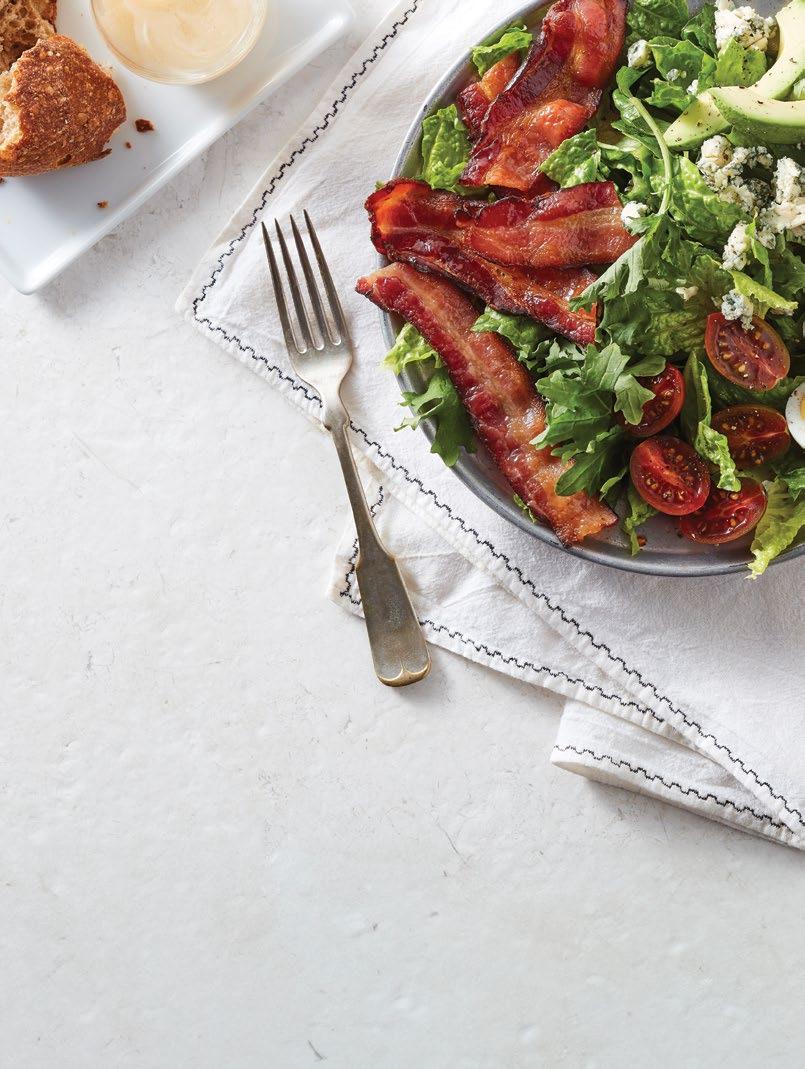





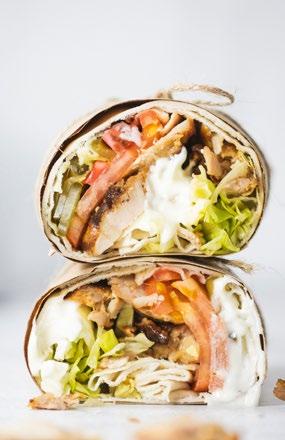
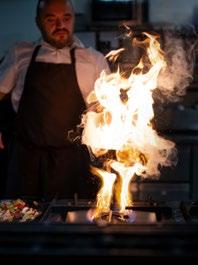
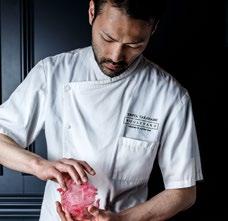
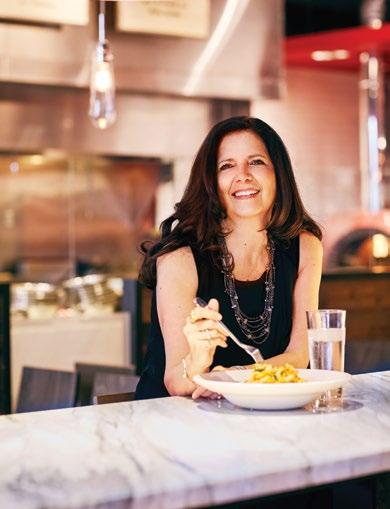
The pandemic has changed the way we do business but also how we live our lives. Now, a new study by GlobalData, a leading data and analytics company based in London, England, is showing that a new type of consumer has emerged. This new persona is being referred to as the “hermit consumer,” and they’re characterized by the desire to go out less often — a new reality which has consequences for the foodservice industry.
It’s not an unexpected phenomenon given the harrowing realities of the past four years, which have since been exacerbated by rising inflation, supply-chain issues and geopolitical tensions.
The survey reveals that foodservice channels are not on the path to “recovery” in the way many expected during the early days of the pandemic. According to the research company, “The global foodservice industry has not returned to any kind of prepandemic normalcy during 2023. Value sales have increased just three per cent since 2019, with overall transactions down three per cent over the same period. Revenue from dine-in sales is down 12 per cent compared to 2019 while, notably revenue from takeaway is up 46 per cent.”
“The idea of a post-pandemic recovery for the foodservice
industry assumes that 2020-’21 was a blip — an exogenous, once-in-a-lifetime event which would halt progress for a year or two before normal trends and consumer behaviour resumed,” says Fred Diamond, senior food consultant, Consumer Custom Solutions, at GlobalData. “However, during that period something changed. We have changed. People are still spending, and still consuming, but in a radically different way.”
Results of the survey, undertaken in Q4 2023, indicate that 46 per cent of consumers say they will be eating out less frequently over the next three months, and a further 11 per cent say they will stop altogether. As Diamond explains, “… In 2020-’21, people stayed in more because of the Coronavirus. In 2022-’23 people, stayed in more because of price rises. This is four years of behavioural change on a global scale. The idea things could snap back to the way people saw the future from the vantage point of 2019 has to be abandoned, and the new landscape embraced.”
He explains this is a combination of both a mass exodus from one channel to another and a general loss of interest in the sector, due in part to the rise of the “hermit economy.”
So, what can operators do about this shift? As always, innovation is the most important ingredient to success. “Appealing to concepts such as authenticity and heritage can resonate strongly with consumers. Consumers all over the world are becoming skeptical of products that appear mass-produced or otherwise unoriginal.” Operators, he says, need to also become more entrenched in their community — both through sourcing ingredients locally, and by reflecting local culture in the food served. In fact, 75 per cent of global consumers say that authenticity is “essential” or “nice to have” when deciding which product to purchase, according to GlobalData’s survey.
And, if your operation doesn’t have a takeout-and-delivery option, what are you waiting for? FH
ROSANNA CAIRA rcaira@kostuchmedia.com
@foodservicemag
facebook.com/foodservicehospitalitymagazine
instagram.com/rosannacaira
EDITOR & PUBLISHER ROSANNA CAIRA
MANAGING EDITOR AMY BOSTOCK
ASSOCIATE EDITOR NICOLE DI TOMASSO
ART DIRECTOR COURTNEY JENKINS
PRODUCTION MANAGER JENNIFER O’NEILL
SOCIAL MEDIA MANAGER JANINE MARAL
WEBSITE MANAGER TYLER BECKSTEAD
EVENTS MARKETING MANAGER JHANELLE PORTER
DIRECTOR OF BUSINESS DEVELOPMENT
WENDY GILCHRIST
ACCOUNT MANAGER DANNA SMITH
SALES & MARKETING ASSISTANT ZACK RUSSELL
SENIOR ACCOUNTANT DANIELA PRICOIU
CIRCULATION PUBLICATION PARTNERS
ADVISORY BOARD
ASCARI HOSPITALITY GROUP JOHN SINOPOLI
BROWNS RESTAURANT GROUP BRUCE FOX
BELLHOUSE HOSPITALITY INC. SCOTT BELLHOUSE
CHARCUT RESTAURANT CONNIE DESOUSA, JOHN JACKSON
GARLAND CANADA MARY CHIAROT
LACTALIS CANADA IVEN ZANARDO
MAPLE LEAF SPORTS & ENTERTAINMENT DAN MORROW
MTY GROUP MARIE-LINE BEAUCHAMP
CHEF NED BELL
SOTOS LLP ALLAN DICK
THE HOUSE OF COMMONS JUDSON SIMPSON
UNIVERSITY OF GUELPH, SCHOOL OF HOSPITALITY & TOURISM MANAGEMENT BRUCE MCADAMS
To subscribe to F&H, visit foodserviceandhospitality.com
Published eight times per year by
Woodbridge ON L4L 9A8 Tel: (416) 447-0888, Fax (416) 447-5333, website: foodserviceandhospitality.com.
The reproduction of this magazine, in whole or in part, is expressly prohibited without the permission of the publisher.
Copyright

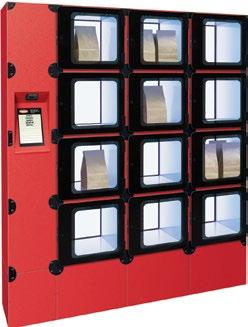

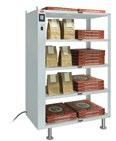




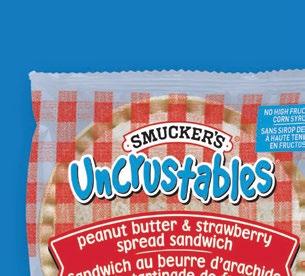
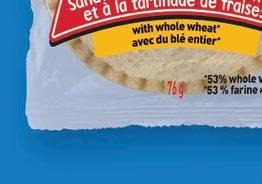





















The ever-evolving landscape of Canadian immigration policies has left a palpable impact on a foodserviceand-hospitality industry that’s still grappling with severe labour shortages. The industry faces another potential blow with the Federal government’s decision to double the required proof of funds for international students. On the other hand, the government has extended the 20-hour per week work limit for students until Apr.30, 2024. The time-bound extension has sparked discussions about the broader implications of the mandate on the sector.
“Moving the hours of work for international students to 40
hours per week has helped many businesses maintain operations and helped students’ income,” says Tony Elenis, president & CEO, Ontario Restaurant Hotel Motel Association (ORHMA).
“It’s critical that the April 2024 extension becomes permanent and not reduced back to the 20-hour week rule. The number of hours to work should be kept optional. There are students who need more time to study. Many students need extra income to be able to meet affordability challenges.”
International students often rely on part-time jobs to cover not only tuition expenses but also the increasing cost of living. The current requirement states
that prospective students must show a minimum of $10,000 in their bank accounts to supplement living expenses. However, in 2024 this amount will be raised to $20,635, in addition to the tuition paid by international students. This considerable hike will have a drastic impact on students’ financial stability, and the extended work limit can offer some relief for students who rely on part-time work to support themselves.
“Increasing the student fees will decrease the [number] of students coming to Canada and will impact hospitality businesses two ways: less students enrolling in hospitality schools, which means less students entering the industry, and less students attending classes, which leads to less [students] working hospitality jobs,” says Elenis.
However, the temporary extension on the weekly work limit has been a sigh of relief for many students and the foodservice-andhospitality industry as it depends heavily on international students as a reliable workforce.
“As students, we try to keep up with financial responsibilities such as tuition fees, rent and grocery, but a 20-hour work week makes it difficult for us to meet basic needs,” says Lewanna Fernandes, student at Humber College. “I significantly benefited from the 40-hour work limit. It gave me a sense of independence to be able to finance my stay in Canada and fend for myself in many ways.”
“We see the extension of the waiver on the 20-hour work week
limit on off-campus work for international students positively,” says Maximilien Roy, VP Federal & Quebec, Restaurants Canada. “This will help international students’ increase their income and their overall financial situations while helping the foodservice industry, which is negatively impacted by labour shortages. We’re encouraged by Minister Marc Miller’s openness to lifting the 20-hour threshold permanently and will continue to advocate for positive measures for the foodservice industry.”
Foodservice is the fourthlargest private-sector employer in Canada with one in five Canadians between the ages of 15 and 24 currently employed in restaurants, according to Restaurants Canada. The increased financial requirement poses a challenge but presents an opportunity for the industry to re-evaluate its strategies, provide flexible work hours and financial support programs to attract and retain international student employees.
“The foodservice industry has the highest number of job vacancies in the private-sector. With [more than] 97,000 job vacancies currently, it represents one out of every six private-sector job vacancies in Canada,” says Roy. “As one of the country’s largest employment sectors, it’s imperative that labour market and workforce strategies prioritize the needs of small business, familyowned and national franchise establishments across Canada.” FH

Starbucks has introduced Oleato, coffee infused with Partanna cold pressed extravirgin olive oil, at its stores across Canada.
For the launch, Starbucks has introduced two new Oleato beverages. The Oleato Golden Foam Iced Shaken Espresso with Toffeenut features Starbucks Blonde espresso combined with notes of warm toffeenut and creamy oat beverage, topped with lush vanilla sweet cream that’s infused with Partanna extravirgin olive oil. The Oleato Oat Latte is also made with Starbucks Blonde espresso infused with Partanna extra-virgin olive oil and steamed with creamy oat beverage.
Additionally, any Starbucks iced beverage can now also be customized with Oleato Golden Foam. Recommended customizations are available in the Starbucks app, including an Iced Chai Tea Latte with Oleato Golden Foam and a Dragon Drink Starbucks Refresher with Oleato Golden Foam.
Partanna created a highly curated blend of olive oil from the finest Mediterranean olives, including the Nocellara del Belice (also called Castelvetrano) olives from Partanna, Sicily.
Starbucks first debuted Oleato in Italy in February 2023. The drinks are also available in the U.S., Japan, U.K. and France.
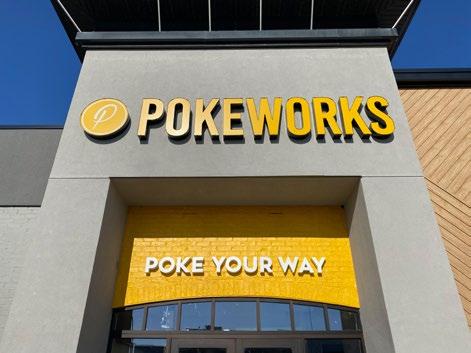
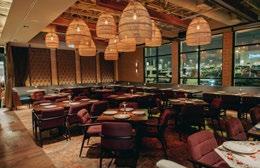
Mishree Cocktails & Cuisine has recently opened its doors in Mississauga, Ont. The restaurant seats 250 and has multiple private party options for both small and large gatherings.
Guests can indulge in more than 100 dishes with the best in South Asian and Middle-Eastern delights, including crowd favourites such as Avocado & Green Apple Gol Gappe, Lamb Chops, Chili Garlic Chicken Momos and Paneer Tikka Masala, alongside innovative dishes that are unique to Mishree, including Meat Beliram, Meen Moilee and Kukut ki Barfi.
With 30 cocktails and zero-proof cocktails offered, Mishree’s mixology is inspired by the beauty of nature and crafted into an immersive experience. Menu favourites include The King & Marry, Mishree G&T and Winter Sage.
Pokeworks plans to accelerate its growth in 2024 across North America. The brand opened a total of nine new locations in 2023, including the first Pokeworks in Canada. The year was full of menu innovations and limited-time specials, including the exclusive Luxe Lobster bowl. Pokeworks was the first poke chain to introduce lobster to the menu. The brand also tested out plant-based, raw sushi-grade tuna, made from a combination of soy protein and seaweed with an umami taste.
Looking ahead, Pokeworks plans to start with an additional 12 locations. The company has new franchisees signed for southern California, and there are new restaurants coming to New York and the Toronto area, with possible locations in the pipeline for Houston, Atlanta, Michigan and more. This expansion will increase the brand’s total to more than 85 restaurants by the year’s end, and within the next 30 to 36 months, the brand expects to have more than 120 locations.
In the Pokeworks executive suite, original co-founders Mike Chen, Peter Yang, Mike Wu and Kasper Hsu will be returning to an active, everyday role in the company’s operations moving forward.




You can count on MEIKO to have the big picture in mind: Healthy people and a healthy planet.
From its founding in Germany more than 95 years ago, MEIKO has become an industry-leading global brand with warewashing and food waste treatment equipment in commercial kitchens around the globe.
We remain focused on providing both hygienic and sustainable cleaning solutions, and our two newest products are proof of just that. Meet MEIKO’s Bottle Washing System and BioMaster® 4 Plus: your solution to meeting sustainability and reusability demands. These small but mighty machines were specially developed to tackle the single-use plastic and food waste challenges facing our world today. Take the professional path to a greener, cleaner future: Choose MEIKO.












Chef Keith Pears has opened Glass Kitchen in Markham, Ont., offering an inventive approach to Asian-infused brunch and dinner menus, which include diverse flavours to innovative fusions, drawing inspiration from his family’s cultural traditions.
‘Glass Kitchen’ represents green glass, otherwise known as Jade, which holds a special meaning as it pays tribute to Pear’s beloved grandmother, Jade. Her love and passion for cooking inspired him throughout his culinary journey, and her memory continues to guide him in creating his dishes. Each creation at Glass Kitchen is a blend of tradition, innovation and heartfelt memories that chef Pears has infused into his cooking.
“The space we’ve created at Glass Kitchen is fuelled by my passion and unwavering love for food that truly knows no boundaries,” says Pears. “Whether
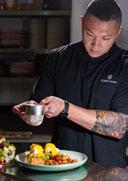
you’re joining us for brunch or dinner, we hope you have a memorable culinary experience and feel the purpose behind every dish.”
Growing up in Vancouver, Pears discovered his passion for cooking at a very young age. His grandma owned a Chinese-Western cafe where he would soak in the love, flavours, and traditions that made their food so special.
Throughout his career, he has climbed the ranks at various prestigious restaurants such as Teahouse in Stanley Park, Delta Hotels by Marriott and Toronto’s W Hotel. Along the way, he gained recognition and acclaim in various food competitions, such as Best of the West, Chopped Canada and most recently, winning the National Selection for Bocuse d’Or. Pears will be representing Canada in the 2025 B’ocuse d’Or Finals in Lyon.
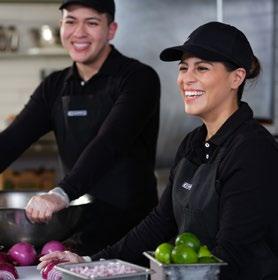

Baskin-Robbins has plans to open 10 locations in the Ottawa region over the next five years. The company has had a presence in Ottawa since 1980, and currently has eight locations. The brand will expand in partnership with franchisees Ronnie Liu and Lina Qu. Independently and in tandem, the duo operates a total of five franchises and will add these 10 to their portfolio.
The new locations, which can range from 1,000 sq. ft. to 1,200 sq. ft., reflect the brand’s popular Moments design featuring bright colours, new dipping cabinets, mixed seating options and crisp, simplified digitalmenu boards.
Chipotle Mexican Grill is providing additional financial wellness and mental well-being support for more than 110,000 employees through a new Employee Assistance Program and enhanced benefits. The company is hiring additional employees to prepare for its busiest period of the year from March to May.
Chipotle’s new benefits will enable eligible employees to pay off student debt while saving for retirement using SoFi’s Student Loan Verification (SLV) Service; build credit through high-tech banking from Cred.ai; manage financial wellness through the SoFi at Work Dashboard; and access mental-health resources through CuraLinc Healthcare.
More than 73 per cent of Chipotle’s restaurant employees are Gen Z, and these new benefits cater to the challenges they’re facing.
Additionally, crew members can advance to a restaurateur in as little as three-and-ahalf years, with a total potential compensation package of approximately $100,000. Nearly 90 per cent of current restaurant leadership started as crew members and progressed to management positions. In 2023, Chipotle promoted more than 26,000 employees.
Toward the end of 2023, we saw the wave of incremental restaurant traffic slow to a trickle, and traffic growth stabilize in the low single-digit range. That means restaurant operators will need to work even harder in 2024 to entice customers to visit and spend their money amid continued economic challenges. Menu innovation is a longstanding tradition in the restaurant industry. After slowing during the pandemic, innovation pipelines have re-opened in the past year. Limited-time offers, or LTOs, are a key component of any innovation strategy. They create buzz and build variety for customers, which could be a boon to marketers in the year ahead.
A recent report from Circana foodservice colleagues in the U.S., The Evolving Role of LTOs, revealed the impact of 30 LTOs across a wide variety of QSR operators and channels. The overwhelming conclusion was that LTOs can drive new visits among existing clients and attract new customers to a brand. In fact, 91 per cent of consumers report they’re likely to choose one restaurant chain over another if they offer LTOs or new items. These offers can also be an effective marketing tool for targeting specific demographic groups and influencing consumer behaviours, such as app usage or encouraging new occasions. The report also shows LTOs can help drive average eater check, even when they are paired with a price promotion.
These findings are consistent with Circana Canada’s CREST foodservice industry tracking data for the 12 months ending November 2023. Approximately one-third of QSR consumers choose their destination because they seek variety or something new, or to satisfy a craving — and they tend to spend above the average on these occasions. These traits are more prevalent among younger cohorts eager to expand their palates, while older cohorts may be more set in their ways.
When applied specifically to the QSR burger and chicken-sandwich menu categories, this search for newness and innovation represented more than half of all the servings growth in these two menu categories last year. Looking closer at the chicken-sandwich craze, the pervasiveness of the hot/spicy chicken sandwich trend in recent years connects directly to the younger cohorts every marketer is chasing. Typically offered as LTOs by the top chicken-sandwich operators, these represent 15 per cent of all chicken-sandwich servings. Interestingly, individual operator shares shift continuously as LTOs come and go, and as LTO-hungry consumers search for the next hot entrant in this craze.
Here are several ways you can refine your LTO strategy: Simplicity: Innovation doesn’t necessarily mean revolutionary. The addition of a new sauce or topping to an existing menu item can create a unique menu experience that customers will be eager to try. The


restaurant supply chain will be happy to provide options for any restaurateur who needs some inspiration — and a new SKU.
Nostalgia: This can be a powerful ingredient of LTO success to target older consumers by resurrecting previously discontinued menu items. It could also create buzz among younger consumers, who may have FOMO (fear of missing out) surrounding the returning “classic” items.
Beyond the main: New offerings on the beverage, side dish and dessert menus can be equally effective at achieving LTO goals. This is especially true when it comes to driving check size through increased order size.
Seasonality: Did you know that pumpkin-spice coffee beverages were up more than 50 per cent in the past year alone? Enough said.
The report concludes that strong LTOs have a positive impact on brand perception and customer behaviour, even after the LTO is over. And LTO buyers are more likely to be retained by the chain after the offer period ends — LTOs help lift purchase frequency in the months after the offer period. A strong LTO strategy can help operators retain and grow their customer base in this slow-growth market. FH


Franchisors and parent companies supplying goods for sale in Canada should begin to evaluate and address the ethical standards of their supply chains. New legislation that came into force on Jan. 1, 2004, Bill S-211, An Act to enact the Fighting Against Forced Labour and Child Labour in Supply Chains Act, which also amends the Customs Tariff (the “Act”) will impose annual reporting obligations on Canadian businesses and their foreign parent companies to prove they’re preventing and reducing the risk of forced or child labour from being used at any step in their supply chain.
This legislation applies to both private entities and government institutions. Those subject to its provisions will be obligated to provide annual reports to the Minister of Public Safety and Emergency Preparedness, due on May 31 each year, commencing in 2024. Of particular note, Section 11(3) specifies the mandatory contents of these reports:
• The entity’s structure, activities and supply chains;
• Its policies and due-diligence processes in relation to forced and child labour;
• The parts of its business and supply chains that carry a risk of forced or child labour being used and the steps it has taken to assess and manage that risk;
• Any measures taken to re-mediate any forced or child labour;
• Any measures taken to re-mediate the loss of income to the most vulnerable families that results from its measures taken to eliminate the use of forced or child labour;
• The training provided to employees on forced and child labour;
• How the entity assesses its effectiveness in ensuring that forced and child labour are not being used in its business and supply chains.
Many franchisors oblige their Canadian franchisees to source products from the franchisor or designated suppliers. Similarly, most parent companies directly supply their Canadian subsidiary retailers with the goods they are to sell. As a result, such franchisors and parent companies that meet the threshold of $40 million in revenue, $20 million in assets or the employment of an average of 250 employees, are required to ensure that their supply chain has not violated the Act by employing prohibited persons. In light of the Act's enforcement, these processes may require significant re-structuring, impacting not only Canadian incorporated companies but also entities exercising control over Canadian companies. Here’s how the Act will affect franchise systems and retail chains that operate in Canada:
• Compliance Burden. Companies deemed to control Canadian entities will be captured by the Act. There is no question that a parent-subsidiary relationship will be captured by this and for the purposes of the Act, franchisors that have mandatory supplier requirements in their franchise agreements will also likely be captured. Parent companies and franchisors both must ensure compliance
prior to the first report in May 2024. The Act allows any controlling entity to submit a joint report with the Canadian company.
• Brand Reputation. The public reporting requirement will result in the public learning about a business system’s supply chain, which parent companies and franchisors consider proprietary and confidential. It’ll be important to keep this in mind when drafting the reports, to retain as much control over the franchise system’s brand perception as possible.
• Competitive Advantage. Many systems will find it’s difficult to comply with the Act without drastically changing their product or the price at which the product is sold. Striking a balance between offering ethically sourced products, while maintaining the product’s current price and quality will be attractive to consumers, and will be a new factor that sets brands apart.
• Global Alignment. Franchise systems and retail chains that currently operate in countries where similar legislation is already in place, as described in the following section, will find they can adapt the Canadian arm of their business to align with those strategies. This will result in a more globally uniform strategy.
At the forefront, the Act is part of a broader global trend where countries are implementing legislation to combat modern slavery, human trafficking, and unethical labour practices in their supply chains.
In doing so, Canada is joining the United Kingdom (UK), Australia, and the European Union (EU), which have already enacted or proposed similar measures. Franchise systems operating in any of these regions should already have processes in place that allow for compliance with ethical sourcing standards.
In 2015, the UK also enacted legislation entitled the UK Modern Slavery Act, to combat modern slavery in supply chains. The legislation was accompanied by a Guide entitled Transparency in Supply Chains: a practical guide. Given the absence of regulations at this time as to how the Act will apply to corporations doing business in Canada, the UK guide can provide valuable insight. Its appendices include examples on how to structure the reports, what should be included in the reports and the changes that should be made to internal operations to ensure due diligence.
The new Canadian legislation will broaden the scope of some existing regulations implemented in Europe. The Act introduces a stricter applicability threshold than legislation enacted in certain European countries, as it applies to companies doing business in Canada. This heightened criterion should warrant particular attention from smaller enterprises based in countries such as France and Germany.
As of January 2024, the German legislation exclusively pertains to companies with a workforce exceeding 1,000 employees in Germany. Similarly, the French legislation extends its reach to companies with more than 5,000 employees in France or 10,000 employees globally. For French and German companies falling below these employee thresholds but maintaining a presence in Canada, a comprehensive assessment of their supply chains is imperative.
In addition to the Canadian Act, the EU has proposed a regulation with the potential to impose the same applicability threshold of 250 employees, entitled Regulation of the European Parliament and of the Council on prohibiting products made with forced labour on the Union market. In October 2023, a joint report on the proposed regulation between the Committee on the Internal Market and Consumer Protection (IMCO) and the Committee on the International Trade (INTA) was confirmed in the
European Parliament as their position in the November trilogue negotiations. If adopted, the regulation will halt all import and export of goods manufactured through forced labour at the EU’s borders. The regulation is currently awaiting the Parliament’s position in the first reading and may not be in force for a few years, but given their stringent similarities, adaptation to the Canadian Act can result in advanced preparedness.
Business systems have a range of strategic measures to choose from to proactively prepare for the impending reporting obligations, which are set to become due in May 2024. These actions will empower them to navigate the regulatory landscape effectively:
• Supply Chain Review. Conduct a review of all supply chains and invest in due-diligence procedures. This entails extending the scrutiny beyond immediate suppliers, delving deeper into the supply-chain hierarchy to address potential issues. It’ll be important to be able to prove these steps have been taken through documentation.
• Collaboration with Stakeholders. Where appropriate, work with a local non-governmental organization or any other relevant stakeholder to establish effective strategies for addressing and rectifying any instances of forced labour. Genuine efforts to eradicate human rights violations within the supply chain will not only enhance ethical compliance but also demonstrate a commitment to responsible business practices.
• Supplier Contract Termination. Where it’s not possible to directly address a human rights violation, explore how to terminate the supplier contract as soon as possible.
• Integration of Ethical Business Practices. Consider integrating ethical business operations into the brand’s image sooner than later. This proactive approach aligns the brand with evolving consumer preferences and demonstrates a commitment to responsible and sustainable operations.
• Franchise Agreement Review. Conduct a review of franchise agreements with Canadian franchisees to adjust any supplier provisions accordingly. Limiting the level of control over Canadian franchisee’s supply chain may assist in alleviating liability, should compliance become an issue.
• Use Existing Resources. It’s important to note that tools currently exist to help socially-conscious consumers make informed purchasing-decisions. As an example, KnowTheChain.com offers benchmarks and assessments evaluating and scoring companies on their efforts to address and combat forced labour. By following the structure of these reports, your company may gain a better understanding as to what forced and child labour look like in today’s world.
• Starting Early. By taking action on the above in advance of enactment, issues can be addressed earlier and more notice can be provided to third parties, if need be. This will also allow for further research to be conducted on entering agreements with suppliers who comply with the Act.
Bill S-211 represents a significant step towards greater transparency and ethical sourcing within supply chains in Canada. While it imposes new obligations on companies selling imported goods, it also offers the opportunity for businesses to demonstrate their commitment to socially responsible business practices. However, the consequences of non-compliance are alarming, not only from a legal standpoint, but also in terms of business impact.
For large franchisors with foreign suppliers, especially from high-risk countries well known for using child labour, the legislation will require significant overhaul of their specific supply chains in order to ensure compliance and that the franchisor has robust policies to demonstrate as such. Maintaining transparency within franchisorfranchisee relationships will also be crucial, as franchisees will now have an additional business obligation starting in May 2024. FH


The RC Show returns to Toronto’s Enercare Centre at Exhibition Place April 8 to 10. The annual tradeshow is the ultimate gathering place for the food-and-beverage industry to come together to learn, grow and network.
This year’s theme, ‘Level Up,’ aims to support the industry, discover new ways to push the boundaries of what’s possible, and embrace innovation in unique ways. From how to discover new flavours, re-imagine classics, and surpass diner’s experiences, LEVEL UP is all about helping industry professionals take their craft and business to the next level.
“Whether you’re aiming to start or expand your business, foster a winning team, boost efficiency, or enhance overall quality of service, you can learn how to LEVEL UP at RC Show 2024,” says Kelly Higginson, president & CEO of Restaurants Canada. “This year we’ll be celebrating innovation, excellence, and the dynamic and deep-rooted essence of the Canadian hospitality sector. Our emphasis is on empowering attendees to elevate their skills in this constantly evolving industry, challenging conventional limits, investing in people, fuelling their success, increasing line profitability, and wholeheartedly embracing the spirit of innovation.”
And speaking of innovation, the editorial team at F&H has once again chosen a few hot products not to be missed on this year’s tradeshow floor.

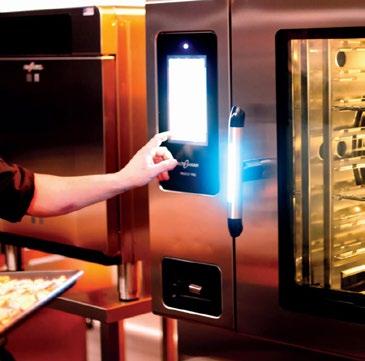
The BioMaster waste-treatment system by MEIKO eliminates manual tote handling, optimizes hygiene and ergonomics in the kitchen operation, and lowers food waste management costs. It’s intuitive, straightforward and easy to use, and that means recycling food waste into renewable energy is easier than ever.
Visit MEIKO GREEN in booth 2027 to see the BioMaster in action.
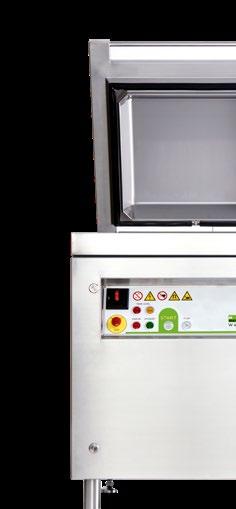
Alto-Shaam will showcase its latest ventless innovation in the combinationoven category, Prodigi, equipped with a Ventech condensation hood. Ventech hoods on Prodigi combi ovens maximize floor space and improve efficiency and workflow, with no hood required. This eliminates the significant costs associated with the installation and maintenance of traditional hoods. Powered by innovative condensation technology, Ventech hoods condense steam while capturing and removing grease-laden air, vapors and lingering smoke.
Check it out at booth 2619

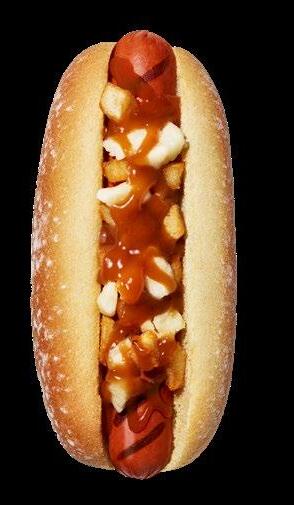
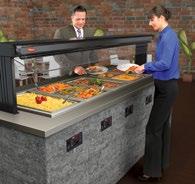
Hatco Corporation’s Drop-In Induction Dry Well utilizes induction technology to keep hot foods at optimum temperatures and maintain their made-fresh quality. The well has many beneficial features, including two heat zones, two temperature sensors per zone and precise temperature controls. Plus, it is designed for use with stainless steel food pans, so there is no need for specialized induction pans. This well is the ideal choice for any foodservice operation’s hot food well needs.
Visit them at booth 2341 to learn more.
Enjoy a ballpark favourite this summer with Schneiders Stadium Hot Dogs. These hot dogs can pair perfectly with classic condiments or your very own culinary creation. Since 1890, Schneiders has established a rich heritage of original and authentic recipes, using premium ingredients and taking all the time needed to honour the origin and inspiration of each recipe.
Drop by the Schneiders Porch in the Food Truck Experience.
TORONTO BLUE JAYS and all related marks and designs are trademarks and/or copyright of Rogers Blue Jays Baseball Partnership (“RBJBP”) © 2024 RBJBP

Crafted to look and taste as if it’s made from scratch, HORMEL® BACON 1™ Brand allows operators to serve a rich, thick, fully cooked bacon. Its robust, smoky taste is made by smoking over real hardwoods, and a proprietary cook process creates a mouthfeel indistinguishable from bacon cooked from raw.
This favourite of Chef D (of ‘At Home with Chef D’) is available to sample at RC Show booth 3013


























Canada has established as one of the most multicultural countries in the world. as no surprise, therefore, foodservice scene reflects same global flavours, influences. Three of popular cuisines at — Mexican, Lebanese — offer guests an exciting exotic blend of spices, colours, flavours and experiences.

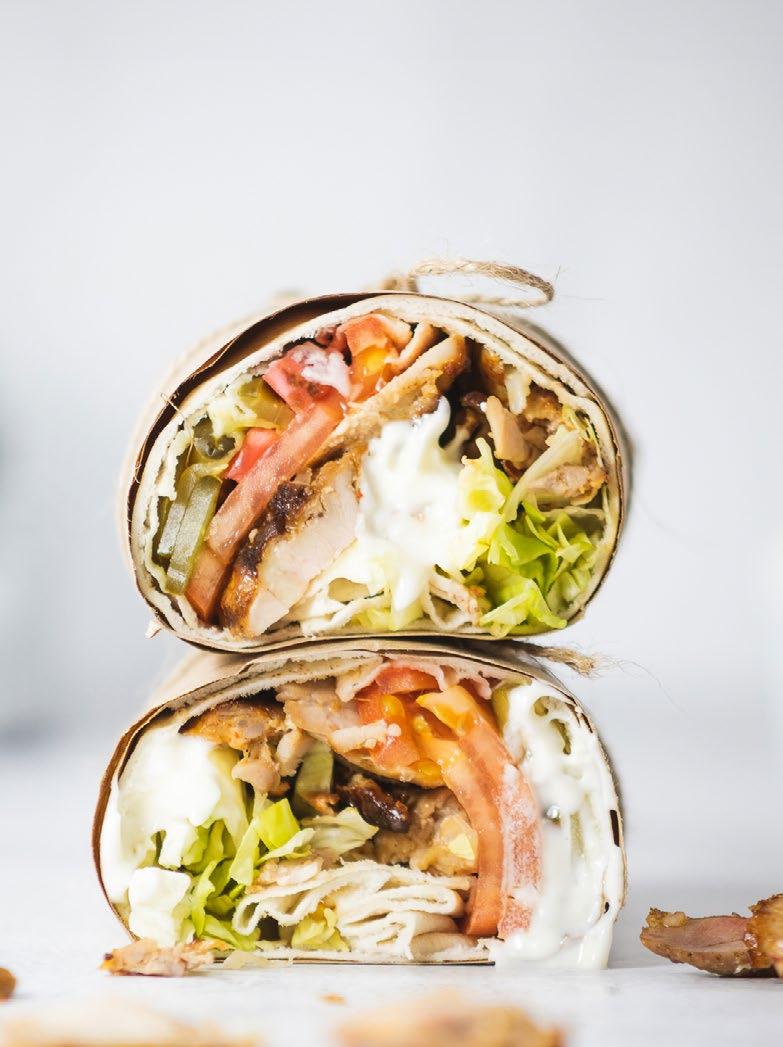
cuisines
established itself multicultural world. It comes therefore, that our reflects these flavours, menus and of the most the moment
Lebanese and Korean exciting and spices, and


Mexican flavours over the last year include customizable options such as fish/ shellfish bowls (up 13 per cent), chicken bowls (up seven per cent) and veggie bowls (up six per cent),” states Katie Belflower, associate editor at Technomic, adding, “another trend we’re seeing is the rise of breakfast bowls (up 22 per cent) paired with Mexican flavours.”
The data also shows that some of the fastest-growing Mexican ingredients include birria (up 32 per cent), cilantro lime aioli (up 30 per cent) and avocado crema (up 28 per cent).
Much of the growth in Mexican cuisine is driven by quick-service restaurants (QSRs), which grew 14 per cent in 2023. One chain seeing continued strong growth is Taco Time (owned by MTY Group). Started in 1978 in Lethbridge Alta., it has grown to 130 locations, mainly in Western Canada. “We plan to expand 12 to 14 locations a year with 80 per cent of this growth coming from within the brand,” states Wendy Derzai, VP Taco Time & Extreme Pita Canada. She adds, “Our preference is streetfront locations with strong delivery and drive-through opportunities.”
Mexican cuisine outpaced that of Canadian restaurant growth in
in the both the number of outlets and the number of non-Mexican restaurants
Ignite menu data,

“Some of the fastestgrowing dishes with
Taco Time takes a unique approach to its business as all key menu items are freshly made, in-house. This includes its three signature hot sauces, salad bowls, empanadas and guacamole (made from fresh avocados).
While many QSRs and familystyle restaurants offer exceptional Mexican cuisine, independent restaurateurs continue to lead innovation as many offer a more authentic and upscale dining experience. Quetzal, a 60-seat Michelin Star restaurant in downtown Toronto, has been honouring Mexican cuisine and its traditions since 2019. Steven Molnar, executive chef and co-owner says, “I strive to change the general perception surrounding Mexican cuisine by showcasing authentic flavour combinations and seasonal
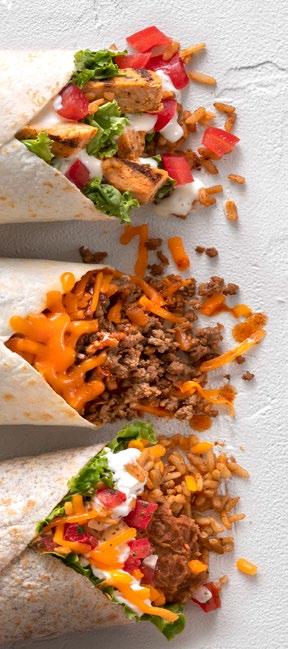
products. All our menu items are cooked over a 28-foot wood-burning oven which creates a very unique dining and menu experience.”
Questzel offers both curated and à la carte menus. “Our curated menu (from $120) is based on our à la carte menu and customized to each guest’s preferences. Over 80 per cent of our guest choose this six to eightcourse option. While our menu offers authentic Mexican cuisine, we also utilize local and in-season ingredients, including our very popular Newfoundland Scallops ($39) with green garlic butter, popcorn and tajin.”
Lebanese cuisine is much more than

just shawarmas and falafels. “Revenues from shawarmas — the traditional Lebanese sandwich are up 20 per cent in 2023,” explains Sgabellone. “Both independents and small chains are flourishing in these segments.”
According to Technomic data, dishes with Lebanese flavours showing growth over the past year include veggie bowls (13 per cent increase) and chicken sandwiches (up 15 per cent).”
Amal, a fine-dining Michelin Star restaurant located in the Yorkville area of Toronto offers authentic Lebanese cuisine prepared and presented in an approachable and modern style. Created by
“Lebanese food is very beautiful and colourful. Authenticity, freshness and presentation play a key role in everything we do. An example is our very popular Fattoush salad ($21), which features fresh green, white and red micro herbs and vegetables topped with purple Sumac vinaigrette,” explains executive chef Rony Ghaleb
“Almost all our items are shareable as our food creates a bond with our guests and their family and friends. Most guests start with a shared selection Mezze (small dishes).
Amal’s hummus with pomegranate and roasted pine nuts, ($14) and roasted cauliflower with green tahini, Hawaii spice and feta are two of our most popular,” says general manager Johnny Abou-Jaoude.
The QSR and fast-casual markets have also embraced Lebanese cuisine. Mezza Lebanese Kitchen is one of the largest and fastest- growing Lebanese restaurant chains in Canada. Started

“Za’atar is a savory Lebanese-style mix of sesame, oregano and sumac used in many foods to elevate and enhance the flavour,” explains executive chef Rony Ghaleb of Amal Restaurant.

“I also love to use tahini (sesame seeds, Lebanese olive oil, salt) and lots of lemon and garlic in my menus. We are a coastal nation so celebrate ingredients we find focally.”

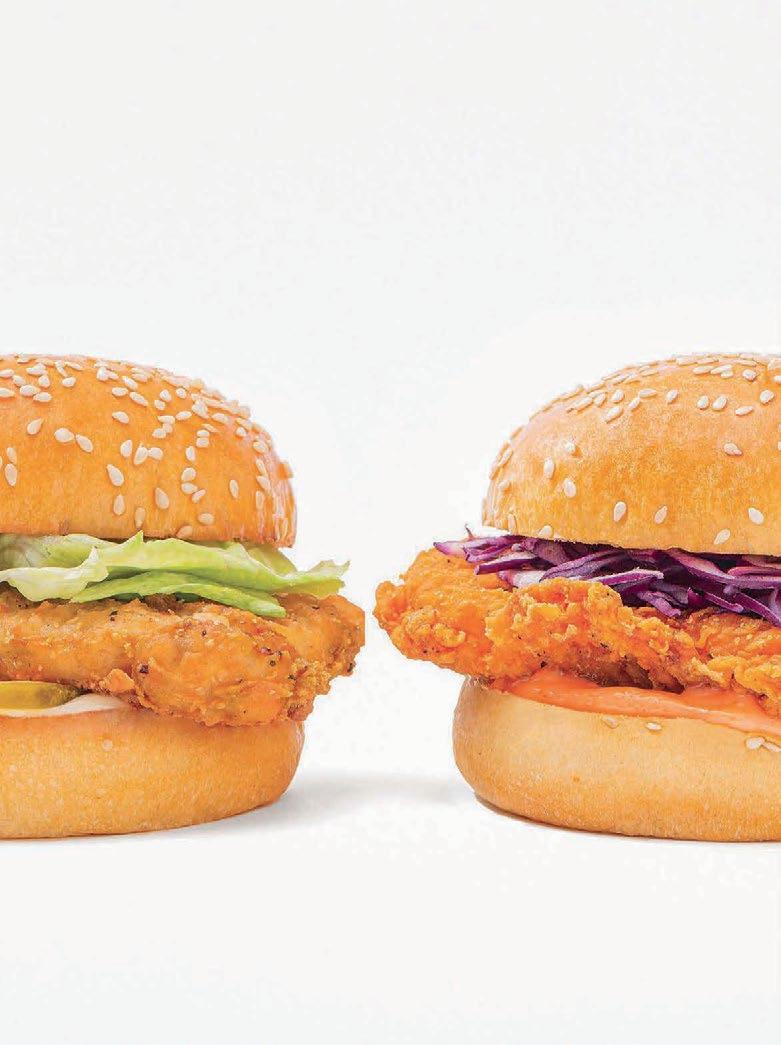


Mezza targets the flavour-curious Canadian who is looking for a quick, fresh, healthy and delicious lunch or supper. “Mezza prepares all its sauces and meats using authentic, proprietary spices, sauces and blends that are generations old; a unique differentiator,” explains Peter Nahas, VP of Business Development and Franchising.
The most popular menu items include Chicken Shawarma Plate ($14.99 to $18.99), wraps ($9.29 to $13.69) and the Sriracha Chicken Protein Bowl ($9.99 to $15.99).
“Every plate includes pita bread to ensure authenticity to Lebanese culture and cuisine,” adds Naha
Distinct from the many popular Asian cuisines, Korean food features unique spices, marinades and ingredients.
Koryo Korean Barbeque was established in 1998 in Calgary, Alta and features authentic Korean-style barbecue, bibimbap, Udon soups and Korean sandwiches. There are
One of Korean cuisine’s most important ingredients is gochujang paste, which is used in kimchi, spicy stews, soups and Korean side dishes such as Korean cucumber salad. At Koryo Korean Barbeque, the chain’s Bulgoli Beef ($16.29) is marinated in the vibrant red Gochujang sauce, which has a mild to moderate spicy taste with a hint of sweetness.

currently nine locations with plans to expand to Ontario, Quebec and Western Canada.
While its initial focus was mall locations, the brand is now exploring opening its first street-front location. “There is tremendous opportunity to grow Korean cuisine in Canada. All our products are cooked to order and barbecue combinations include choice of two to four sides,” says Jeff Roop, senior directior of
Masa is a corn dough made from whole heirloom corn from small farmers in Mexico. “It forms the basis of our most popular entrees and tacos and is made daily by Quetzal’s chefs,” explains Steven Molnar, executive chef and co-owner.
The three-step process to make Masa includes the ancient nixtamalization technique that softens the corn and boosts its nutritional value. It is then rinsed and ground using a volcanic stone grinder.
Operations, MTY Group, the parent company of Koryo, adding, popular sides include kimchi-fermented cabbage, sweet potato glass noodles and garlic-glazed potatoes.
“Korean dishes growing over the last year include beef bowls (up five per cent) and pork dishes (up eight per cent). Some of the fastest-growing ingredients include zucchini (up 38 per cent ) — often appearing in bibimbap — and pork belly (up 20 per cent),” says Belflower.
Introducing a new global cuisine to customers who are not familiar with its flavours, or even menu names, can be challenging. Training your frontof-house staff to understand and embrace each dish and communicate and engage with customers is key to its success.
Amal’s GM and executive
chef, both of Lebanese descent, intricately understand the cuisine’s unique culture “However, our staff are not Lebanese, so we put all through a very strict seven-to-10-day training regime so they are able to share the Lebanese culture and cuisine with our guests. All staff also do complete tastings so they understand each menu items’ unique flavours,” says Abou-Jaoude.
Quetzal’s Molnar agrees. “Our Mexican woodburning oven dining experience is very unique for our staff and guests. We divide our kitchen into four main stations and move our teams through each starting with cold preparation. The wood-burning oven requires on-going care to produce
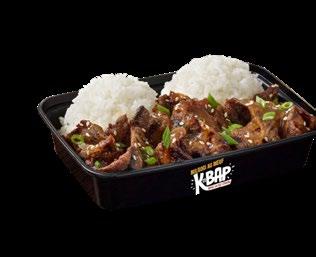


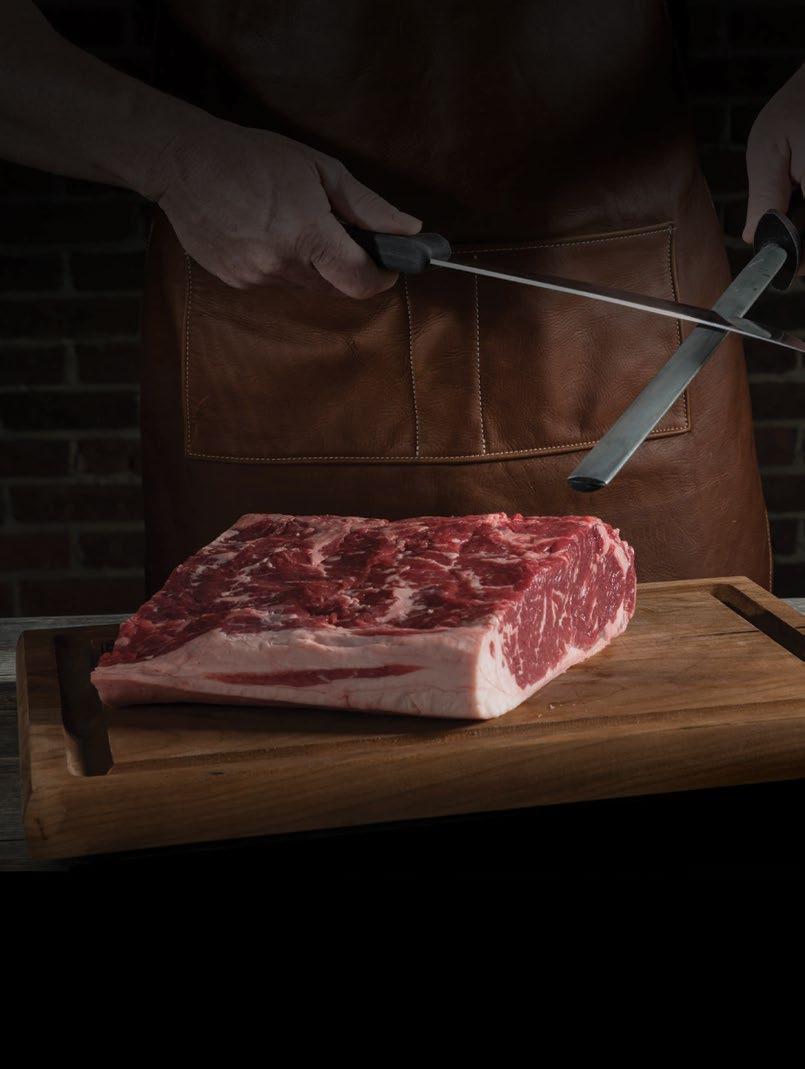
ALBERTA
Gordon Food Service Canada – Calgary
Gordon Food Service Canada – Edmonton
Intercity Packers – Edmonton
BRITISH COLUMBIA
Intercity Packers – Richmond
Gordon Food Service Canada – British Columbia
MANITOBA
Gordon Food Service Canada – Winnipeg
To-Le-Do Foodservice
NEWFOUNDLAND AND LABRADOR
Atlantic Grocery Distributors

NOVA SCOTIA
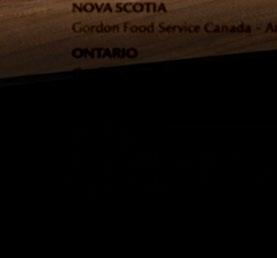
Gordon Food Service Canada – Atlantic
ONTARIO
Gordon Food Service Canada – Ontario
Intercity Packers – Toronto
Macgregors Meat & Seafood
QUEBEC
Gordon Food Service Canada – Montreal
Gordon Food Service Canada – Quebec
Les Viandes Intercite

The combined force of several industry challenges has made debt re-payment a heavy burden
BY DANIELLE SCHALK
Recent years have resulted in greater financial burdens while operating conditions remain challenging for the foodservice industry.
“It literally is a perfect storm,” Ryan Moreno, co-founder and CEO, Joseph Richard Group, says of the current environment. “And then you add these loans on top of it that you had to get because you were closed [through the pandemic].”

and the urgent need for further
In this environment, “[restaurants] have to renegotiate their loans to stay open,” notes Jeff Dover, principal of foodservice-industry consulting firm fsSTRATEGY Inc. “And, the biggest challenge with that right now is the interest rates.”
“Almost everyone took on a lot of debt in order to make it through COVID,” agrees David Hopkins, president of Toronto-based hospitality consulting agency, The Fifteen Group Inc., noting relief programs such as BDC emergency loans, Highly Affected Sector Credit Availability Program (HASCAP) and Canada Emergency Business Account (CEBA) loans. “They were all great in the sense that it allowed people access to funds to help get them through COVID. The challenge now is that restaurants need to repay them,” he adds. “When people took on all this debt, it just built and built, and they didn’t necessarily realize how long it was going to take to get through COVID… Everybody thought it was going to be a six-months or a one-year problem, [but] it was a basically a three-year problem for restaurants.”
Given how challenging the prevailing economic environment has made operating a restaurant, many had anticipated the Federal Government would afford businesses some additional grace by extending the repayment and forgiveness deadline of CEBA loans when it approached in January, only to be met with disappointment.
As the Ontario Restaurant Hotel & Motel Association (ORHMA) expressed in an industry call to action regarding the CEBA, “In postpandemic times, many in the industry are facing tougher pressures…Food inflation, which on average makes up 35 per cent of a restaurant’s total expenditures, continues to stay high while labour costs have dramatically grown due to minimum-wage increases and overall wage hikes. Commercial insurance, energy costs and all other expenses have also gone up.”
And, as Restaurants Canada stated in its call for a last-minute extension for CEBA repayments in January: “Currently, a staggering 62 per cent of restaurants are operating at a loss or barely breaking even compared to 10 per cent prepandemic, underscoring the obvious connection to this unique and devastating period in our industry
Dover explains that this is not a challenge he expects to see alleviated any time soon either. “Interest rates have to go up to try and bring inflation down and I don’t see that changing in the short- or midterm,” he explains.
As several experts noted when discussing the subject, it’s not exactly easy to find the opportunity within the challenge and frustration of current circumstances surrounding accumulated debt and the need to repay it.
But, it’s helpful to remember that most of the industry is in the same boat. And, as Hopkins points out, that does create a certain level of understanding. “Most lenders, especially if they’re government backed, they know the environment, and everyone’s looking for a solution,” he shares.
“One of the biggest things that restaurants can do now is work with the lenders and put together a plan in terms of what makes sense [for their] repayment,” Hopkins explains. “Most lenders are very open to working with people if they have a plan that makes sense and allows them to repay their debt.”
But, he stresses, “You’ve got to take the initiative. You can’t just sit back and hope.”
To demonstrate his point, Hopkins lays out the following example: “If you’re profitable and you have the ability to service your debt and your restaurant’s successful, you have the ability to work with your lenders to say ’can I repay this over six years, not three years?’ And now your debt repayments are $60,000 instead of $120,000 and are manageable.”
Dover also suggests there is some opportunity within current conditions to make mindful decisions when considering expansion or opening a new restaurant. “You can retrofit a closed restaurant to take on less debt, [and] look at used equipment instead of new equipment,” he suggests, advising that the wise thing is to take measures to reduce the amount of debt being taken on. FH

The costs of goods has been a moving target in recent years and this is contributing to industry pain points — especially as food cost across the country are generally following an upward trend.
Colin Burslem, culinary director of Surrey, B.C.-based Joseph Richard Group, points to the wide range of factors that have been disrupting supply chains and, ultimately, influencing costs, including extreme weather, natural disasters and wars. And, on top of that, factors such as inflation and carbon taxes are further increasing the cost of these goods.
“From a producer standpoint,” says Burslem, “the costs for them to do business has increased, so for them to maintain and sustain their livelihood, they have no choice but to raise the cost of goods on that raw product.”
And this trickle-down effect continues through the path to consumer. “Food costs are driving menu prices up,” Burslem adds. “I’ve been working 23 years in the food-and-beverage industry and I’ve never seen the cost of goods at where they are today.”
Of course, he’s not alone in this experience. Lightspeed Restaurant data for April through June 2023, released by Lightspeed Commerce Inc., shows a 4.73 per cent yearover-year increase in median item price and a 6.96 per cent year-overyear increase in median burger price across its North American restaurant clients.
The Touch Bistro State of Restaurants 2023 report further highlights this trend, with 53 per cent of North American operators reporting that they raised their menu prices within the past six months in order to offset rising costs. The report also reveals that most operators raised their prices by an average of 15 per cent and goes on to suggest this “appears to be the maximum increase most consumers are willing to absorb.”
Jeff Dover, principal, fsSTRATEGY Inc., warns against operators holding on to hopes that food costs to decrease anytime soon. “There’s a perception out there that prices are going to come down on menus, but it’s built into the system — we need deflation in order for food costs to go down.”
Burslem agrees that this challenge won’t be quickly


resolved. “My prediction would be that we’ll continue to see the cost of goods rise,” he notes. “We’re at an interesting crossroads in the food and beverage industry because there’s a lot of unknowns with what’s ahead.”
Looking at what is probably a long road ahead, Dover notes there’s opportunity to be tapped in adapting how menus are managed. “Look at what’s available and what’s discounted on a seasonal basis…Feature those items and, using menu engineering, drive people to order what you want them to order,” he suggests. “If you make something with fresh strawberries in July, your food cost is a lot less than if you’re making something with fresh strawberries [in January]. It’s really about taking a look, each month, at what your theoretical cost of sales are for each menu item and discontinuing some, or adjusting them seasonally.”
As Dover stresses, the process of menu management needs to be more active and flexible than it’s been in the past. “The important thing is, every month you should be looking at your theoretical cost of sales for each menu item. You have to be costing each menu item and, when [ingredient costs] are going up, you have to make changes — it might be portion sizes, might be changing ingredients and mixing it up a bit. But, if you set the price once and you don’t look at it again for a year, you could be in a lot of trouble,” he explains.
And, as Nourish Food Marketing’s 2024 Nourish Trend Report notes, embracing technology such as artificial intelligence (AI) may be a valuable tool in reducing spending/ costs. “Look for ways it can streamline your food inventory management to save time and minimize waste, and provide an instant boost to the bottom line,” suggests Nourish president and founder, Jo-Ann McArthur.
David Hopkins, president, The Fifteen Group, highlights that it doesn’t have to be a wholly utilitarian approach to this kind of menu management. He suggests there’s also opportunity to encourage creativity. “If the cost of an item doubles, you don’t have to increase the [menu] price. You can challenge your chef or kitchen manager and say ’hey, we need a different item to replace this, with different ingredients that are more economical.’”
Dover acknowledges that some changes may be hard to make, but highlights the necessity of a practical mindset. “Nobody ever likes taking something off [the menu], because there’s so and so that comes in every month and orders this item…But, that’s where the opportunities are, it’s in sound management of your menu.” FH
Despite overall inflation trending down, Restaurants Canada’s October Restaurant Outlook Survey revealed restaurant owners are still bracing for higher labour and food costs in 2024 compared to 2023.
As Ryan Moreno, co-founder and CEO, Joseph Richard Group (JRG), explains, when it comes to inflation, all of the conversations around industry challenges roll into one. He points to areas such as labour, supply chain and real-estate, stating: “All of these components have been going up.”
“Input costs are increasing,” agrees Jeff Dover, principal, fsSTRATEGY Inc. And, this, in and of itself, poses a significant challenge for the industry because, “restaurants are a tight margin business — and it’s becoming even more so.”
The cost of labour in particular is an operating expense that has continued to grow, with six provinces implementing minimum wage increases in October 2023. In fact, Restaurants Canada data shows 91 per cent of operators are anticipating higher labour costs in 2024 compared 2023 — and 56 per cent expect it to be significantly higher.
Dover agrees, increasing labour costs are likely going to be an ongoing pain point. And, he notes, those provinces that didn’t just receive a minimum wage increase may see one soon.
“We have a lot of elections going on this year, so I’m sure [minimum wage] is going to become an election platform item. But beyond that, because of labor shortages, you have to pay more than minimum wage anyway.”
The ways inflation is influencing behaviours among the dining public are also an area of concern. “The consumer has changed their spending habits. Instead of going out three/four times a week, now they’re going out once a week,” says JRG’s culinary director, Colin Burslem. “The consumer has changed where they’re spending their money, how often they’re spending it and what that looks like.”
And, when they do go out, they’re more likely to be looking for value.
As, Burslem notes, that doesn’t necessarily mean looking for a deal on price. “Not everybody is out there looking for a deal. What’s important to a customer of a restaurant right now, given high inflation rates, is that there’s value in [the experience]. So, is it good service? Is it good wine? Is it good food? Is [all of it] at the level that I expect? And, oftentimes, is it exceeding that expectation?”
And, it’s not just guests that are feeling the pinch. “Everybody’s feeling
it — it’s the staff that work in the restaurant, suppliers, producers,” says Burslem. This outside pressure is also an added factor influencing restaurant teams, he adds. “People are more stressed out, they’re more dissatisfied and they’re less engaged” — a challenging dynamic to navigate within a service-driven environment.
Given the state of inflation in Canada, David Hopkins, president, The Fifteen Group Inc. says, “[For] people who approached it appropriately, it was a massive opportunity…this is the only time I’ve ever seen where consumers have actually given us the green light to raise prices.”
However, Hopkins stresses the importance of approaching price increases properly in order to avoid customer backlash. “Unfortunately, a lot of restaurant [operators] don’t really understand the math behind restaurant profitability and they increased prices way more than they needed to to offset the increased costs.”
As Hopkins explains, “If your food costs increased by 25 per cent, you only have to raise your menu prices by 12 per cent to offset that.” He notes that this is a rate of increase that adapts to increased input costs while still being palatable to guests. “Nobody is happy paying $20 for the club sandwich that was $15 one or two years ago, but they’d be happy to pay $17 for the $15 sandwich.”
Given that the right balance is struck between value and experience, restaurants should be able to maintain traffic. Mastercard Economics Institute’s (MEI) Economic Outlook 2024 shows a 1.58-per-cent increase in spend on dining (in 2023). The report also highlights expectations that consumers will continue to prioritize the discretionary spending that matters most to them “with experiences like dining remaining a popular choice,” despite discretionary spend losing share of wallet to essentials.
And, going back to the economic stress inflation has placed on individuals, Burslem notes there may be some opportunity for restaurants within this. “It’s a scary time for a lot of people when they’re seeing their dollar not going as far and they’re trying to find creative ways to maintain their lives…[which is leading some people] to choose to take on a secondary part-time job.”
At the end of the day, there is also the promise of light at the end of the tunnel. MEI’s Economic Outlook 2024 report notes “the Canadian economy should return to subdued growth in 2024 while inflation slows and the Bank of Canada begins rate cuts.” FH


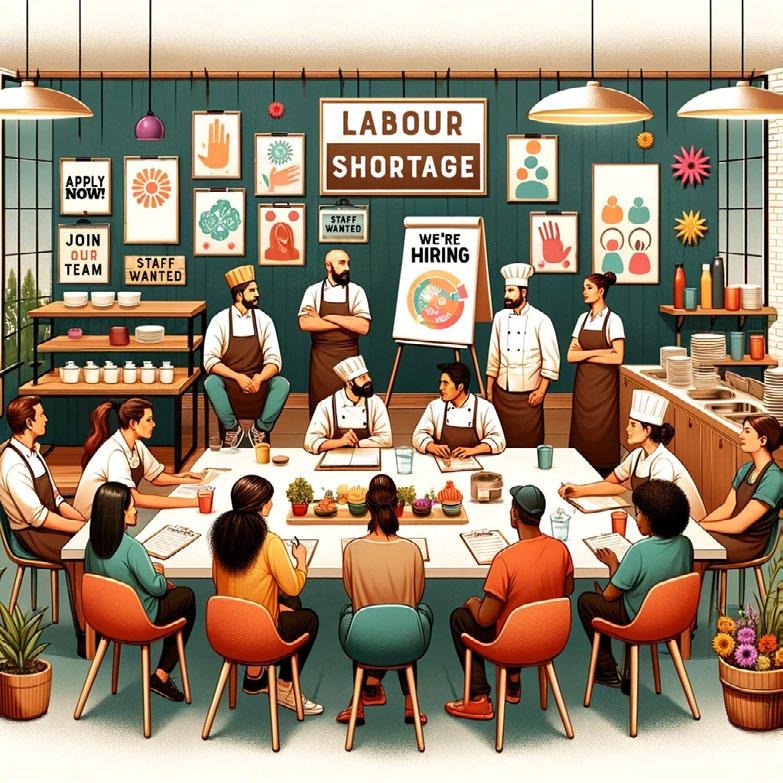
Labour shortages serve as a persistent pain point for the industry
BY DANIELLE SCHALKIt’s not new, nor is it a secret that the foodservice industry faces challenges when it comes to meeting its labour needs.

As Ian Milford, principal, JRoss Hospitality Recruiters, sums up, “There are two primary challenges [surrounding labour shortages]. The first is that there are jobs available and nobody wants to do them. The second, is that our industry has not done a good job of attracting new talent.”
These challenges are further heightened by the fact that the industry’s staff-retention rates are also very low. As Milford explains, the foodservice industry “has a notoriously bad track record” when it comes to communicating and demonstrating what the path to successful career growth in the industry looks like, which contributes to high attrition rates.
And, with less shine on the industry and operators that have been in survival mode for the last four years — especially when compared to the excitement and momentum that existed within the industry prior to the pandemic — prospective workers are less likely to perceive foodservice as offering significant opportunities for advancement.
Ryan Moreno, co-founder and CEO of B.C.’s Joseph Richard Group, notes that even when an organization is dedicated to developing its team members and providing transparency, current conditions have limited the opportunities for development and advancement. “With a lot of growth comes a lot of [opportunities for] development and education within our organization,” he explains.
According to Tourism HR Canada’s (THRC) Perceptions of Tourism as a Place of Employment report, of all the tourism and hospitality sectors, Food and Beverage Services has the largest pool of experienced workers to pull from, given 41 per cent of Canadians have worked in the industry (based on data collected in September 2023). However, F&B still garners the lowest retention rate at just eight per cent, as well as the lowest rate of employee satisfaction (51 per cent).
And, it’s important to note that the issue of retention has become an increasing challenge. North American hospitality industry data from Lightspeed Commerce Inc. reveals a staggering increase in employee turnover, with a year-over-year increase of 75.78 per cent when comparing data from April-June 2022 to the same period in 2023.
Given the challenges faced, it’s clear that their needs to be changes to staffing practices within the industry.
“We really have to start managing differently,” shares Jeff Dover, principal, fsSTRATEGY Inc. Especially given how shorthanded operations can be, he notes, “There’s so much pressure put on employees at restaurants to stay late or work on their days off.”
Moreno agrees that change must be embraced. He notes that facing a challenge like this “pushes a business to be better and create a great culture within the organization.” He also suggests that, regardless
of whether or not the labour market is actively posing a significant challenge, “businesses need to keep pushing to be better and more
As restaurants/brands adapt their strategies, Milford notes the importance of being mindful of younger cohorts values and expectations. “Today’s worker is looking for a different employee value proposition. They’re still interested in earning money, because they’ve got bills to pay, but they also want to know what your company’s core values are,” he explains.
He also warns that authenticity is vital in these efforts. “This cohort is not afraid to dig down and find out what [they] can about an employer,” he explains. “These are smart, savvy individuals who have grown up in the Internet age; they know a scam when they see one and they are not afraid to raise their hand and say ‘I don’t think this is genuine.’”
There’s also a notable opportunity in diversifying hires and addressing inequality within the industry. As the THRC study highlights, workers within the tourism industry are more likely to be men.
And, some studies have shown that this gap in gender representation is growing in the post-pandemic era. Women of WORTH: The State of Gender Equality for Vancouver Island & Region’s Tourism Sector highlights a 3.3-per-cent decrease in women working in food and beverage services in B.C. in 2023, compared to pre-pandemic figures, while the rate of men being employed in the segment grew by 16.5 per cent.
Beyond being under-represented in the food-and-beverage industry, women are under-represented in food and beverage management roles, and Milford stresses that shifting this dynamic can be an important factor in shifting culture. “If you want to solve your problems, hire more female leaders, because they’re more empathetic, they’re better mentors and they tend to be better leaders because they lead from a place of empathy,” he shares.
Aside from adapting culture and hiring approaches, David Hopkins, president of hospitality consulting agency, The Fifteen Group Inc., notes certain opportunities lay within optimizing restaurant operations. “We’ve encouraged all our clients, throughout the last couple of years, to make sure they’re open at profitable times,” he shares.
However, when adjusting hours operation, Dover stresses the importance of having a consistent and clearly communicated schedule for the sake of the customers. “A lot of restaurants have moved to these fiveday weeks where they can give everyone a full-time job, and everybody has the same days off,” Dover adds, suggesting that this kind of consistency and stability is attractive to prospective employees.
Finally, Hopkins stresses the importance and value of “a great training program…which is always important in a restaurant, but… it becomes even more important when you have shortages and when you have higher turnover — when you’re bringing in somebody and you need them to start working ASAP. A good training/onboarding program will help you [get them up to speed].” FH
Anyone looking to open a new restaurant, re-locate or expand a foodservice brand today is bound to face challenges when searching for an ideal space.
Characterizing the current real-estate market, Christian Petronio, sales representative and director of Hospitality Division for Toronto-based CHI Real Estate Group, notes “We have a lot of people who are looking, but the kinds of places they’re looking for just aren’t coming up.”

And it’s not just ideal leased spaces that are in short supply. “[Something] there’s a big need for right now is building for sale with restaurants,” adds Ori Grad, broker and managing director of CHI Real Estate Group. “There’s quite a few people who are looking to buy the building…they’d rather renovate their [own] building and pay a mortgage instead of a landlord.”
Additionally, with limited real-estate opportunities, there’s bound to be competition for those spaces and locations that are most desirable, if and when they do come available. And it’s not just food-and-beverage outlets that are struggling to find space. Commercial real-estate and investment-management company, JLL’s Canada Retail Outlook, published in September, notes, “Continued demand for physical space and a shortage of new space are keeping the Canadian retail market (which includes restaurants) tight, with availability at historically low levels.”
And, with demand high, those with less weight to throw around are more likely to get shouldered out. “It remains hard for an independent or small chain to get some of that primary real-estate — and location so important,” says Jeff Dover, principal, fsSTRATEGY Inc. “You need the demand drivers. Whoever the market is you’re serving you want to be somewhere easy for them to access.”
Additionally, Dover notes, “It’s really hard for a landlord to take a chance on a small chain or an independent restaurant.”
But, beyond that, Ryan Moreno, co-founder and CEO of B.C.-based Joseph Richard Group, explains, “The cost of real-estate, coupled with [current] interest rates, [also] makes it challenging to get into a new property right now.”
“Pricing for spaces…is sort of crazy,” Moreno elaborates. “It’s expensive to buy, [and if you’re looking to lease,] the property owners either have done well with the property or are holding a big mortgage and don’t want to sell it because they want to continue to make money, so [they’re looking] to get a certain amount of money from the tenant.”
And, when it comes to acquiring space, Dover
notes, it is vital that operators don’t bite off more than they can chew. “The rule of thumb is: you don’t want your occupancy costs (including utilities) exceeding 12 per cent of your revenues,”
The bottom line is, there are currently a limited number of offerings coming to market and even fewer that will meet the specific needs of any growing or prospective operator. “Just because a place is available and has some of [your desired] features — or maybe even all of them — doesn’t mean it’s in the right area, or that the asking rent is still within your budget, or the space itself [truly] suits your needs,” says Petronio.
While it may be a bittersweet truth, the reality is that challenging operating conditions will ultimately create openings in the market. As Dover succinctly says: “There’s going to be some opportunities with restaurant closures.”
“We’re anticipating a whole slew of closures in the industry in 2024, which, unfortunately for those closures, [creates] opportunities for people to get into the space,” agrees Hopkins.
All of this means those who have been waiting and watching may have a chance at finding the ideal space as the year goes on. As Hopkins notes, the ideal opportunity is to “find somebody who has gone out of business in an existing space, with the [necessary] kitchen infrastructure.” This way, the time and costs necessary to get the space operational can be limited.
Other shifts within the wider economic environment could also spell further changes for the real-estate market. Grad notes that a change in interest rates will create shifts. “That little bit of lightening up will certainly drag people back into the markets and spending money.,” he explains. “We haven’t seen prices really come down yet, but there’s optimism in the air right now.”
Ultimately, the beneficiaries of any incoming real-estate opportunities will be those who are prepared and have a clear understanding of their needs and limits.
Dover notes that with limited opportunities for space, it can be tempting to jump on openings without properly weighing all of the factors. Cost, accessibility, demand drivers and nearby competition should all be carefully considered.
“Watch for your opportunities. Opportunities will come up because, unfortunately, restaurant closures are going to be greater than normal this year. [But], be smart about it,” Dover advises. FH

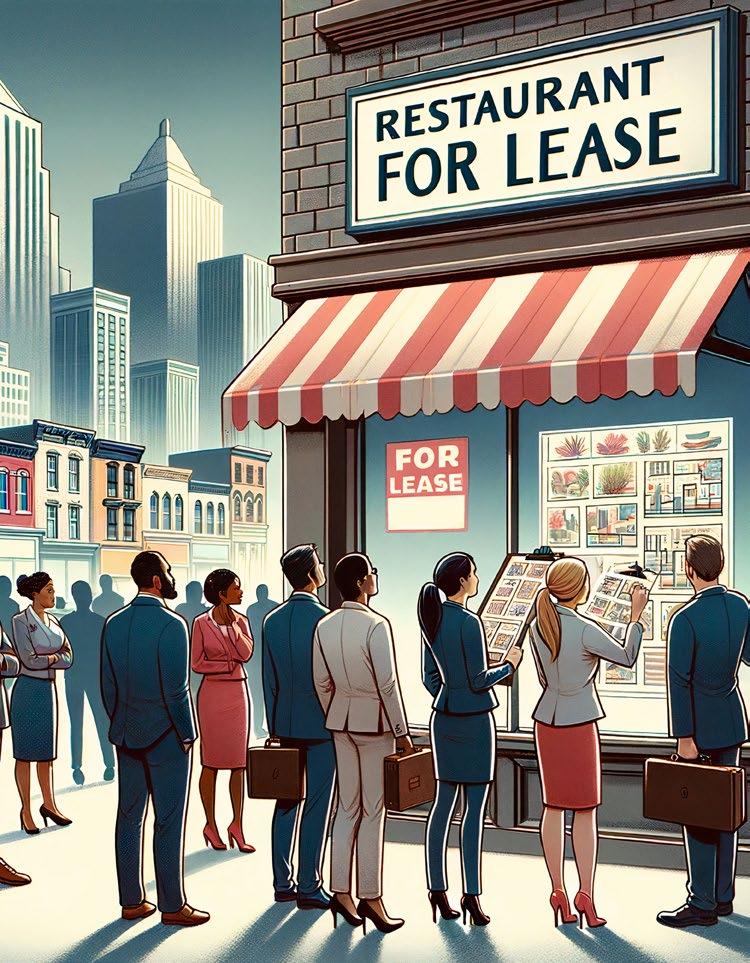
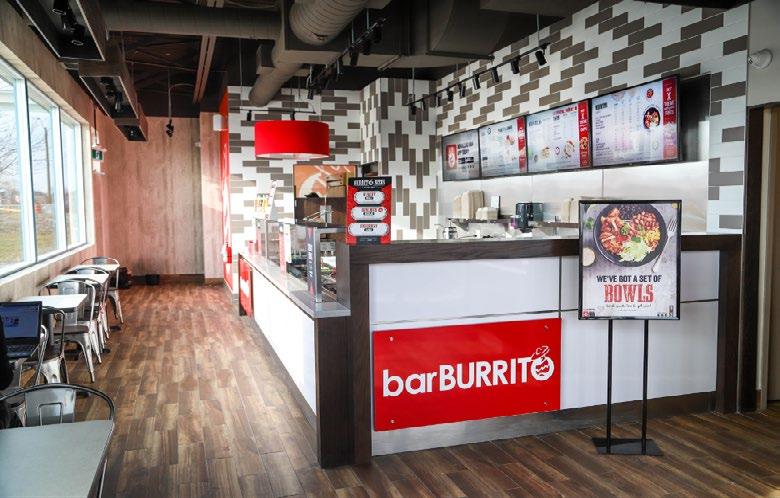
one of the largest and fastest growing Tex-Mex food franchise in Canada, barBURRITO has captured the hearts (and appetites) of many. Since its inception in 2005 in Toronto, the quick-service concept has maintained consistency in food quality and customer experience, and its rapid expansion across the country has been a testament to its popularity.
Building off its record-breaking year in 2022 with 75 new units, the company opened 64 new units in 2023, finishing the year with a total of 293 stores from coast-to-coast.
“As a Toronto-based company, we have the strongest presence and market penetration in Ontario,” says Jeff Young, Chief Development Officer, barBURRITO. “Looking to the future, the greatest growth [opportunities will be] in Western Canada, specifically British Columbia, as well as in
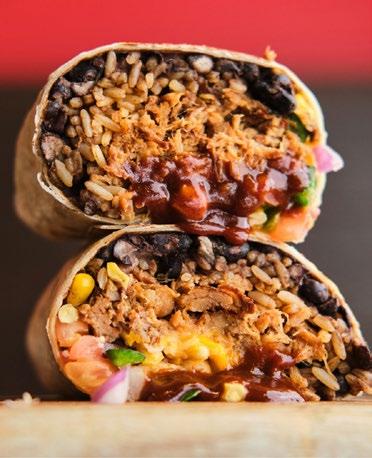
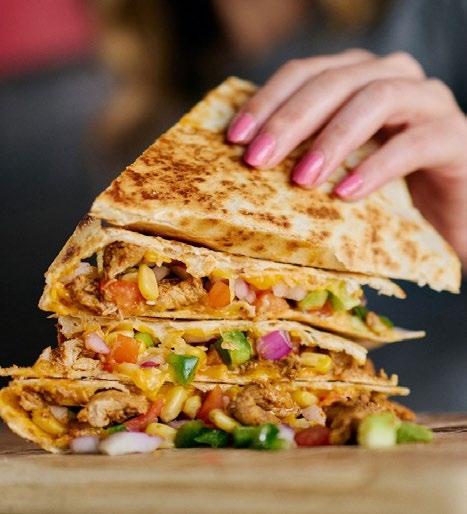
Quebec, where we only have five stores in the entire province.”
The units range between 1,000 and 1,500 sq. ft. and seat up to 30 customers. While there’s currently only one store equipped with a drive-thru, “this amenity will be available at more locations in the future as we develop our non-traditional model,” says Young.
As the name implies, barBURRITO offers customizable burritos and bowls, “which represent about 70 per cent of its sales mix,” says Young, as well as other Mexican food items, such as tacos, quesadillas and churros.
“Last year, we introduced a line of chefinspired authentic street tacos as a limitedtime offer,” says Young. “More recently, we launched a Jarrito-infused barbacoa, which has become a permanent menu item to replace steak.”
In March 2024, Young says a breaded pollock item will be added to barBURRITO’s menu, complemented by a new lime-crema sauce.
Recognizing the shift in consumer behaviour towards digital platforms, barBURRITO has a “proprietary [mobile] app fully integrated with its POS system and allows guests to conveniently place orders for pickup and delivery,” says Young, adding that
app users can collect points, earn rewards, order ahead, unlock personalized offers and enjoy a free churro on their birthday.
To enhance its operational standards, barBURRITO launched Nudge in 2023. “Nudge is a digital platform focused on providing our franchisees the knowledge, tools and resources they need to execute consistently through communications and guided-task execution,” says Young. The company also uses Zenput, a digital platform for conducting store audits and ongoing operational assessments.
Another enhancement in 2023 with regard to barBURRITO’s equipment package was the introduction of “a cloud-based combination to ensure precise cooking, improve consistency, maintain freshness, reduce labour and minimize wastage,” says Young. “This technology will be included in all of our stores moving forward and we’re in the process of integrating it into our existing network.”
This year, barBURRITO will be implementing an online curriculum as part of its initial training program to further enhance franchisee success.
“barBURRITO is recognized as a dynamic franchise and, as a result, we get a lot of
natural interest in the brand,” says Young. “About 50 per cent of our network is made up of franchisees who own more than one location. Additionally, there’s strong interest from owners of other franchise concepts looking to expand and diversify their business portfolio, as well as new entrepreneurs.”
In terms of franchise-recruitment initiatives, barBURRITO actively promotes its franchise opportunities on social media in untapped and tertiary markets. Additionally, the company hosts a Franchise Discovery Webinar twice a week, which Young says is generally well attended.
“I take attendees on a journey that covers the history of the brand and all areas of franchise support services such as site selection, design and construction, initial and on-going training, marketing initiatives, supply chain, the investment and steps to become a barBURRITO franchisee,” says Young. “At the end of the [webinar], we have an open forum for Q&A.”
When it comes to selecting the right franchisee, Young says the company looks for someone “who has strong leadership skills and is passionate about hospitality by delighting guests with exceptional customers experiences. They must have a growth-driven mindset, be a team player and follow brand standards. Finally, they must have the financial resources to open and operate the business.”
barBURRITO’s initial franchise fee is $25,000, with a total investment estimated between $390,000 and $420,000. “To qualify for bank financing, a franchisee will need $140,000 to $150,000 unencumbered equity, in addition to a good credit rating and net worth of a minimum of $250,000. barBURRITO has a franchise-financing program with select financial institutions, which offers preferred interest rates and makes the loan application process quicker and easier.”
Once a franchise agreement and lease are signed, Young says it takes approximately four to six months from that point in time to opening.
“What we’re most proud of is the organic growth we’re experiencing with existing franchise partners who are expanding with multiple locations,” says Young. “This is a clear reflection that our franchisees are happy and successful and their re-investment into the brand is the biggest compliment and the strongest validator that any franchisor could have.” FH

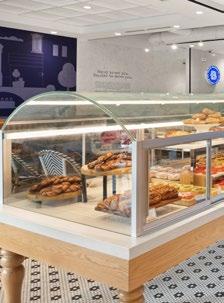
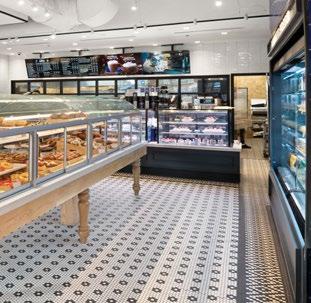
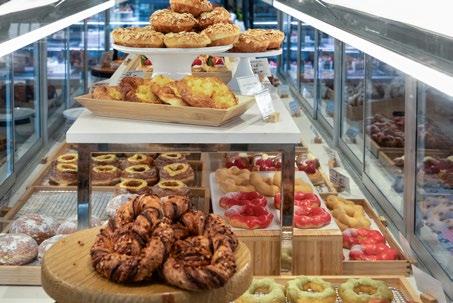
hat makes Paris Baguette a force to be reckoned with is not simply its unprecedented growth, but also the fast that it’s showing no signs of slowing down. Instead of taking the wellbeaten path of transitioning into a full-service restaurant, it stands true to its vision of becoming the best neighbourhood bakery café in the world.
In 2023, the brand opened four cafés in Canada and sold three new deals. This year, the company has plans to open an additional 10 locations in Toronto, Edmonton, Mississauga, Ont. and Vancouver.
Behind this remarkable growth is a dedicated leadership team led by CEO Darren Lipton. “At Paris Baguette, community is at our core,” says Lipton in a company release. “We believe it’s the people that make the experience that much sweeter. As we continue to grow, we will hold fast to our brand values.”
Paris Baguette boasts more than 4,000 units across the globe. The global brand first franchised in the U.S. in 2015 and has since established more than 150 locations in markets across the country, making it one of the premier franchise opportunities in its category.
“[The company recorded] more deals, leases and openings in 2023 than ever before,” says Eric Lavinder, Chief Development Officer, Paris Baguette. “Sales are very strong,
with Canada seeing some of the highest sales numbers. Additionally, we introduced a dedicated holiday promotional campaign focused on seasonal cakes and festive treats. We also planned for several cohesive calendar windows pulling through thematic flavours across pastry, cake and beverages.”
The concept originated in Korea as a French-inspired bakery. “In the U.S., we have leaned in on the French bakery inspiration while incorporating many of our traditional Korean roots to create truly unique products,” says Lavinder.
However, what sets the brand apart is its commitment to supporting its franchisees. “We’re focused on all major metro markets in Canada, with a focus on British Columbia and the GTA, but we’ll consider [additional] markets when we identify strategic partners to join us as we continue to grow,” he says.
The brand aims to identify franchisee partners who have a similar vision for growth. For prospective franchisees, the initial-investment fee ranges from $652,565 to $1,750,900, which includes the $50,000 franchise fee. The franchisee commitment is for a period of 10 years and franchisees are expected to adhere to brand standards outlined in the operations manual as well as the legal requirements in the franchise agreement.
“We continue to focus on finding the right partners, securing top real estate and ensuring our franchisees and their teams are
fully prepared to open with great success,” says Lavinder, adding ideal locations for Paris Baguette are standalone or end cap units of about 3,000 sq. ft.
The brand prides itself on franchisee support including real-estate support, which encompasses identifying opportunities, reviewing leases, approving test fits, evaluating construction bids and selecting the right partner. Furthermore, franchisees are provided a comprehensive four to six weeks of training at the company’s training centre, coupled with seven to 14 days of onsite training for preopening support through the grand opening. Marketing and ongoing operations support for the full term of the agreement is also provided, including financial reviews, training support and troubleshooting as franchisees navigate daily café operations.
Paris Baguette has a clear vision of its next steps and has carefully chalked out plans to drive expansion. “We’ve hired an additional team member to handle U.S. real estate and transitioned an existing team member to solely focus on Canadian sales and real estate to ensure we keep our momentum going and stay focused on finding and partnering with our franchisees to help set them up for success,” says Lavinder. “Canada is a big focus for our brand and we’re excited as we continue to see the demand for our brand through franchise growth and guests enjoying our offerings.” FH
rom an expansion perspective,
2023 was an exciting year for Firehouse Subs, with more than 50 restaurants opening across North America.
“There were two big highlights for the brand,” says Kelly Crummer, senior director of Franchising for Firehouse Subs in Canada and the U.S. “We opened our first restaurants in Canada outside of Ontario, with several more on deck for Western Canada before the end of [2024], and over the summer we opened our first restaurant outside of North America with a location in Switzerland. We’re excited for the brand to continue to grow across Europe, the Middle East and several other places.”
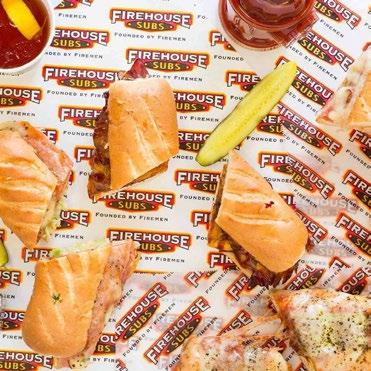
In fact, in June 2023, Firehouse Subs’ parent company, Restaurant Brands International, announced the signing of a development agreement to launch in Mexico.
“Firehouse Subs is our newest brand, and we are excited about its global expansion potential,” says David Shear, president International RBI, in a release. “The entry into Switzerland and development agreement in Mexico are the first steps in our international expansion, and we are working to launch the brand in key growth countries across EMEA, APAC and Latin America.”
The brand currently boasts 1,266 restaurants, with 63 of them in the hands of Canadian franchisees. Established 1994 in Jacksonville, Fla. By two firefighter brothers, Firehouse Subs opened its first Canadian location in 2015 in Oshawa, Ont.
“We started in Ontario and we’ve got many restaurants there, but growth in the immediate future is focused on Western Canada, including Alberta, Saskatchewan, Manitoba, and British Columbia,” says Crummer.
When choosing a site for a Firehouse Subs unit, Crummer says although a centre unit in a Smart Centre is appealing, the preference is an end unit for stability and convenience. “If we can get a drive thru, we will take it, but we don’t have to have that,” adding they look for areas with high traffic and convenient access. “We recognize that we do a lot of our business at lunch and sometimes people only have a 30-minute lunch window. So, we want those places that are convenient to get in and out of so that they can come get their sandwich and be back to work.”
Ideal square footage is somewhere between
1,200 to 1,700 sq. ft. with the “sweet spot” being 1,500 sq. ft. But as the brand looks to expand in downtown Toronto and downtown Vancouver, “we’re looking for some smaller spaces, just due to the cost of real estate there and obviously, more foot traffic versus vehicle traffic,” she says. “We’re looking to go as small as 800 sq. ft. with anywhere from two to five seats in those smaller formats. In those 1,500 sq. ft. units it really depends on how its laid out. But we may do 10 to 15 seats depending on how large it is and what the space looks like.”
The initial franchise fee for a Firehouse Subs unit in Canada is $30,000 and while the company welcomes single-unit operators, Crummer says the ideal franchisee is a multiunit operator that would start with three to five units and then grow to be an eight to 15-unit restaurant operator.
And although the past few years have been challenging for the restaurant industry, Crummer says franchisees are ready to invest. “You just have to find the right people. We’re seeing demand for the product, and there’s demand for the brand, so that then turns into demand for franchisees.”
Franchisees receive comprehensive support when they join the Firehouse Subs family, starting with the real-estate and onboarding team support franchisees in finding a site, getting permits and getting the location built. “We have a six-week training program in restaurants to learn the ins and outs of
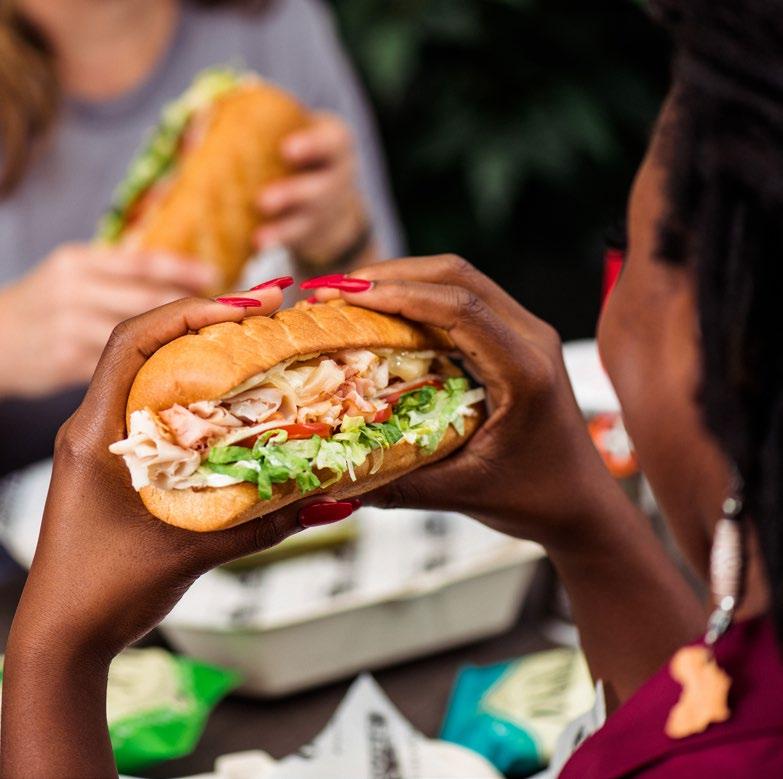
running the business,” says Crummer. “And then once you’re open, we have ongoing support worked through our Field Marketing team so we continue to innovate and provide training. We have monthly webinars, weekly email newsletters, an annual convention, and then the field-ops support team is in the field, visiting our operators frequently, and providing them coaching on how to continue to grow their business.”
Giving back is at the core of the brand,
evident through its Firehouse Subs Public Safety Foundation of Canada, which was founded in 2015 and has since awarded more than $3.2 million in lifesaving equipment to first responders and publicsafety organizations. Canadian guests can support the Foundation at restaurants across the country by rounding up at the register, donating spare change, and purchasing a recycled, five-gallon pickle bucket for a $3 donation.
“Our franchisees are committed to their communities, committed to public safety and our Public Safety Foundation, and committed to hospitality,” says Crummer. “We don’t necessarily require restaurant experience — we’d like it if you have it, but we don’t require it — because we’re looking for people that can deliver hospitality, not just customer service. We can teach you how to make a sandwich, but we can’t teach you how to be a nice person, you have to bring to the table.” FH
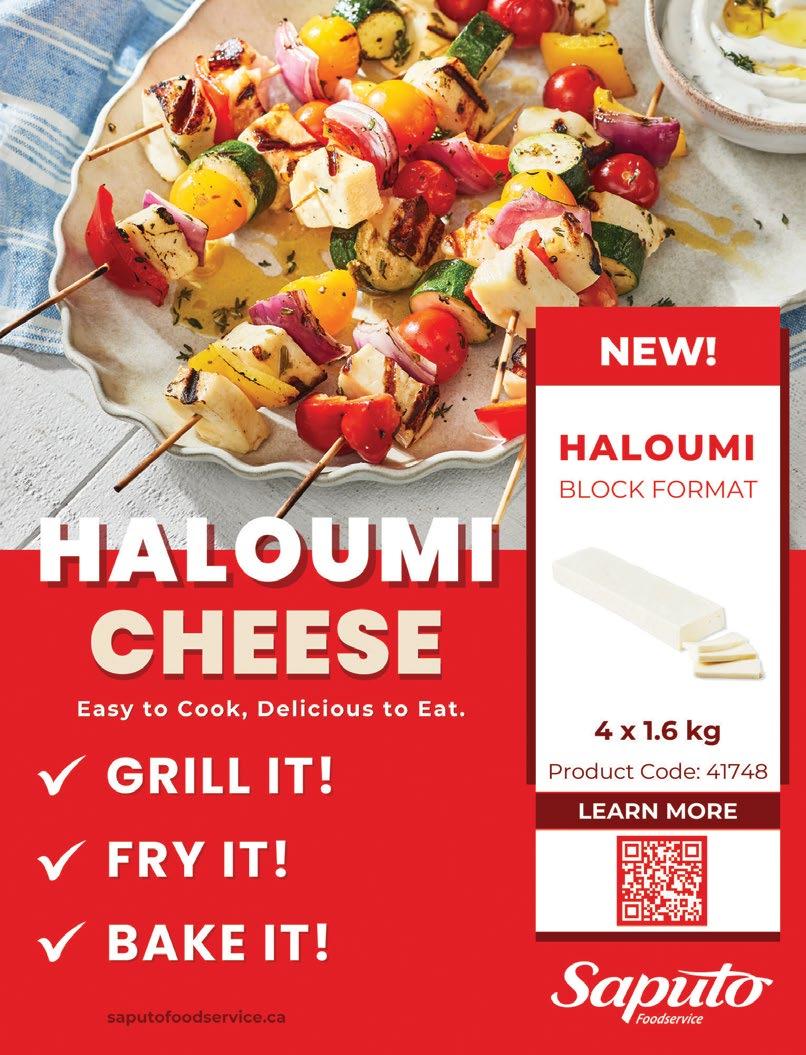

77 Progress Ave.
Toronto, ON M1P 2Y7
Director of Franchising and Real-Estate Development: Tariq El-Noqrashy
History, Plans - established in 1986 in Toronto - 69 units in Canada
- four units under development
Franchise Costs
- franchise fee $30,000 - training fee $5,000
- architectural drawings $15,000 - leasehold improvements $165,000 - signage & interior art package $11,500 - equipment & smallwares $100,00
- advertising fee 3% - royalty fee 5%
Services
- advertising/marketing - design
- financial assistance - lease negotiation - purchasing - site location - staff training
171 W. Esplanade, Ste. 300
North Vancouver, BC V7M 3K9
Director of Franchising: Ryan Picklyk
History, Plans - established in 1956 in Winnipeg - 1,053 units in Canada
Franchise Costs
Standard Franchise Program:
- initial franchise fee $55,000 (20-year term)
-advertising fee 2.5% - royalty fee 2.5%
Services - advertising/marketing - design - lease negotiation - management - purchasing - site location - staff training - supplies - other
8150 Trans-Canada Hwy., Ste. 200
St-Laurent, QC H4S 1M5
History, Plans - established in 2001 in Montreal - more than 40 locations in Quebec and Ontario
Franchise Costs
- initial franchise fee $55,000
- initial Investment: $800,000 to $1,200,000
- advertising fee 2%
- royalty fee 5%
Services
- advertising/marketing - construction and equipment - design & drawings - lease negotiation
- ongoing management support - purchasing - site location - supplies - training/support
450 North Brand Blvd.
Glendale, CA 91203
President: John Cywinski
History, Plans
- established in 1983 in Decatur, Ga. - 16 units in Canada; 2,200 outside of Canada
Franchise Costs
- initial franchise fee US$40,000
- estimated build costs US$556,000 to US$2,600,000
- national advertising fee 3.5%
- royalty fee 4%
Services
- information available upon request
310-9300 Trans Canada
Montreal, QC, H4S 1K5
franchise@foodtastic.ca
CEO: Peter Mammas
History, Plans
- established in 1960 in Montreal
- 18 franchised units in Canada, five corporate units
Franchise Costs
- initial franchise fee $30,000
- investment required: $800,000 to $950,000
Services
- advertising/marketing
- design
- financial assistance
- lease negotiation
- management
- purchasing
- site location
- staff training
- supplies
310-9300 Trans Canada
Montreal, QC, H4S 1K5 franchise@foodtastic.ca
CEO: Peter Mammas
History, Plans
- established in 2015 in Montreal
- franchising since 2016
- four franchised units in Canada, two corporate units
Franchise Costs
- initial franchise fee $30,000
- investment required $850,000 to $900,000
Services
- advertising/marketing
- design
- financial assistance
- lease negotiation
- management
- purchasing
- site location
- staff training
- supplies
1120 Finch Ave W. Ste. 301
North York, ON M3J 3H7
Chief Development Officer:
Jeff Young
History, Plans
- established in 2005 in Toronto
- 293 units in Canada
Franchise Costs
- initial franchise fee $25,000
- investment required $390,000 and $420,000
*Pleasenotethattheprovidedfranchiseinvestmentrangeisanestimate,andtheactualcostcanvarybasedonseveralfactors,includinglocation, unitsize,andlocalmarketconditions.Foracompleteunderstandingofthecostsandfees,pleaserefertoourFranchiseDisclosureDocument.
Services
- advertising/marketing
- design
- financial assistance
- lease negotiation
- management
- purchasing
- site location
- staff training
- supplies
130 Royall St.
Canton, MA 02021
CEO: Paul Brown
History, Plans
- established in 1945 in Glendale, Calif.; first Canadian store opened in 1971
- 115 units in Canada (all franchised)
Franchise Costs
- initial franchise fee $25,000 (20-year term)
- technology $1,440 to $15,000
- opening inventory $5,000 to $8,000
- total costs $293,840 to $626,360
- continuing franchise fee 5.9%
- continuing advertising fee 5%
- advertising/marketing
- design
- lease negotiation
- management
- purchasing
- site location
- staff training
- supplies
BATON ROUGE*
MTY GROUP
200, 8150 Trans-Canada Hwy.
Saint-Laurent, QC H4S 1M5
COO of Casual Dining: Marie-Line Beauchamp
History, Plans
- established in 1992 in Laval, Que. - 28 units in Canada
Franchise Costs
- starting capital $700,000 to $800,000
- initial franchise fee $65,000
- required investment $1,800,000 to $2,300,000
- national marketing fund 2%
- local store marketing fund 1.5%
- royalties 5%

Services - advertising/marketing
- construction and equipment
- design & drawings
- lease negotiation
- ongoing management support - purchasing - site location - supplies - training/support
MTY GROUP
200, 8150 Trans-Canada Hwy. Saint-Laurent, QC H4S 1M5
COO of Casual Dining: Marie-Line Beauchamp
History, Plans - founded in 2008 in Montreal - more than 60 units in Canada - plans to expand into Ontario and Maritimes, as well as continued growth in Quebec
Franchise Costs
- initial franchise fee $40,000
- equipment/site cost $562,000 to $767,000
- advertising fee 3% - royalty fee 5%
Services - advertising/marketing - construction and equipment - design & drawings - lease negotiation
- ongoing management support - purchasing - site location - supplies - training/support
310-9300 Trans Canada
Montreal, QC, H4S 1K5 franchise@foodtastic.ca
CEO: Peter Mammas
History, Plans - established in 2012 in Montreal - franchising since 2019 - five units in Canada (one corporate)
- new opportunities available across Canada
Franchise Costs
- initial franchise fee $40,000
- project cost $1,200,000 to $1,600,000
- royalty fee 5%
- advertising fee 2%
Services
- advertising/marketing - design - financial assistance
- lease negotiation - management - purchasing - site location - staff training - supplies
MTY FRANCHISING INC.
8150 Trans-Canada Hwy., Ste. 200
St-Laurent, QC H4S 1M5
COO of Fast Casual: Marc Benzacar
History, Plans - founded in 2007
- four corporate locations in Canada - expanding in Ontario and national markets
Franchise Costs
- franchise fee $40,000
- initial investment $475,000 to $550,000
- personal investment 35%
- marketing/advertising 3%
- royalty fee 6%
Services
- advertising/marketing
- construction and equipment
- design & drawings - lease negotiation - ongoing management support - purchasing - site location - supplies - training/support
BLANCO CANTINA
RECIPE UNLIMITED CORPORATION
199 Four Valley Dr.
Vaughan, ON L4K 0B8
Director, Franchising:
Jonathan Young
History, Plans
- established in 2015
- six units in Canada (five franchised)
Franchise Costs
- initial franchise fee: $60,000
- total costs: $1,000,000 to $1,400,000
- advertising fee: 1% national; 1% local
-royalty fee: 5%
Services
- advertising/marketing
- design
- financial assistance
- lease negotiation
- management
- purchasing
- site location
- staff training
- supplies
2285 Clark Dr., Ste. 250
Vancouver, BC V5N 3G9
Franchise Development Director: Mike Chapman
History, Plans
- established in 1992 in Vancouver
- 64 units in Canada
Franchise Costs
- franchise fee $35,000
- store cost $250,000 to $550,000
- advertising fee 2%
- royalty fee 8%
Services
- advertising/marketing
- operational support
- training
200 Green Lane E., Building E11, Unit 2 Newmarket, ON L9N 0A2
Owners: George Heos & Alex Gerzon
History, Plans
- six unit in Canada
- development opportunities available across Canada
Franchise Costs
- total investment: $450,000 to $550,000
- cash investment required: $135,000 to $165,000
- franchise fee: $40,000
Services
- financing assistance
- training and ongoing support
- construction
- real-estate selection and lease negotiation
- marketing/advertising
- supply chain
- quality assurance
8915-51st Ave., Ste. 205
Edmonton, AB T6E 5J3
President & CEO: Dale S. Wishewan
History, Plans
- established in 1999 in Sherwood Park, Alta. - 414 units in Canada
Franchise Costs
- initial franchise fee $30,000
- total costs $325,000 to $375,000 (turn key investment)
- advertising fee 3.5%
- royalty fee 6%
Services
- advertising/marketing - design
- financial assistance
- lease negotiation
- management
- purchasing - site location
- staff training
- supplies
BOSTON PIZZA INTERNATIONAL INC.
100-10760 Shellbridge Way
Richmond, B.C. V6X 3H1
Director of Franchising: Cailin White
History, Plans
- established in 1964 in Edmonton - 370+ units in Canada
- 45+ units in U.S. and Mexico
Franchise Costs
- franchise fee $60,000
- royalty fee 7%
- national advertising fee 2%
Services
- advertising/marketing
- design - lease negotiation
- purchasing - site location
- staff training
*Pleasenotethattheprovidedfranchiseinvestmentrangeisanestimate,andtheactualcostcanvarybasedonseveralfactors,includinglocation, unitsize,andlocalmarketconditions.Foracompleteunderstandingofthecostsandfees,pleaserefertoourFranchiseDisclosureDocument.


Rede ne Excellence with the New Galbani Professionale Premio Pizza Mozzarella Block 26%

Remarkable blister coverage & uniformity
Ample free oil for indulgent experience


Ideal for exceptional cheese coverage
Unparalleled melting behaviour for mouthwatering texture

Rich, buttery & creamy avour pro le


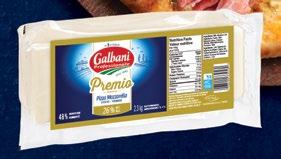




- supplies - menu development - learning opportunitiest
BROWNS RESTAURANT GROUP
3540 W. 41st Ave., Ste. 207a
Vancouver, BC V6N 3E6
EVP - Business Development:
Bruce Fox
History, Plans - established in 2017
- six locations (five franchised) - three additional (franchised) locations to open in 2024
Franchise Costs
- initial franchise fee: $50,000
- equipment/site costs: $2,500,000
- other costs: $450,000
- total costs: $3,000,000
- royalty fee: 6% (all in)
- no marketing/co-op fees
Services - culinary development - lease negotiation - opening support - operational reviews and field support - POS and payment platforms - purchasing - site selection - supplies
BROWNS SOCIALHOUSE
BROWNS RESTAURANT GROUP
3540 W. 41st Ave., Ste. 207a
Vancouver, BC V6N 3E6
EVP - Business Development:
Bruce Fox
History, Plans - established in 2004 in North Vancouver, B.C.
- 69 units in Canada (one corporate)
- primarily focused on Western Canada infill and Ontario expansion
Franchise Costs
- initial franchise fee: $50,000
- equipment/site costs: $2,500,000
- other costs: $450,000
- total costs: $3,000,000
- royalty fee: 6% (all in)
- no marketing/co-op fees
Services - culinary development - lease negotiation
- opening support - operational reviews and field support
- POS and payment platforms - purchasing - site selection - supplies
RECIPE UNLIMITED CORPORATION
199 Four Valley Dr.
Vaughan, ON L4K 0B8
Director, Franchising: Jonathan Young
History, Plans - established in 2010
- 29 units in Canada (two franchised)
Franchise Costs
- initial franchise fee: $25,000
- total costs: $500,000 - $650,000
- advertising fee: 2% national; 1% local
- royalty fee: 5%
Services - advertising/marketing
- design
- financial assistance - lease negotiation
-management -purchasing
-site location
-staff training
-supplies

BURGER KING
BK CANADA SERVICE ULC
130 King St. W., Suite 300
Toronto, ON M5X 2A2
General Manager, Canada: Rob Manuel
History, Plans - founded in 1954
- 360 units in Canada; 19,035 locations in more than 100 countries
- continuing global expansion through 2024
Franchise Costs
- initial franchise fee $55,000
- advertising fee 4%
- royalty fee 4.5%
Services
- advertising/marketing
- design
- management
- purchasing
- site location
- staff training
- supplies
MTY FRANCHISING INC.
8150 Trans-Canada Hwy., Ste. 200
St-Laurent, QC H4S 1M5
COO of Fast Casual:
Marc Benzacar
History, Plans
- established in 1994 in Montreal
- more than 50 units in Canada (Quebec)
Franchise Costs
- initial investment $250,000 to $400,000
- franchise fee $30,000
- personal investment 30-35%
- royalty fee 6%
- marketing/advertising 2%
Services
-advertising/marketing
- construction and equipment
- design & drawings
- lease negotiation
- ongoing management support
- purchasing
- site location
- supplies
- training/support
LW COFFEE INC.
5000 Yonge St. N. York, Ontario M2N 7E9 franchise@landwer.ca
History, Plans
- established in Toronto in 1997
- formally re-launched a franchise program in 2021
- four units in Canada
Franchise Costs
- franchise fee: $60,000
- equipment/site cost $1,000,00$1,200,000
- advertising fee: 1.0%
- royalty fee: 6.5%
Services
- advertising/marketing
- design
- financial assistance
- lease negotiation
- purchasing - site location
- staff training
CAPT. SUB. GRINNERS FOOD SYSTEMS LTD.
105 Walker St.
Truro, NS B2N 5G9
History, Plans
- established in 1972 in Charlottetown
- 39 units in Canada
Franchise Costs
- franchise fee $30,000
- total investment $204,500 to $278,500
- advertising fee 3%
- royalty fee 5%
Services
- advertising/marketing
- design/construction
- financial assistance
- lease negotiation
- purchasing
- site location
- supplies
FOODTASTIC
310-9300 Trans Canada
Montreal, QC, H4S 1K5 franchise@foodtastic.ca
CEO: Peter Mammas
History, Plans
- established in 1984 in Montreal - franchising since 2014
- five units in Canada
- new opportunities available across Canada
Franchise Costs
- initial franchise fee $40,000
- project cost $1,200,000 to $1,400,000
Services - advertising/marketing
- design - financial assistance
- lease negotiation
- management
- purchasing
*Pleasenotethattheprovidedfranchiseinvestmentrangeisanestimate,andtheactualcostcanvarybasedonseveralfactors,includinglocation, unitsize,andlocalmarketconditions.Foracompleteunderstandingofthecostsandfees,pleaserefertoourFranchiseDisclosureDocument.

- site location - staff training - supplies
MTY GROUP
200, 8150 Trans-Canada Hwy.
Saint-Laurent, QC H4S 1M5
COO of Casual Dining: Marie-Line Beauchamp
History, Plans - established in 1980 in Montreal
Franchise Costs
- starting capital $200,000 to $300,000
- franchise fee $40,000
- total investment $750,000 to $900,000 - advertising fee 2% - royalty fee 4%
Services
- advertising/marketing - construction and equipment - design & drawings - lease negotiation - ongoing management support - purchasing - site location - supplies - training/support
CHICKEN CHEF CANADA LTD.
97 Plymouth St.
Winnipeg, MB R2X 2V5
President: Jeff Epp
History, Plans - established in 1978 in Carmen, Man. - 36 units in Canada (all franchised)
Franchise Costs
- initial franchise fee $12,000 (Canada only)
- equipment/site costs $180,000 - royalty fee 3% (Canada only)
Services
- advertising/marketing - design - lease negotiation
- purchasing - site location - staff training - supplies
CHICKEN DELIGHT OF CANADA LTD.
395 Berry St.
Winnipeg, MB R3J 1N6
President: Jim Cartman
History, Plans - established 1958 in Portage la Prairie, Man. - 20 units in Canada
Franchise Costs
- initial franchise fee $20,000
- total cost $428,900 to $603,100 - advertising fee 3% - royalty fee 5%
Services - advertising/marketing - design - lease negotiation - management - purchasing - site location - staff training - supplies
310-9300 Trans Canada
Montreal, QC, H4S 1K5
franchise@foodtastic.ca
CEO: Peter Mammas
History, Plans - established in 2017 in Quebec - 23 franchised units in Canada, one corporate unit
Franchise Costs
- initial franchise fee $25,000
- project cost $450,000 to $550,000
Services
- advertising/marketing - design - financial assistance - lease negotiation - management - purchasing - site location - staff training - supplies
INNOVATIVE FOOD BRANDS
531 North Service Rd. E.
Oakville, ON L6H 1A5
Brand President and Founder: Blair Stevens
History, Plans
- established in 2009 in Kelowna, B.C.
- 100 units in Canada (all franchised)
Franchise Costs
- initial franchise fee $30,000
- total costs $300,000 to $500,000
- advertising fee 4%
- royalty fee 6%
Services
- advertising/marketing
- design
- lease negotiation
- management
- purchasing
- site location
- staff training
OBSIDIAN GROUP INC.
1770 Argentia Rd.
Mississauga, ON L5N 3S7
Franchise Development
Manager: Elaine Macheras
History, Plans
- established in 2015 in Ontario
- 60+ units in Canada
Franchise Costs
- franchise fee $50,000
- estimated development cost $375,000 to $700,000
- marketing fee 1.25%
- royalty fee starting at 3.25%
Services
- advertising/marketing
- design and construction
- financial assistance
- lease negotiation
- management
- supplies & purchasing
- site location
- staff training
980 Hammond Dr. Ne, Ste. 1100
Atlanta, GA 30328
Canadian Franchising Contact:
Russ Sumrall
History, Plans
- established in 1952 in
- 47 units in Canada
Franchise Costs:
- estimated development fee $10,000
*Pleasenotethattheprovidedfranchiseinvestmentrangeisanestimate,andtheactualcostcanvarybasedonseveralfactors,includinglocation, unitsize,andlocalmarketconditions.Foracompleteunderstandingofthecostsandfees,pleaserefertoourFranchiseDisclosureDocument.
- initial fee $15,000
- site work $5,000 to $50,000
- building and improvements $230,200 to $620,000
- equipment/signs $150,000 to $200,000
- fees, A&E services, deposits $50,000 to $150,000
- initial training US$23,000
- opening supplies $6,350 to $12,700
- estimated total $464,350 to $1,101,300
- royalty fee 5%
Services
- advertising/marketing
- design
- financial assistance
- lease negotiation
- purchasing
- site location
- staff training
OBSIDIAN GROUP INC.
1770 Argentia Rd.
Mississauga, ON L5N 3S7
Franchise Development
Manager: Elaine Macheras
History, Plans
- established in 2006 in Ontario
Franchise Costs
- franchise fee $30,000
- total investment $370,000 to $435,000
- advertising fee 2%
- royalty fee 7%
Services
- advertising/marketing
- design
- financial assistance
- lease negotiation
- management
- purchasing
- site location
- staff training
- supplies

77 Progress Ave.
Toronto, ON M1P 2Y7
Director of Franchising and Real-Estate Development: Tariq El-Noqrashy
History, Plans - established in 1982 in Toronto - 41 locations worldwide
Franchise Costs
- franchise fee $25,000 - training fee $5,000
- architectural drawings $25,000 - leasehold improvements $225,000 - signage fee $30,000 - equipment $190,000 - advertising fee 3% - royalty fee 5%
Services - advertising/marketing - design - financial assistance - purchasing - site location - staff training
310-9300 Trans Canada
Montreal, QC, H4S 1K5 franchise@foodtastic.ca
CEO: Peter Mammas
History, Plans - established in 2013 - franchising since 2014 - 25 units in Canada (23 franchised) - two corporate units
Franchise Costs
- initial franchise fee $30,000 - project cost $525,000 to $600,000
Services - advertising/marketing - design - financial assistance - lease negotiation - management - purchasing - site location - staff training - supplies
CORA FRANCHISE GROUP INC.
16 Sicard ST., Sainte-Thérèse, QC J7E 3W7
Manager, Operation Standards: Danica Varjacic
History, Plans - established in 1987 in StLaurent, Que. - 125+ units in Canada
Franchise Costs
- initial franchise fee $45,000 - development costs $591,000 to $883,000
- advertising fee 3% - royalty fee 6%
Services - advertising/marketing - design - lease negotiation - purchasing - site location - staff training - supplies
MTY FRANCHISING INC.
8150 Trans-Canada Hwy., Ste. 200
St-Laurent, QC H4S 1M5
COO: Jason Brading
History, Plans - established in 1963 - 250+ units in Canada
Franchise Costs
- franchise fee $35,000
- total investment up to $517,000 - royalty fee 4.5% - advertising fee 3.5%
Services -advertising/marketing - construction and equipment - design & drawings
- lease negotiation
- ongoing management support - purchasing - site location - supplies - training/support
1770 Argentia Rd.
INC.
Mississauga, ON L5N 3S7
Franchise Development
Manager: Elaine Macheras
History, Plans
- established in 1996 in Ontario - 35 units in Canada
Franchise Costs
- estimated development costs $700,000 to $850,000
- franchise fee $35,000
- advertising fee 2%
- royalty fee 5%
Services
- advertising/marketing - design
- financial assistance
- lease negotiation
- management
- purchasing
- site location
- staff training
- supplies
MTY FRANCHISING INC
8150 Trans-Canada Hwy., Ste. 200
St-Laurent, QC H4S 1M5
COO: Jason Brading
History, Plans
- founded in 1979
- more than 55 locations across Canada and internatioally
Franchise Costs
- initial franchise fee $35,000
- initial Investment $280,000 to $350,000
- advertising fee 3%
- royalty fee 6%
Services
-advertising/marketing
- construction and equipment
- design & drawings
- lease negotiation
- ongoing management support
- purchasing - site location
- supplies - training/support
MTY FRANCHISING INC.
8150 Trans-Canada Hwy., Ste. 200
St-Laurent, QC H4S 1M5
COO: Jason Brading
History, Plans - established in 1989 in Montreal
Franchise Costs
- construction cost $340,000 to $380,000
- unencumbered cash requirement 35%
- initial franchise fee $35,000
- advertising fee 3%
- royalty fee 5%
Services
- advertising/marketing - construction and equipment - design & drawings - lease negotiation - ongoing management support - purchasing - site location - supplies - training/support
DAIRY QUEEN CANADA INC.
1111 International Blvd., Ste. 601 Burlington, ON L7L 6W1
Director, Franchising: Tony Watters
History, Plans - established in 1940 in Illinois - 712 units in Canada;
Franchise Costs
- initial franchise fee $45,000
- investment range $800,000 to 1,200,00+
- advertising fee 5% to 6%
- royalty fee 4%
Services
- advertising/marketing - design - financial assistance - lease negotiation - site selection - staff training - supplies
DENNY’S
DENNY’S, INC.
203 E. Main St.
Spartanburg, SC 29319
Director of Franchise Development: Bobby Naicker
*Pleasenotethattheprovidedfranchiseinvestmentrangeisanestimate,andtheactualcostcanvarybasedonseveralfactors,includinglocation, unitsize,andlocalmarketconditions.Foracompleteunderstandingofthecostsandfees,pleaserefertoourFranchiseDisclosureDocument.


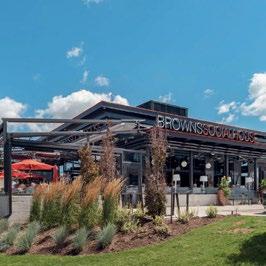
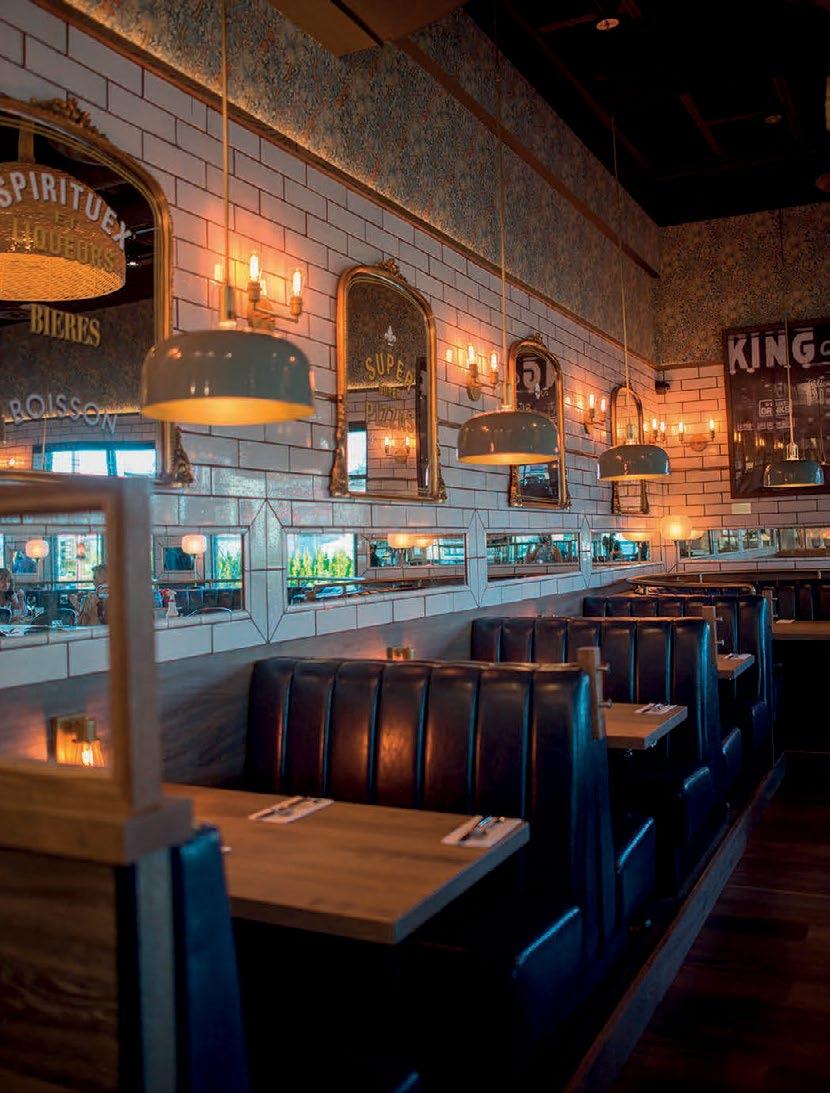




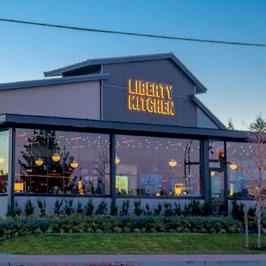
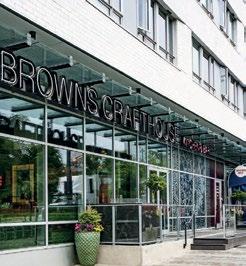

History, Plans - established in 1953 in Lakewood, Calif.
- 75 units in Canada;
Franchise Costs
- initial franchise fee $40,000 - total costs $1,300,000 to $2,500,000 - advertising fee 3% - royalty fee 5%
Services - advertising/marketing - design - lease negotiations - purchasing - site location - staff training - supplies
DIXIE LEE FRIED CHICKEN
DIXIE LEE CAPITAL CORPORATION
60 Tuxedo Crt, Scarborough ON M1G 3S3
President: Maria Struik
History, Plans - established in 1964 in Belleville, Ont. - 40+ locations in Canada
Franchise Costs - initial franchise fee $36,000 - advertising fee 5% - royalty fee 4%
Services - advertising/marketing - design - lease negotiation - management - purchasing - site location
DRUXY’S DRUXY’S INC.
52 Abbotsford Rd.
Gormley, ON L4A 2C1
VP, Marketing: Peter Druxerman
History, Plans - established in 1976 in Toronto - 44 units in Canada (all franchised)
Franchise Costs
- initial franchise fee $30,000
- total cost $175,000 to $225,000 (full size café)
- advertising fee 1% - royalty fee 6.5%
Services - advertising/marketing - design - franchisee/staff training - intranet and regional director support - lease negotiation - purchasing - site location
199 Four Valley Dr.
Vaughan, ON L4K 0B8
Director, Franchising:
Jonathan Young
History, Plans - established in 1987 - 62 units in Canada (59 franchised)
Franchise Costs
- initial franchise fee: $60,000
- average investment: $1,400,000 to $1,600,000
- advertising fee: 3% national; 1% local
- royalty fee: 5%
Services
- advertising/marketing
- design
- financial assistance
- lease negotiation
- management
- purchasing - site location - staff training - supplies
6807 Railway St. S.E. Ste. 310
Calgary, AB T2H 2V6
VP, Operations, Franchising: Terry Foster
History, Plans
- established in 1979 in Calgary - approximately 160 units in Canada
Franchise Costs
- initial franchise fee $35,000
- initial investment $400,000 to $550,000
- advertising fee 3%
- royalty fee 6%
Services
- information available upon request
77 Progress Ave.
Toronto, On M1P 2Y7
Director of Franchising and Real-Estate Development: Tariq El-Noqrashy
History, Plans
- established In 2008 in Toronto
- 51 units in Canada
- five units under development
Franchise Costs
- initial franchise fee $35,000
- training fee $5,000
- architectural drawings $20,000
- leasehold improvements $350,000
- signage & interior art fee $23,000
- equipment, smallwares & furniture $140,000
- advertising fee 3%
- royalty fee 5%
Services
- advertising/marketing
- design/construction
- financial assistance
- lease negotiation
- purchasing
- site location
- staff training
EGGSPECTATION CANADA
7960 St. Denis St., 2nd Fl. Montreal, QC H2R 2G1
President & COO: Jon Hinkle
History, Plans
- established in 1993 in Montreal - 13 locations in Canada
Franchise Costs
- initial franchise fee $50,000
- total cost varies
- advertising fee 2%
- royalty fee 5%
- local marketing 1%
Services
- advertising/marketing - design
- lease negotiation
- management
- purchasing
- site location
- staff training - supplies
MTY
INC.
8150 Trans-Canada Hwy., Ste. 200
St-Laurent, QC H4S 1M5
COO: Jason Brading
History, Plans
- established in 1997 in Waterloo, Ont.
Franchise Costs
- initial franchise fee $25,000
- initial Investment $249,000 to $446,000
- advertising fee 3%
- royalty fee 6%
Services
- advertising/marketing - construction and equipment
- design & drawings - lease negotiation
- ongoing management support - purchasing - site location - supplies - training/support

1901 Rosser Ave., Ste. 401 Burnaby, BC V5C 6S3
History, Plans
- founded in 2007 in Edmonton - 27 units in Canada
Franchise Costs
- initial investment $350,000 to $700,000
- marketing fee 2% - royalty fee 6%
Services
- advertising/marketing - design - lease negotiation
- management - purchasing - site location - staff training - supplies
*Pleasenotethattheprovidedfranchiseinvestmentrangeisanestimate,andtheactualcostcanvarybasedonseveralfactors,includinglocation, unitsize,andlocalmarketconditions.Foracompleteunderstandingofthecostsandfees,pleaserefertoourFranchiseDisclosureDocument.

MBI BRANDS INC.
100 Renfrew Dr., Ste. 200 Markham, ON L3R 9W7 franchising@marybrowns.com
History, Plans
- approximately 90 units in Canada
Franchise Costs
- build cost: $375,000 to $450,000 - $150,000 available in unencumbered cash with the ability to finance the remainder
- franchise fee: $25,000
- royalty fee: 8%
- advertising fee: 2%
Services
- operational support - coaching - training
- marketing/accounting - construction - real estate/procurement

FATBURGER
FATBURGER - CANADA
401-1901 Rosser Ave. Burnaby, BC V5C 6S3
History, Plans
- founded in 1952 in Los Angeles, Calif.; first Canadian location opened in Vancouver in 2005 - 70 units in Canada
Franchise Costs
- initial franchise fee $50,000
- total required investment $650,000 to $700,000
- marketing fee 3%
- royalty fee 6%
Services
- advertising/marketing - design - lease negotiation - purchasing - site location - staff training - supplies
10560-114 St.
Edmonton, AB T5H 3J7
History, Plans
- founded in 1995 in Edmonton - 17 units in Canada
Franchise Costs
- initial franchise fee $15,000 - minimum cash required $150,000 - total average investment $85,000 to $110,000
- royalty fee 5%
- advertising fee 2%
Services
- central purchasing - complete turnkey package - development and design - field support - inspection system - lease negotiation - management training - quality assurance - quality control - staff training - technical services
FETA & OLIVES
FETA & OLIVES
MEDITERRANEAN GRILL
1 Palace Pier Ct., Ste. 809
Toronto, ON M8V 3W9
President & CEO: Vicki Vasiliou
History, Plans
- established in 2006 in Barrie, Ont.
- 13 units in Canada (all franchised)
- opportunities available in Ont., Que., N.S., B.C. and Alta.
Franchise Costs
- information available upon request
Services
- information available upon request

FIREHOUSE SUBS
FIREHOUSE SUBS OF CANADA, LTD
130 King St. W., Ste. 300
Toronto, ON M5X 2A2
General Manager, Canada: Sam Gallant
History, Plans
- established 1994 in Jacksonville, Fla.
- established in Canada in 2015 (Oshawa, ON)
- more than 1,210 total units in the U.S., Puerto Rico and Canada
- 63 units in Canada, 1,203 international properties
- continuing global expansion through 2024
Franchise Costs
- initial franchise fee: $30,000
- system advertising fee: 1%
- royalty fee: 6%
- local advertising Fee: 2%
Services
- advertising/marketing
- purchasing
- site location
- staff training
- supplies
- other
FIRKIN CAPITAL CORP.
20 Steelcase Rd. W., Unit 1C
Markham, ON L3t 1B2
Vice-President: Paul Saraiva
History, Plans
- established in 1987 in Toronto
- 21 units in Canada
Franchise Costs
- initial franchise fee $30,000
- total cost $450,000 to $1,200,000
- advertising fee 1%
- royalty fee 5%
Services
- advertising/marketing
- design
- lease negotiation
- management
- purchasing
- site location
- staff training
- supplies
576 Danforth Ave., Toronto, ON M4K 1R1
President: Ian Sorbie
*Pleasenotethattheprovidedfranchiseinvestmentrangeisanestimate,andtheactualcostcanvarybasedonseveralfactors,includinglocation, unitsize,andlocalmarketconditions.Foracompleteunderstandingofthecostsandfees,pleaserefertoourFranchiseDisclosureDocument.
History, Plans
- new fast-casual/ quick-service concept based on the IL FORNELLO model
- plans to open franchised two locations in 2022 and four in 2023
Franchise Costs
- franchise fee $35,000 (we may want to decrease to $25k or $30k for Presto)
- equipment costs $80,000 to $140,000
- turnkey costs $250,000 to $600,000
- advertising fee 1%
- royalty fee 4%
Services
- advertising/marketing
- design
- lease negotiation
- management
- operational support
- purchasing
- site location
- social media
- staff training
- supplies
THE PEGASUS GROUP
44 Upjohn Rd.
Toronto, ON M3B 2W1
History, Plans
- established 2018 in Toronto
- one unit in Canada
- seeking franchise partners across Canada and internationally
Franchise Costs
- initial franchise fee $40,000
- royalty fee 4%
- advertising fee 1.5%
- estimated total costs $520,000 to $1,700,00
Services
- accounting services (by request, billable service, not included in fees)
- advertising/marketing
- design
- lease negotiation
- management
- purchasing
- site location
- staff training

THE PEGASUS GROUP
44 Upjohn Rd.
Toronto, ON M3B 2W1
History, Plans - established in 1989 in Toronto - 12 units in Canada
Franchise Costs
- initial franchise fee $40,000 - estimated total costs $520,000 to $1,700,00
Services
- accounting services (by request, billable service, not included in fees)
- advertising/marketing - design - lease negotiation - management - purchasing - site location - staff training
105 Walker St.
Truro, NS B2N 5G9
President: Don Moore
History, Plans
- founded in 2013 in Truro, N.S. - 14 units in Canada
- plans to expand in Atlantic Canada, Ontario and Western Canada; clip-on concept also available
Franchise Costs
- initial franchise fee $20,000 - equipment/site cost $22,085 to $43,085
- total costs $39,985 to $60,985 - advertising fee 4% - royalty fee 5%
Services - advertising/marketing - design - lease-negotiation advice - management training - purchasing - site-location training and support
URBAN DINING GROUP INC.
41 Industrial St., Unit 204
Toronto, ON M4G 0C7
President: Todd Sherman
History, Plans
- established in 1989 in Toronto - 16 units in Canada (8 franchised)
- two units set to open in 2022
- plans to convert restaurants that have closed due to COVID-19 to Gabby’s brand
Franchise Costs
- initial franchise fee $25,000 - equipment/site cost $375,000
- other costs $475,000
- total costs $875,000
- advertising fee flat fee - royalty fee flat fee
Services
- advertising/marketing - design - lease negotiation - management - purchasing - site location
- staff training - supplies
MTY FRANCHISING INC.
8150 Trans-Canada Hwy., Ste. 200
St-Laurent, QC H4S 1M5
COO of Fast Casual: Marc Benzacar
History, Plans
- more than 35 years in business - three locations in Canada
Franchise Costs
- investment $750,000
- down payment 30% of project
- advertising fee 2%
- royalty fee 5%
Services
- advertising/marketing
- construction and equipment
- design & drawings
- lease negotiation
- ongoing management support
- purchasing - site location - supplies - training/support

GOOD EARTH CAFES LTD.
4020 7th St. S.E.
Calgary, AB T2G 2Y8
403-294-9330
Founders: Nan Eskenazi & Michael Going
President & COO: Gerry Docherty
Director of Operations: Cristy Laing
History, Plans
- established 1991 in Calgary
- 65 units in Canada
- plans to expand in markets across Canada in 2024
Franchise Costs
- initial franchise fee $35,000
- site costs $395,000 to $595,000
- marketing fee 3%
- royalty fee 7%
Services
- commissioning support
- design/construction
- field support
- lease negotiation
- marketing
- product development
- site selection
- staff training
- supply chain management
(THE) GREAT CANADIAN BAGEL
P.O. Box 43160, RPO Mavis Rd.
Mississauga,, ON L5B 4A7
President: Ed Kwiatkowski
History, Plans
- established in 1993 in Toronto - 18 units in Canada
Franchise Costs
- initial franchise fee full $20, 000 to $30,000
- equipment/site cost (full production) $300,000 to $350,000
- non-production fee $85,000 to $175,000
- advertising fee 1.5%
- royalty fee 6%
Services
- advertising/marketing
- design
- lease negotiation
- management
- purchasing
- site location
- staff training
- supplies
- other
GRINNERS FOOD SYSTEMS LTD.
105 Walker St.
Truro, NS B2N 5G9
History, Plans
- established in 1977 in Moncton, N.B.
- 100+ units in Canada
- plans to expand in Nova Scotia, New Brunswick, P.E.I. and Newfoundland
Franchise Costs
- initial franchise fee $20,000
- equipment/site cost $85,000 to $105,000
- other costs $79,500 to $108,500
- total costs $184,500 to $233,500
- advertising fee 4%
- royalty fee 5%
Services
- advertising/marketing
- design
- lease negotiation advice
- management training
- purchasing
- site location training and support
310-9300 Trans Canada
Montreal, QC, H4S 1K5
CEO: Peter Mammas
History, Plans
- established in 2018
- three franchised units in Canada, two corporate units
Franchise Costs
- initial franchise fee $30,000
- project cost $500,000 to $800,000
Services
- advertising/marketing
- design
- financial assistance
- lease negotiation
- management
*Pleasenotethattheprovidedfranchiseinvestmentrangeisanestimate,andtheactualcostcanvarybasedonseveralfactors,includinglocation, unitsize,andlocalmarketconditions.Foracompleteunderstandingofthecostsandfees,pleaserefertoourFranchiseDisclosureDocument.

- purchasing - site location
- staff training - supplies
199 Four Valley Dr.
Vaughan, ON L4K 0B8
Director, Franchising: Jonathan Young
History, Plans
- established 1959 in Ontario - 285 units in Canada (273 franchised)
Franchise Costs
- initial franchise fee: $25,000
- total costs: $600,000 to $1,000,000
- advertising fee: 4% national; 1% local - royalty fee: 5%
Services
- advertising/marketing - design - financial assistance - lease negotiation - management - purchasing - site location - staff training - supplies
ANGUS INC.
78 Signet Dr., Ste. 201
Toronto, ON M9L 1T2
President: John Lettieri
History, Plans
- established in 2003 in Toronto - 50 units in Canada; one outside Canada - System wide 50 locations including HERO VK. 28,000,000
Franchise Costs
- equipment/site cost $160,000 - other costs $140,000
- total costs $275,000 to $300,000
- advertising fee 2% - royalty fee 6%
Services - advertising/marketing - design - lease negotiation - management - purchasing - site location
- staff training - supplies
K2 GROUP
2700 Matheson Blvd E., Mississauga, ON L4W 5M2
Thomas Jacob, Managing Director
History, Plans
- established 2017 - four units in Canada
- two new units planned for 2024
Franchise Costs
- advertising fee 3% of gross sales - royalty fee 5.5% of gross sales - brand fee 1% of gross sales
Services
- advertising/marketing - design
- financial assistance - lease negotiation - purchasing - site location - staff training
IL FORNELLO
IL FORNELLO RESTAURANTS
576 Danforth Ave., Toronto, ON M4K 1R1
President: Ian Sorbie
History, Plans
- established in 1986
- six units in Ontario (four franchised)
- plans to open franchised two locations in 2022 and four in 2023
Franchise Costs
- franchise fee $35,000 - equipment costs $100,000 to $160,000
- turnkey costs $350,000 to $800,000
- advertising fee 1% - royalty fee 4%
Services
- advertising/marketing - design - lease negotiation
- management
- operational support
- purchasing
- site location
- social media
- staff training
- supplies
1 First Canadian Pl.
100 King St. W., P.O. Box 334
Toronto, ON M5X 1E1
President: Jim Antonopoulos
History, Plans
- established in 1985 in Toronto
- 55 units in Canada (54 franchised)
- continued expansion planned for Ontario
Franchise Costs
- initial franchise fee $40,000 - equipment/site cost available upon request
- advertising fee 2%
- royalty fee 5%
Services
- advertising/marketing
- design
- lease negotiation
- site location
- staff training
JOEY’S FRANCHISE GROUP
3048 9th St. S.E.
Calgary, AB T2G 3B9
Vice-President: Max Gagnon
History, Plans
- established 1985 in Calgary
- 67 units in Canada (66 franchised)
- 15+ projected openings in 2023
Franchise Costs
- initial franchise fee: $35,000
- equipment/site cost: $182,000 to $385,000
- advertising fee: 3%
- royalty fee: 5% of net sales
Services
- advertising/marketing
- design
- lease negotiation
- management
- purchasing
- site location
- staff training
- supplies
- other
*Pleasenotethattheprovidedfranchiseinvestmentrangeisanestimate,andtheactualcostcanvarybasedonseveralfactors,includinglocation, unitsize,andlocalmarketconditions.Foracompleteunderstandingofthecostsandfees,pleaserefertoourFranchiseDisclosureDocument.
8150 Trans-Canada Hwy., Ste. 200 St-Laurent, QC H4S 1M5
COO of Fast Casual: Marc Benzacar
History, Plans
- founded in 1998 in Calgary
- more than 100 units in Canada;
Franchise Costs
- initial franchise fee $30,000
- initial Investment $225,000 to $350,000
- marketing fee 4%
- royalty fee 6%
Services
- advertising/marketing
- construction and equipment
- design & drawings
- lease negotiation
- ongoing management support
- purchasing - site location - supplies - training/support
657 Topsail Rd.
St. John’s, NL A1E 2E3
Partners: Stephen Pike; Barry Walsh; Sean Brake
History, Plans
- founded in 1991 in St. John’s - 24 units in Canada (all franchised)
- plans to add one to two stores per year during the next two years
Franchise Costs
- equipment/site cost $600,000 to $750,000
- advertising fee 2%
- royalty fee 4%
Services
- advertising/marketing
- design - lease negotiation
- purchasing - site location - staff training

& BAR
RECIPE UNLIMITED CORPORATION
10100 Shellbridge Way
Richmond, BC V6X 2W7
SVP, Franchising, Buster Edwards
History, Plans
- established 1971 in North Vancouver, B.C.
- 97 units in Canada (55 franchised); eight units in the U.S. (one franchised)
Franchise Costs
- initial franchise fee: $75,000 - equipment/site cost: $5,000,000 to $7,000,000
- marketing fee: 2%
- royalty fee: 6%
Services - advertising/marketing - design - lease negotiation - purchasing - site location - staff training
KELSEYS
RECIPE UNLIMITED CORPORATION
199 Four Valley Dr. Vaughan, ON L4K 0B8
Director, Franchising: Jonathan Young
History, Plans - established 1978 in Ontario - 67 units in Canada (62 franchised)
Franchise Costs
- initial franchise fee: $60,000 - total costs: $1,500,000 to $1,700,000
- advertising fee: 3%
- royalty fee: 5%
Services
- advertising/marketing - design - financial assistance - lease negotiation - management - purchasing - site location - staff training -supplies
191 Creditview Rd., Ste. 100
Vaughan, ON L4L 9T1
Sr. Development Manager: Jeremy Alexander
History, Plans
- established 1952 in Salt Lake City, Utah
- 640 units in Canada; 22,600 outside Canada
- expects to increase Canadian store count to 800 in the medium term
Franchise Costs
- initial franchise fee US$52,000 - equipment/site cost available upon request - advertising fee 5% - royalty fee 6%
Services
- advertising/marketing - design - management - purchasing - site location - staff training - supplies
MTY FRANCHISING INC.
8150 Trans-Canada Hwy., STE. 200
St-laurent, QC H4S 1M5
COO: Jason Brading
History, Plans - founded in 2007
Franchise costs
- initial franchise fee $35,000
- initial investment: $275,000 to $350,000
- advertising fee 2% - royalty fee 6%
Services - advertising/marketing - construction and equipment - design & drawings
- lease negotiation
- ongoing management support - purchasing
- site location - supplies - training/support
MTY FRANCHISING INC.
8150 Trans-Canada Hwy., Ste. 200
St-Laurent, QC H4S 1M5
COO: Jason Brading
History, Plans
- founded in 2004
Franchise Costs
- initial franchise fee $35,000
- initial Investment: $450,000 to $550,000
- advertising fee 2% - royalty fee 6%
Services
-advertising/marketing
- construction and equipment
- design & drawings - lease negotiation
- ongoing management support
- purchasing
- site location
- supplies
- training/support
8150 Trans-Canada Hwy., Ste. 200
St-Laurent, QC H4S 1M5
COO: Jason Brading
History, Plans
- founded in 1985
- 10 units in Canada (all franchised)
Franchise Costs
- initial franchise fee $35,000
- initial Investment: $375,000 to $563,000
- advertising fee 2%
- royalty fee 6% to 7%
Services
-advertising/marketing
- construction and equipment - design & drawings - lease negotiation
- ongoing management support
- purchasing
- site location
- supplies
- training/support
KUTO*
MTY FRANCHISING INC.
8150 Trans-Canada Hwy., Ste. 200
St-Laurent, QC H4S 1M5
COO of Fast Casual: Marc Benzacar
History, Plans
- founded in 2016
- 35 units in Canada
Franchise Costs
- basic investment $250,000 to $$325,000
- down payment 40%
- franchise fee $25,000
- advertising fund 1%
- royalty fee 5%
Services
- advertising/marketing
- construction and equipment
- design & drawings
- lease negotiation
- ongoing management support
- purchasing
- site location
- supplies
- training/support
310-9300 Trans Canada
Montreal, QC, H4S 1K5
CEO: Peter Mammas
History, Plans
- established in 2012 in Montreal
- franchising since 2014
- 16 franchised units in Canada; one corporate
Franchise Costs
- initial franchise fee $40,000
- total $1,800,000 to $2,200,000
Services
- advertising/marketing
- design - lease negotiation
- management - purchasing - site location
- staff training - supplies
SPORTSCENE GROUP INC.
1180 Place Nobel, Ste. 102
Boucherville, QC J4B 5L2
President: Jean Bédard
History, Plans - established 1984 in Montreal - 38 units in Canada (12 franchised)
*Pleasenotethattheprovidedfranchiseinvestmentrangeisanestimate,andtheactualcostcanvarybasedonseveralfactors,includinglocation, unitsize,andlocalmarketconditions.Foracompleteunderstandingofthecostsandfees,pleaserefertoourFranchiseDisclosureDocument.

Franchise Costs
- initial franchise fee $75,000
- equipment/site cost $2,400,000 - other costs $25,000
- total costs $2,400,000
- advertising fee national 3% - royalty fee 5%
Services
- advertising/marketing - design - lease negotiation - management - purchasing - site location - staff training
PEGASUS GROUP
44 Upjohn Rd. Toronto, ON M3B 2W1 terry@pegasusgroup.
History, Plans
- established 2011 in Toronto; franchising since 2015 - six units in Canada (five franchised); two units outside of Canada
Franchise Costs
- initial franchise fee $40,000 - advertising fee 1.5%
- royalty fee 5%
- estimated total costs $500,000 to $1,700,000
Services
- accounting service (by request, billable service not included in fees)
- advertising/marketing - design - lease negotiation - management - purchasing - site location - staff training
FOODTASTIC
310-9300 Trans Canada
Montreal, QC, H4S 1K5
CEO: Peter Mammas
History, Plans
- established in 2013 in Montreal - four franchised units in Canada
Franchise costs - franchise fee $35,000
- projected cost $800,000 to $1,000,000
Services
- advertising/marketing - design - financial assistance - management - purchasing - site location - staff training - supplies
MTY FRANCHISING INC.
8150 Trans-Canada Hwy., Ste. 200 St-Laurent, QC H4S 1M5
COO of Fast Casual: Marc Benzacar
History, Plans - established in 1979
Franchise Costs
- initial franchise fee $30,000 (QC), $35,000 (rest of Canada)
- initial investment 30%
- royalty fee 5%
- Advertising fee 2%
Services
-advertising/marketing
- construction and equipment
- design & drawings
- lease negotiation
- ongoing management support
- purchasing - site location - supplies - training/support
MTY FRANCHISING INC.
8150 Trans-Canada Hwy., Ste. 200
St-Laurent, QC H4S 1M5
COO of Fast Casual: Marc Benzacar
History, Plans - established in 2014 in Montreal
Franchise Costs
- initial franchise fee $25,000 (five-year agreement)
- equipment & furniture $90,000 to $130,000
- leasehold improvements $60,000 to $150,000
- advertising fee 2.5%
- royalty fee 6%
Services
- advertising/marketing
- construction and equipment
- design & drawings
- lease negotiation
- ongoing management support
- purchasing
- site location
- supplies
- training/support
LA PREP
4500 Dixie Rd, Mississauga, Ontario L4W 1V7
CEO: John Essaris
VP of Franchise Development: John Beauparlant
History, Plans
- established in 2010 in Montreal
- 55 units in Canada
- expansion planned in Canada and U.S.
Franchise Costs
- initial franchise fee $35,000
- total cost $450,000 to $650,000
- advertising fee 2%
- royalty fee 6%
Services
- advertising/marketing
- design
- financial assistance
- lease negotiation
- management
- purchasing - site location
- staff training
- supplies
310-9300 Trans Canada
Montreal, QC, H4S 1K5
VP Franchising: George Trichas
History, Plans
- established in Montreal - seven units in Canada (six franchised)
Franchise Costs
- franchise fee $30,000
- projected cost $500,000 to $800,000
- advertising fee 2%
- royalty fee 5%
*Pleasenotethattheprovidedfranchiseinvestmentrangeisanestimate,andtheactualcostcanvarybasedonseveralfactors,includinglocation, unitsize,andlocalmarketconditions.Foracompleteunderstandingofthecostsandfees,pleaserefertoourFranchiseDisclosureDocument.
Services
- advertising/marketing
- design
- financial assistance
- management
- purchasing
- site location
- staff training
- supplies
3540 W. 41st Ave., Ste. 207a
Vancouver, BC V6N 3E6
EVP - Business Development: Bruce Fox
History, Plans
- four locations in operation (all franchised) (two in B.C., two in Saskatchewan)
- two additional sites in development
Franchise Costs
- initial franchise fee: $50,000
- equipment/site costs: $2,500,000
- other costs: $450,000
- total costs: $3,000,000
- royalty fee: 6% (all in)
- no marketing/co-op fees
Services
- culinary development
- lease negotiation
- opening support
- operational reviews and field support
- POS and payment platforms
- purchasing
- site selection
- supplies
LITTLE CAESAR OF CANADA ULC
2301 Royal Windsor Dr. Mississauga, ON L5J 1K5
905-822-7899
Director of Real Estate & Franchise Development: James Jenkins
History, Plans
- established 1959 in Garden City, Mich.
- 200 units worldwide
- opportunities available across Canada
Franchise Costs
- initial franchise fee $20,000, and $15,000 per unit thereafter
- royalty fee 6%

Services - advertising/marketing - design - lease negotiation - supplies
MTY GROUP
200, 8150 Trans-Canada Hwy. Saint-Laurent, QC H4S 1M5
COO of Fast Casual: Marc Benzacar
History, Plans - established in 2006 in Dollard des Ormeaux, Que.
Franchise Costs
- re-model $250,000
- new model $1,000,000 - downpayment 30% of project - advertising fee 2% - royalty fee 5%
Services -advertising/marketing - construction and equipment - design & drawings - lease negotiation - ongoing management support - purchasing - site location - supplies - training/support
MTY FRANCHISING INC.
8150 Trans-Canada Hwy., Ste. 200 St-Laurent, QC H4S 1M5
COO: Jason Brading
History, Plans - established in 1990
Franchise Costs
- franchise fee $35,000
- initial investment $450,000 to $600,000 - royalty fee 7% - marketing fee 2%
Services -advertising/marketing - construction and equipment - design & drawings - lease negotiation
- ongoing management support - purchasing - site location - supplies - training/support
RESTAURANT
FRANCHISE CORPORATION
8 Clipper Ct. Brampton, ON L6W 4T9
COO: Tina Chiu
History, Plans
- established in 1979 in Brampton, Ont. - 29 units in Canada (28 franchised)
Franchise Costs
- initial franchise fee $300,000 - equipment/site cost $1,500,000 - other costs $1,200,000
- total costs $3,000,000
- advertising fee $10,000
- royalty fee $25,000
Services - advertising/marketing - design - lease negotiation - management - purchasing - site location - staff training - supplies - other
MBI BRANDS INC.
100 Renfrew Dr., Ste. 200 Markham, ON L3R 9W7
History, Plans - established in 1969 in St. John’s, NL - 250+ units in Canada - projected to open 30 stores in 2024
Franchise Costs
- initial franchisee fee: $30,000
- equipment/site cost: $750,000 to $850,000
- total cost: $850K+
- advertising fee: 4%
- royalty fee: 5%
Services
- advertising/marketing
- design/construction
- operations/marketing support
- lease negotiation
- management/staff training
- purchasing/supply chain
- site location
1 McDonald’s Pl.
Toronto, ON M3C 3L4
Franchising Manager: Tom Marlow
History, Plans
- established 1967 in Richmond, B.C. - 1,355 units in Canada
Franchise Costs
- information available upon request
Services
- advertising/marketing
- design
- lease negotiation
- purchasing
- site location
- staff training
- supplies
259 Yorkland Rd., 3rd Fl.
Toronto, ON M2J 5B2
President: David Shneer
History, Plans
- established in 2010 in Toronto - 58 units in Canada; 300+ outside of Canada
- plans to expand throughout Maritime provinces
Franchise Costs
- initial franchise fee $40,000
- equipment cost $140,000
- site cost/construction $150,000
- total costs $300,000 to $350,000
- advertising fee 2%
- royalty fee 6%
Services
- advertising/marketing
- design
- lease negotiation
- management
- purchasing
- site location
- staff training - supplies
2465 Appleby Line, Unit D 1-A
Burlington, ON L97 0B6
Owners: George Heos & Alex Gerzon info@mightybird.ca
History, Plans
- established in Halifax in 1990 - 22 units in Canada, one international unit
- franchises now available in Atlantic Canada, Ontario, Alberta and Northeast U.S.
Franchise Costs
- Franchise fees $35,000
- Construction, equipment, startup $500,000 (80% financing available)
Services
- advertising/marketing - design - lease negotiation
- management
- purchasing - site location
- staff training - supplies
THREECAF BRANDS CANADA INC.
55 Administration Rd., Unit 37
Vaughan, ON L4K 4G9
Director of Operations: Ian McDougall
History, Plans
- established in 1979 in Toronto - five units in Canada (four franchised)
Franchise Costs
- initial franchise fee $40,000
- total costs $450,000 to $775,000
- advertising fee 2%
- royalty fee 7%
Services - advertising/marketing - design - lease negotiation - purchasing - site location
*Pleasenotethattheprovidedfranchiseinvestmentrangeisanestimate,andtheactualcostcanvarybasedonseveralfactors,includinglocation, unitsize,andlocalmarketconditions.Foracompleteunderstandingofthecostsandfees,pleaserefertoourFranchiseDisclosureDocument.

2465 Appleby Line, Unit D 1-A
Burlington, ON L97 0B6
Owners: George Heos & Alex Gerzon
History, Plans - two unit in Canada
- development opportunities available across Canada
Franchise Costs
- total investment: $550,000 to $650,000
- cash investment required: $165,000 to $195,000
- franchise fee: $40,000
Services - financing assistance - training and ongoing support - construction - real-estate selection and lease negotiation - marketing/advertising - supply chain - quality assurance
310-9300 Trans Canada
Montreal, QC, H4S 1K5
CEO: Peter Mammas
History, Plans - established 1989 In B.C.
- franchising since 1991 - 42 units in Canada (39 franchised) - three corporate units
Franchise Costs
- initial franchise fee $40,000
- total costs $2,000,000 to $3,000,000
Services - advertising/marketing - design - financial assistance - lease negotiation - management - purchasing - site location - staff training - supplies
MONTANA’S RECIPE UNLIMITED CORPORATION
199 Four Valley Dr.
Vaughan, ON L4k 0b8
Director, Franchising: Jonathan Young
History, Plans - established in 1995 in Ontario - 95 units in Canada (84 franchised)
Franchise Costs
- initial franchise fee: $60,000
- total costs: $1,600,000 to $1,800,000
- advertising fee: 3% - royalty fee: 5%
Services - advertising/marketing - design - financial assistance - lease negotiation - management - purchasing - site location - staff training - supplies
MONZA FOODTASTIC 310-9300 Trans Canada
Montreal,QC, H4S 1K5
CEO: Peter Mammas
History, Plans - established in 2009 in Montreal -franchising since 2018 - nine units in Canada (one corporate)
Franchise Costs
- franchise fee $40,000
- project cost $1,600,000 to $2,200,000
Services
- advertising/marketing - design - financial assistance - management - purchasing - site location - staff training - supplies
Becae li fe h to be e njoyed!
MR. GREEK RESTAURANTS INC.
44 Upjohn Rd.
Toronto, ON M3B 2W1
President & CEO: George Raios
History, Plans
- established 1988 in Toronto - 15 units in Canada
- four new units planned in 2022 in Ontario
- plans to expand in Ontario
Franchise Costs
- initial franchise fee $35,000
- start-up capital required $150,000
- total investment $300,000 (retro) to $400,000+ (new)
- advertising fee 2%
- royalty fee 5%
Services
- administrative support
- advertising/marketing
- design - construction (turn key)
- lease negotiation
- location
- menu development
- purchasing
- training
MR. MIKES RESTAURANT CORPORATION
RAMMP HOSPITALITY BRANDS INC.
3700 N. Fraser Way, Ste. 100
Burnaby, BC V5J 5H4
President & COO: Tony Zidar
History, Plans
- established 1960 in Vancouver
- 46 units in Canada
Franchise Costs
- initial franchise fee $50,000
- total investment $1,700,000 to $1,900,00
- advertising fee 2%
- royalty fee 6%
Services
- advertising/marketing
- design - lease negotiation
- management
- purchasing
- site location
- staff training
- supplies
- other
MR. SOUVLAKI*
MTY FRANCHISING INC.
8150 Trans-Canada Hwy., Ste. 200
St-Laurent, QC H4S 1M5
COO: Jason Brading
*Pleasenotethattheprovidedfranchiseinvestmentrangeisanestimate,andtheactualcostcanvarybasedonseveralfactors,includinglocation, unitsize,andlocalmarketconditions.Foracompleteunderstandingofthecostsandfees,pleaserefertoourFranchiseDisclosureDocument.
History, Plans - founded in 1997
- 20 units in Canada
Franchise Costs
- initial franchise fee $35,000
- initial Investment: $350,000 to $450,000
- advertising fee 3%
- royalty fee 6%
Services
-advertising/marketing
- construction and equipment
- design & drawings
- lease negotiation
- ongoing management support - purchasing - site location
- supplies - training/support
MR. SUB*
MTY FRANCHISING INC.
8150 Trans-Canada Hwy., Ste. 200
St-Laurent, QC H4S 1M5
COO: Jason Brading
History, Plans - founded in 1968
- more than 230 units in Canada
Franchise Costs
- initial franchise fee $30,000
- initial Investment: $350,000 to $400,000
- advertising fee 3%
- royalty fee 6%
Services
- advertising/marketing
- construction and equipment
- design & drawings - lease negotiation
- ongoing management support - purchasing - site location - supplies - training/support
MUCHO BURRITO*
MTY FRANCHISING INC.
8150 Trans-Canada Hwy., Ste. 200
St-Laurent, QC H4S 1M5
COO: Jason Brading
History, Plans - established 2006 in Mississauga,Ont.

Franchise Costs
- initial franchise fee $35,000
- initial Investment $475,000 to $550,000
- advertising fee 4% - royalty fee 6%
Services
- advertising/marketing - construction and equipment - design & drawings - lease negotiation - ongoing management support - purchasing - site location - supplies - training/support
MUFFIN PLUS*
MTY FRANCHISING INC.
8150 Trans-Canada Hwy., Ste. 200
St-Laurent, QC H4S 1M5
COO of Fast Casual: Marc Benzacar
History, Plans - established in 1982 in Montreal
Franchise Costs
- estimated project cost $275,000 to $325,000
- initial franchise fee $30,000
- advertising fee 2% - royalty fee 6%
Services - advertising/marketing - construction and equipment - design & drawings - lease negotiation - ongoing management support - purchasing - site location - supplies - training/support
NEW ORLEANS PIZZA
CHAIRMAN’S BRANDS CORP.
77 Progress Ave.
Toronto, ON M1P 2Y7
Director of Franchising and Real-Estate Development:
Tariq El-Noqrashy
History, Plans - established 1978 In Waterloo, Ont. - 35 units in Canada
Franchise Costs
- initial franchise fee $30,000
- training fee $5,000
- architectural drawings $15,000
- signage fee $11,500
- leasehold improvements $165,000 - equipment $100,000
- advertising fee 3 %
- royalty fee 5%
Services
- advertising/marketing
- design/construction - financial assistance
- lease negotiation - purchasing - site location - staff training
NEW YORK FRIES
RECIPE UNLIMITED CORPORATION
199 Four Valley Dr.
Vaughan, On L4k 0b8
Director, Franchising: Jonathan Young
History, Plans
- established 1983 in Toronto - 113 units in Canada; 12 outside of Canada (113 franchised)
Franchise Costs
- initial franchise fee: $30,000
- total costs: $450,000 to $650,000
- advertising fee: 2%
- royalty fee: 6%
Services
-advertising/marketing
-design -financial assistance
-lease negotiation -management -purchasing
-site location -staff training
-supplies
NICKELS DELICATESSEN
FOODTASTIC INC.
310-9300 Trans Canada
Montreal, QC, H4S 1K5
CEO: Peter Mammas
History, Plans
- established 1990 in Montreal
- franchising since 1991
- nine units in Canada
Franchise Costs
- franchise fee $25,000
-investment required $800,000 to $1,000,000
Services
- advertising/marketing
- design
- lease negotiation
- management
- purchasing
- site location
- staff training
- supplies
ODD BURGER
ODD BURGER CORPORATION
505 Consortium Court
London, ON N6E 2S8
Franchise Administrator: Sherrie Abrantes
History, Plans
- established in 2014 in London, Ont.
- 13 units in Canada
- six units under development in Canada
Franchise Costs
- franchise fee: $35,000
- equipment/site cost: $100,000 equipment; $300,000 to $400,000 leasehold improvements
- advertising fee: 2.5%
- royalty fee: 5%
Services
-advertising/marketing
-design
-financial assistance
-lease negotiation
-purchasing
-site location
-staff training
-technology
(THE) OLD SPAGHETTI FACTORY
OLD SPAGHETTI FACTORY
CANADA LTD.
55 Water St., Ste. 210
Vancouver, BC V6B 1A1
COO: Ken Lobson
History, Plans
- established 1970 in Vancouver
- 15 units in Canada
Franchise Costs
- information available upon request
- royalty fee 5%
- advertising fee 3%
Services
- marketing assistance
- opening assistance
- procurement
- research/development
- site approval
- staff training
- support and development
OPA! OF GREECE
OPA! SOUVLAKI FRANCHISE GROUP INC.
7235 Flint Rd. S.E.
Calgary, AB T2H 1G2
President, CEO: Dorrie Karras
History, Plans
- founded 1998 in Calgary
- 100+ units
Franchise Costs
Food Court
- initial franchise fee $25,000
- equipment cost $181,000 to $186,000
- leaseholds $235,000 to $259,000
- total investments $441,000 to $470,000
- advertising fee 3% of sales
- royalty fee 6% of sales
Street Front
- initial franchise fee $25,000
- equipment cost $205,000 to $231,000
- leaseholds $236,000 to $309,000
- total costs $466,000 to $565,000
- advertising fee 3% of sales
- royalty fee 6% of sales
Services
- advertising/marketing
- design
- lease negotiation
- management
- purchasing
- site location
- franchisee training
- ongoing operational support
- opportunity for multi-unit franchisee operation
ORIGINAL JOE’S
RESTAURANT & BAR
RECIPE UNLIMITED CORPORATION
199 Four Valley Dr.
Vaughan, ON L4K 0B8
Director, Franchising:
Jonathan Young
History, Plans
- established in 1997 in Calgary
- 52 units in Canada (34 franchised)
*Pleasenotethattheprovidedfranchiseinvestmentrangeisanestimate,andtheactualcostcanvarybasedonseveralfactors,includinglocation, unitsize,andlocalmarketconditions.Foracompleteunderstandingofthecostsandfees,pleaserefertoourFranchiseDisclosureDocument.

Franchise Costs
-initial franchise fee: $60,000
-total costs:$1,500,000 to $1,700,000 -advertising: 2% -royalty fee: 5%
Services
-advertising/marketing -design -financial assistance -lease negotiation -management -purchasing -site location -staff training -supplies
PANAGIO’S INC.
6085 Creditview Rd., Unit 17 Mississauga, ON L5B 0C5
History, Plans
- established in 2008 - four units in Canada - seeking franchisees for Ontariowide expansion
Franchise Costs
- initial franchise fee $30,000 - equipment/site cost $300,000 to $400,000
- advertising fee 2% - royalty fee 5%
Services
- advertising/marketing - business development - lease negotiation - opening assistance - pricing/quality controls - procurement - research/development - site selection - training
33149 Mill Lake Rd.
Abbotsford, BC V2S 2A4
History, Plans - established 1986 in Abbotsford, B.C. - 195 units in Canada (187 franchised)
Franchise Costs
- initial franchise fee $25,000 - total costs $625,000
- royalty fee 5% - advertising fee 5%
Services
- advertising/marketing - design - lease negotiation - purchasing - site location - staff training - supplies - other
PAPA MURPHY’S CANADA*
MTY FRANCHISING INC
8150 Trans-Canada Hwy., Ste. 200
St-Laurent, QC H4S 1M5
COO: Jason Brading
History, Plans - founded in 1981; in Canada since 2006
- 18 locations in Canada
Franchise Costs
- initial investment approx. $300,000
- initial franchise fee $35,000 for first store; $30,000 for second store; $25,000/additional store
- minimum liquid assets $80,000 Minimum net worth $250,000
- royalty fee 6% - advertising fee 3%
Services
-advertising/marketing
- construction and equipment
- design & drawings - lease negotiation
- ongoing management support - purchasing - site location - supplies - training/support
PARAMOUNT FINE FOODS
10 Four Seasons Pl., Ste. 601
Toronto, ON M9B 6H7
Franchise Coordinator: Magda Chelminska
History, Plans
- founded 2006
- 65 units globally
- plans to expand across Canada and internationally
Franchise Costs
- information available upon request
Services
- advertising/marketing
- lease negotiations
- regional operations support
- site selection
- supplies
- training
171 W. Esplanade, Ste. 300
North Vancouver, BC V7M 3K9
Director of Franchising: Ryan Picklyk
History, Plans
- established in 1988 in Korea; first franchised in the U.S. in 2015
- four units in Canada
- 10 Canadian units planned for 2024
Franchise Costs
- initial franchise fee $50,000
- total costs: $652,565 to $1,750,900
Services
- advertising/marketing
- design
- lease negotiation
- site location
- staff training
6075 Poplar Ave., Ste. 800
Memphis, TN 38119-4709
VP, Franchising: Dave Blouin
History, Plans
- established 1958 in Cincinnati, Ohio
- 16 units in Canada; 355 international
- seeking to expand in Alberta, B.C., Manitoba, Ontario, Quebec and Saskatchewan
Franchise Costs
- information available upon request
- advertising fee 3%
- local advertising commitment 0.5%
- royalty fee 4%
Services
- advertising/marketing
- design
- management
- purchasing
- site location
- staff training
*Pleasenotethattheprovidedfranchiseinvestmentrangeisanestimate,andtheactualcostcanvarybasedonseveralfactors,includinglocation, unitsize,andlocalmarketconditions.Foracompleteunderstandingofthecostsandfees,pleaserefertoourFranchiseDisclosureDocument.
PINKBERRY CANADA INC.
210 Shields Ct.
Markham, ON L3R 8V2
Chairman and CEO: Aaron Serruya
History, Plans
- established 2005 in Los Angeles - 87 units in Canada
Franchise Costs
- initial franchise fee US$45,000
- total costs US$150,000 to US$500,000
- advertising fee 3% of gross sales
- royalty fee 6% of gross sales
Services
- advertising/marketing - design - lease negotiation - management - purchasing - site location
- staff training - supplies
310-9300 Trans Canada
Montreal, QC, H4S 1K5
CEO: Peter Mammas
History, Plans
- established in 1995 in Kingston, Ont. - 232 franchised units in Canada
Franchise Costs
- initial franchise fee $30,000
- total investment $350,000 to $550,000
Services
- information available upon request
PIZZA PIZZA LIMITED
4949 51 St. S.E.
Calgary, AB T2B 3S7
SVP of Operations and Development: Philip Goudreau
History, Plans
- established in 1985 in Edmonton - 90 traditional units in Canada; 14 non-traditional locations
Joint Venture Costs
- initial partnership fee $50,000
- advertising fee 8%
- administration fee 3%

Services - accounting/finance
- call centre operations
- IT infrastructure
- operational support - payroll - real-estate development/renewals - training
MTY FRANCHISING INC
8150 Trans-Canada Hwy., Ste. 200
St-Laurent, QC H4S 1M5
COO of Fast Casual: Marc Benzacar
History, Plans - established 1968 in Shediac, N.B. - more than 70 franchised units in Canada
Franchise Costs
- initial franchise fee $35,000 (full service); $20,000 (takeout & delivery)
- total investment $450,000 to $900,000
- advertising fee 3% - royalty fee 6%
Services - advertising/marketing - construction and equipment - design & drawings - lease negotiation
- ongoing management support - purchasing - site location - supplies - training/support
PIZZA HUT
YUM! BRANDS INC.
191 Creditview Rd., Ste. 100
Vaughan, ON L4L 9T1
Director of Development: Marco Moretto
History, Plans - established 1958 in Wichita, Kan. - 419 units in Canada
Franchise Costs
- initial franchise fee US$24,200
- application fee CAD$12,000
- advertising fee 5%
- royalty fee 6%
Services
- advertising/marketing - design - site location - staff training
1260 Lawrence Ave. East Toronto, ON M3A 1C4
President: Domenic Primucci
Sr. Franchise Development Manager: John Consales
History, Plans
- established 1963 in Toronto
- 154 units in Canada (152 franchised) - continued expansion into key markets with plans to add up to 10 units
Franchise Costs
- franchise fee $20,000
- site cost $525,000 to $600,000
- total costs: $525,000 to $600,000
- advertising fee 4%
- royalty fee 6%
Services
- advertising/marketing - design - ease negotiation
- management
- purchasing - site location
- staff training - supplies - other
PIZZA PIZZA LIMITED
500 Kipling Ave.
Toronto, ON M8Z 5E5
VP of Franchising: Chuck Farrell
History, Plans - established 1967 in Toronto - 439 units in Canada (402 franchised)
- 189 non-traditional locations
- continued growth planned in B.C., Maritimes and Quebec
Franchise Costs
- initial franchise fee $30,000
- equipment/site cost $350,000 (depends on location; turnkey)
- advertising fee 6%
- royalty fee 6%
Services
- call centre operations
- financing assistance
- IT infrastructures
- marketing support
- operational support
- real-estate development
- training
PIZZAVILLE INC.
741 Rowntree Dairy Rd., Unit 1
Woodbridge, ON L4L 5T9
President and CEO: Angelo Contardi
History, Plans
-established in 1963 in Toronto
-90 units in Canada (all franchised)
Franchise Costs
- total costs: $500,000 to $600,000
- flat-fee advertising (weekly)
- flat royalty fee (weekly)
- more information available upon request
Services
- information available upon request
197 N Queen St.
Etobicoke, ON M9C 1A7
Owners: George Heos & Alex Gerzon
History, Plans
- four units in Canada
- development opportunities available across Canada
Franchise Costs
- total investment: $375,000 to $475,000
- cash investment required: $112,000 to $142,000
- franchise fee: $40,000
Services
- financing assistance
- training and ongoing support
- construction
- real-estate selection and lease negotiation
- marketing/advertising
- supply chain
- quality assurance
130 King St. W., Ste. 300
Toronto, ON M5X 2A2
General Manager, Canada: Rob Manuel
History, Plans
- founded 1972 in New Orleans
- 329 units in Canada; 4,373 worldwide
- continuing global expansion through 2024
Franchise Costs
- initial franchise fee US$35,000 to $50,000
- advertising fee 4.3%
- royalty fee 5%
Services
- advertising/marketing - design
- management
- purchasing
- site location
- staff training - supplies
310-9300 Trans Canada
Montreal, QC, H4S 1K5
CEO: Peter Mammas
History, Plans
- established 1996
- franchising since: 1998
- 19 franchised units, two corporate units
Franchise Costs
- initial franchise fee $40,000
- total investment: $1,200,000 to $1,400,000
Services
- advertising/marketing - design - lease negotiation - regional operations support - site location - training - other
*Pleasenotethattheprovidedfranchiseinvestmentrangeisanestimate,andtheactualcostcanvarybasedonseveralfactors,includinglocation, unitsize,andlocalmarketconditions.Foracompleteunderstandingofthecostsandfees,pleaserefertoourFranchiseDisclosureDocument.

JSF FRANCHISE GROUP INC.
90 Adelaide St. W., Ste. 700
Toronto, ON, M5H 4A6
Franchising: Joel Friedman
History, Plans - established 1986 - 15 units in Canada - plans to expand in the Greater Toronto Area and other parts of Canada
Franchise Costs
- initial franchise fee $35,000 - advertising fee 2% - royalty fee 6.5%
Services
- advertising/marketing - design - lease negotiation - management - purchasing - site location - staff training - supplies
EAT IT BRANDS INC.
2035 Côte-de-Liesse, Ste. 207 Saint-Laurent, QC H4N 2M5
CDO: Sean Sarrami
416-931-8090
History, Plans - established in Quebec in 2016 - 35 units in Canada - 15 units under development in Canada
Franchise Costs
- franchise fee $35 k - equipment/site cost $750k - 850k - advertising fee 3% - royalty fee 5%
Services - advertising/marketing - design - financial assistance - lease negotiation - purchasing - site location - staff training

FDF BRANDZ
401-1901 Rosser Ave.
Burnaby, BC V5C 6S3
History, Plans - established 1962 in Vancouver - 93 units in Canada (77 franchised)
Franchise Costs
- initial franchise fee $45,000 - advertising fee 3% - royalty fee 5%
Services
- advertising/marketing - design - lease negotiation - management - purchasing - site location - staff training - supplies
77 Progress Ave.
Toronto, On M1P 2Y7
Director of Franchising and Real-Estate Development: Tariq El-Noqrashy
History, Plans - established In 1975 in Thunder Bay, ON
- 131 units in Canada
Franchise Costs
- initial franchise fee $25,000 - training fee $5,000
- architectural drawings $25,000 - leasehold improvements $225,000 - signage & interior art fee $30,000 - equipment $190,000
- advertising fee 3% - royalty fee 5%
Services - advertising/marketing - design/construction - financial assistance
- lease negotiation
- purchasing - site location - staff training
124 W. 1st St., Unit 1002
North Vancouver, BC V7M 3N3
President: Sean Kim
History, Plans
- founded 2000 in Vancouver - 10 units in Canada
Franchise Costs
- information available upon request
Services
- information available upon request
4180 Calgary Trail S., 2nd Fl. Edmonton, AB T6H 5H5
Director of Operations: Len McCullough
History, Plans
- founded in 1976 in Edmonton
- nine units in Canada (seven franchised)
- continued growth in Alberta, B.C., Saskatchewan, Manitoba, Ontario, New Brunswick, Nova Scotia, P.E.I. and Newfoundland
Franchise Costs
- initial franchise fee $50,000
- equipment/site cost $1,500,000 to $3,000,00 (based on size/location)
- total costs $1,500,000+
- advertising fee 2%
- royalty fee 5%
Services
- advertising/marketing
- design
- lease negotiation
- management
- purchasing
- site location
- staff training - supplies
SCORES*
MTY GROUP
200, 8150 Trans-Canada Hwy.
Saint-Laurent, QC H4S 1M5
COO of Fast Casual: Marc Benzacar
*Pleasenotethattheprovidedfranchiseinvestmentrangeisanestimate,andtheactualcostcanvarybasedonseveralfactors,includinglocation, unitsize,andlocalmarketconditions.Foracompleteunderstandingofthecostsandfees,pleaserefertoourFranchiseDisclosureDocument.
History, Plans
- established in 1995 in Montreal
- more than 40 units in Canada
Franchise Costs
- initial franchise fee $65,000
- total costs $1,000,000 to $1,200,000
- advertising fee 3%
- royalty fee 4%
Services
-advertising/marketing
- construction and equipment
- design & drawings
- lease negotiation
- ongoing management support
- purchasing
- site location
- supplies
- training/support
310-9300 Trans Canada
Montreal, QC, H4S 1K5 905-362-1818
CEO: Peter Mammas
History, Plans
- established 1975 in Toronto
- franchising since: 1980
- 150 franchised units
- 26 corporate units
Franchise Costs
- initial franchise fee $30,000
- total investment: $550,000 to $650,000
Services
- advertising/marketing
- design
- lease negotiation
- regional operations support
- site location
- training
- other
551 Jevlan Dr.
Woodbridge, ON L4L 8W1
CEO: Peter Mammas
History, Plans - founded 1985 in Toronto
- 21 units in Canada (all franchised)

Franchise Costs
- initial franchise fee $40,000
- development cost $1,200,000 to $1,600,000
Services - advertising/marketing - design - lease negotiation - management - purchasing - site location - staff training - supplies
501 18th Ave. S.W., Ste. 500 Calgary, AB T2S 0C7
905-441-2055
Franchise Development: Roger Aube
History, Plans - established 1960 in Calgary - 80+ units in Canada
Franchise Costs
- initial franchise fee $40,000 - equipment/site costs $180,000 to $300,000
- leasehold improvements $100,000 to $800,000
- advertising fee 3% - royalty fee 5%
Services - advertising/marketing - design - lease negotiation - site location - staff training - supplies
SMOKE’S POUTINERIE INC.
85 Kingston Rd. E., Unit 5
Ajax, ON L1S 7J4
President & COO: Mark Cunningham
History, Plans
- established 2009 in Toronto - 150+ units in Canada; nine additional countries with locations - aggressive expansion planned for Canada and international locations; traditional, non-traditional, sports and entertainment, educational and amusement portfolios
Franchise Costs
- initial franchise fee $30,000 - total costs $350,000 to $450,000
- advertising fee 2% - royalty fee 6%
Services
- advertising/marketing
- design - lease negotiation - management - operational support - purchasing - site location - staff training - supplies - training
SOUTH STREET BURGER*
MTY FRANCHISING INC
8150 Trans-Canada Hwy., Ste. 200
St-Laurent, QC H4S 1M5
COO of Fast Casual: Marc Benzacar
History, Plans - established 2005 in Toronto - 40 units in Canada;
- additional units planned in Canada and internationally
Franchise Costs
- initial franchise fee $40,000 - equipment/site cost $450,000 to $650,000
- advertising fee 3% - royalty fee 6%
Services
- advertising/marketing
- construction and equipment - design & drawings - lease negotiation - ongoing management support - purchasing - site location - supplies - training/support
SOUVLAKI BAR
FOODTASTIC
310-9300 Trans Canada
Montreal, QC, H4S 1K5
855-771-0177
CEO: Peter Mammas
History, Plans - established 1990 in Montreal - 17 franchised units in Canada, one corporate
Franchise Costs
- franchise fee: QSR $20,000, Full Service $35,000
- investment required: QSR $800,000 to $1,000,000, Full Service $1,100,000 to $1,200,000
Services
- advertising/marketing
- design
- lease negotiation
- management
- purchasing
- site location
- staff training
- supplies
MTY GROUP
200, 8150 Trans-Canada Hwy.
Saint-Laurent, QC H4S 1M5
COO of Fast Casual: Marc Benzacar
History, Plans
- founded in 2018
- MTY ONLY has the rights to franchise the brand in food courts and malls
Franchise Costs:
- franchise cost $30,000
- total cost of project: $350,000$375,000
- royalties 6%
- advertising Fund 2%
Services
- advertising/marketing
- construction and equipment
- design & drawings
- lease negotiation
- ongoing management support
- purchasing
- site location
- supplies - training/support
ST. LOUIS FRANCHISE LIMITED
2040 Yonge St., Ste. 200B
Toronto, ON M4S 1Z9
CEO/Founder: Brent Poulton
History, Plans - established 2002 in Toronto
- 70+ units in Canada
Franchise Costs
- initial franchise fee $40,000
- total costs $850,000 to $950,000
- advertising fee 1.75%
- royalty fee 6%
Services - advertising/marketing - design - lease negotiation
- purchasing - site location - staff training - supplies - other
RECIPE UNLIMITED CORPORATION
199 Four Valley Dr.
Vaughan, ON L4K 0B8
Director, Franchising: Jonathan Young
History, Plans -established in 2012
-25 units in Canada (16 franchised)
Franchise Costs
-initial franchise fee: $60,000
-total costs: $1,600,000 to $1,800,000
-advertising fee: 2%
-royalty fee: 5%
Services -advertising/marketing
-design -financial assistance -lease negotiation
-management -purchasing
-site location -staff training -supplies
-financial assistance
200, 8150 Trans-Canada Hwy. Saint-Laurent, QC H4S 1M5
COO of Fast Casual: Marc Benzacar
History, Plans - established in 1986 in Montreal
Franchise Costs
- initial franchise fee $35,000
- initial Investment: $750,000
- advertising fee 3%
- royalty fee 5%
Services - advertising/marketing
- construction and equipment
- design & drawings
- lease negotiation
- ongoing management support
*Pleasenotethattheprovidedfranchiseinvestmentrangeisanestimate,andtheactualcostcanvarybasedonseveralfactors,includinglocation, unitsize,andlocalmarketconditions.Foracompleteunderstandingofthecostsandfees,pleaserefertoourFranchiseDisclosureDocument.

- purchasing - site location - supplies - training/support
SUBWAY
185 The West Mall, Suite 701
Etobicoke, ON M9C 1B8
Managing Director of Canada: Courtney Hindorff
History, Plans
- established 1965 in Bridgeport, Conn.
- more than 2,900 locations in Canada
Franchise Costs
- initial franchise fee $15,000
- advertising fee 4.5%
- royalty fee 8%
Services
- advertising/marketing - business development - design - ongoing training - site selection assistance - staff training
SUKIYAKI*
MTY FRANCHISING INC.
8150 Trans-Canada Hwy., Ste. 200
St-Laurent, QC H4S 1M5
COO: Jason Brading
History, Plans - founded 1988
Franchise Costs
- cash investment $75,000
- investment range $275,000 to $500,000
- franchise fees $35,000
Services
- advertising/marketing - construction and equipment - design & drawings - lease negotiation - ongoing management support - purchasing - site location - supplies - training/support
2 Jane St., Ste. 202
Toronto, ON M6S 4W3
President: Jeff Parissi
History, Plans
- established 2004
- 12 units in Canada (all franchised) plus 3 non conventional F and B contracts
- plans to grow by one to two units per year
Franchise Costs
- initial franchise fee $35,000
- total turnkey build-out cost $200,000
- advertising fee 2%
- royalty fee 4%
Services
- advertising/marketing - design - financial assistance - lease negotiation - management - ongoing support - purchasing - site location - social media - staff training - supplies
5100 Erin Mills Town Centre P.O. Box 53036
Mississauga, ON L5M 5A7
CEO: Angelo Christou
History, Plans
- established 1985 in Toronto - 98 units in Canada (all franchised)
- expansion planned across Canada and in the U.S.
Franchise Costs
- initial franchise fee $55,000
- total costs $650,000
- advertising fee 1%
- royalty fee 5%
Services
- advertising/marketing - design - financial assistance - lease negotiation - management - purchasing - site location - staff training - supplies
INC.
8150 Trans-Canada Hwy., Ste. 200
St-Laurent, QC H4S 1M5
COO of Fast Casual: Marc Benzacar
History, Plans
- purchased in 2014
Franchise Costs
- initial franchise fee $30,000
- initial investment $275,000 to $375,000
- advertising fee 2%
- royalty fee 6%
Services
-advertising/marketing
- construction and equipment
- design & drawings
- lease negotiation
- ongoing management support
- purchasing - site location
- supplies
- training/support
8150 Trans-Canada Hwy., Ste. 200
St-Laurent, QC H4S 1M5
COO of Fast Casual: Marc Benzacar
History, Plans
- founded 2000
- 150 units in Canada
Franchise Costs
- initial franchise fee $35,000
- initial Investment $275,000 to $400,000
- advertising fee 3%
- royalty fee 6%
Services
-advertising/marketing
- construction and equipment
- design & drawings
- lease negotiation
- ongoing management support
- purchasing - site location
- supplies
- training/support
AND GRILL RECIPE UNLIMITED CORPORATION
199 Four Valley Dr.
Vaughan, ON L4K 0B8
Director, Franchising: Jonathan Young
*Pleasenotethattheprovidedfranchiseinvestmentrangeisanestimate,andtheactualcostcanvarybasedonseveralfactors,includinglocation, unitsize,andlocalmarketconditions.Foracompleteunderstandingofthecostsandfees,pleaserefertoourFranchiseDisclosureDocument.
History, Plans - established in 1954 in Ontario - 196 units in Canada (168 franchised)
Franchise Costs
- initial franchise fee: $60,000
- total costs: $1,500,000 to $1,900,000
- advertising fee: 4% national; 1% local
- royalty fee: 5%
Services
-advertising/marketing -design
-financial assistance -lease negotiation -management -purchasing -site location -staff training
-supplies
6021 Yonge St., Ste. 475
Toronto, ON M2M 3W2
Director of Franchising: Ron Ansett
History, Plans
- established in 1996 in London, Ont.; franchising since 2004 - 24 units in Canada all franchised
Franchise Costs
- initial franchise fee $50,000
- equipment/other costs $85,000 to $130,000
- total costs $625,000 to $675,000
- advertising fee 2%
- royalty fee 5%
Services
- advertising/marketing
- lease negotiation - management
- purchasing
- site location - staff training
TACO BELL
TACO BELL CANADA COMPANY
191 Creditview Rd., Ste. 100
Woodbridge, ON L4L 9T1
Development Manager: Alex Grudkin
History, Plans - established 1952 in Downey, Calif. - 170+ units in Canada, (all franchised); 7,000 outside of Canada

- plans to expand throughout Canada
Franchise Costs
- initial franchise fee $49,100
- equipment/site cost $700,000 - build cost $1,200,000 to $1,400,000
- other costs $500,000 - total cost $1,249,100 - marketing fee 4.7% of gross sales; 1% local store marketing - royalty fee 6%
Services - advertising/marketing - design - lease negotiation - management - purchasing - site location - staff training - supplies
TACO TIME*
MTY FRANCHISING INC.
8150 Trans-Canada Hwy., Ste. 200
St-Laurent, QC H4S 1M5
COO: Jason Brading
History, Plans - founded 1978 - more than 100 units in Canada
Franchise Costs
- initial franchise fee $35,000
- initial Investment: $325,000 to $550,000 - advertising fee 4% - royalty fee 5%
Services
- advertising/marketing - construction and equipment - design & drawings - lease negotiation - ongoing management support - purchasing - site location - supplies - training/support
T.O.M FRANCHISE INC.
2 Toronto St., Ste. 324
Toronto, ON M5C 2B5
CEO: Sam Hussein
History, Plans - established 2004 in Toronto
- nine units in Canada; one outside of Canada (all franchised)
Franchise Costs
- initial franchise fee $12,000 - equipment/site cost $99,000 to $175,000
- no advertising fee
- royalty fee $1,000 flat Services - financing - lease negotiation - marketing - site location - store set up - training
TCBY*
INC.
8150 Trans-Canada Hwy., Ste. 200 St-Laurent, QC H4S 1M5
COO of Fast Casual: Marc Benzacar
History, Plans
- established in 1980 in Little Rock,Ark. - established in Canada in 1990 in Montreal and Toronto
Franchise Costs
- initial franchise fee $30,000; $10,000 for co-brand
- initial investment $326,000 to $480,000
- advertising fee included in cost of goods; 3% for co-brand
- royalty fee included in cost of goods; 5% for co-brand
Services
-advertising/marketing
- construction and equipment - design & drawings
- lease negotiation
- ongoing management support
- purchasing - site location
- supplies - training/support
TERIYAKI EXPERIENCE
INNOVATIVE FOOD BRANDS
531 North Service Rd. E.
Oakville, ON L6H 1A5
Director of Franchising: Jamie Nugent
History, Plans
- established 1986 in Toronto
- 51 units in Canada; 7 outside of Canada
Franchise Costs
- initial franchise fee $30,000
- total costs $300,000 to $500,000
- advertising fee 3%
- royalty fee 6%
Services
- advertising/marketing
- design
- lease negotiation
- purchasing
- site location
- staff training (assist onsite)
- other
MTY FRANCHISING INC
8150 Trans-Canada Hwy., Ste. 200
St-Laurent, QC H4S 1M5
SVP Innovation: Dennis Ng
History, Plans
- founded 2000 in Montreal
- 297 units
Franchise Costs
- initial franchise fee $35,000
- total costs $450,000 to $600,000
- advertising fee 3%
- royalty fee 6%
Services
- advertising/marketing
- construction and equipment
- design & drawings
- lease negotiation
- ongoing management support
- purchasing
- site location
- supplies
- training/support
THAI ZONE*
MTY FRANCHISING INC
8150 Trans-Canada Hwy., Ste. 200
St-Laurent, QC H4S 1M5
COO of Casual Dining:
Marie-Line Beauchamp
History, Plans
- founded 2007
- 34 units in Quebec
Franchise Costs
- initial franchise fee $35,000
- total costs $400,000 to $500,000
- advertising fee 3%
- royalty fee 6%
Services
-advertising/marketing
- construction and equipment
- design & drawings
- lease negotiation
- ongoing management support
- purchasing
- site location
- supplies - training/support
MTY FRANCHISING INC
8150 Trans-Canada Hwy., Ste. 200
St-Laurent, QC H4S 1M5
CEO: Eric Lefebvre
History, Plans - five locations
Franchise Costs
- initial franchise fee $30,000 (10-year term)
- investment $675,000 to $900,000
- financial liquidity $350,000 to $500,000
- royalty fee 5%
- Advertising fee 3%
Services
-advertising/marketing
- construction and equipment
- design & drawings
- lease negotiation
- ongoing management support
- purchasing
- site location - supplies - training/support
TIKI MING*
MTY FRANCHISING INC.
8150 Trans-Canada Hwy., Ste. 200
St-Laurent, QC H4S 1M5
COO: Jason Brading
History, Plans - founded 1983
Franchise Costs
- initial franchise fee $35,000
- initial Investment $400,000 to $578,000
- advertising fee 2%
- royalty fee 6%
Services - advertising/marketing - construction and equipment
- design & drawings - lease negotiation
*Pleasenotethattheprovidedfranchiseinvestmentrangeisanestimate,andtheactualcostcanvarybasedonseveralfactors,includinglocation, unitsize,andlocalmarketconditions.Foracompleteunderstandingofthecostsandfees,pleaserefertoourFranchiseDisclosureDocument.

- ongoing management support - purchasing - site location - supplies - training/support
JSF FRANCHISE GROUP INC.
3636 Bathurst St., Ste. 1611 Toronto, ON M6A 2Y5
VP of Franchising: Joel Friedman
History, Plans
- founded 2005 in Arizona - six units in Canada; 100 international units (all franchised)
Franchise Costs
- initial franchise fee $75,000 - equipment/site cost $500,000 - total costs $1,750,000 - advertising fee 2% (national) 4% (local) - royalty fee 6%
Services - advertising/marketing - design - lease negotiation - management - purchasing - site location - staff training - supplies
TIM HORTONS
THE TDL GROUP CORP.
130 King St. W., Ste. 300 Toronto, ON M5X 2A2
President, Canada & U.S.: Axel Schwan
History, Plans - established 1964 in Hamilton, Ont. - 3,874 units in Canada; 1,827 international units - continuing global expansion through 2024
Franchise Costs
- initial franchise fee $50,000 - advertising fee 4% - royalty fee 4.5% to 6%
Services - advertising/marketing - design - management
- purchasing - staff training - furniture - equipment
INC
8150 Trans-Canada Hwy., Ste. 200
St-Laurent, QC H4S 1M5
COO of Fast Casual: Marc Benzacar
History, Plans - established 1975 in London, Ont.
Franchise Costs
- initial franchise fee $30,000
- total cost $241,000 to $633,000 - advertising fee 2% - royalty fee 9%
Services
-advertising/marketing
- construction and equipment - design & drawings - lease negotiation
- ongoing management support - purchasing - site location - supplies - training/support
310-9300 Trans Canada
Montreal,QC, H4S 1K5
CEO: Peter Mammas
History, Plans - established in Montreal - six units in Canada, two corporate units
Franchise Costs - franchise fee: QSR $15,000, Full Service $30,000
- investment required: QSR $450,000 to $550,000, FSR $700,000 to $800,000
Services
- advertising/marketing - design - financial assistance - management - purchasing - site location - staff training - supplies
TOPPER’S FRANCHISING COMPANY INC.
551 Bryne Dr., Unit N
Barrie, ON L4N 9Y3
Director of Franchise Development: Jenn Lacey
Legal Manager: Amanda Johnston
History, Plans - established 1982 in Sudbury, Ont. - 38 units in Canada
Franchise Costs
- initial franchise fee: $25,000
- advertising fee: 2%
- royalty fee: 5%
Services
- advertising/marketing
- design
- equipment sourcing and purchasing
- financial review (resales)
- lease negotiation
- site location
- staff training
- supply chain management
TOSTO*
MTY FRANCHISING INC
8150 Trans-Canada Hwy., Ste. 200
St-Laurent, QC H4S 1M5
COO: Jason Brading
History, Plans
- established in 2015
Franchise Costs
- initial franchise fee $35,000 to $45,000
- initial investment $375,000 to $500,000
- royalty fee 6%
Services
-advertising/marketing
- construction and equipment
- design & drawings
- lease negotiation
- ongoing management support
- purchasing
- site location
- supplies
- training/support
*Pleasenotethattheprovidedfranchiseinvestmentrangeisanestimate,andtheactualcostcanvarybasedonseveralfactors,includinglocation, unitsize,andlocalmarketconditions.Foracompleteunderstandingofthecostsandfees,pleaserefertoourFranchiseDisclosureDocument.
MTY FRANCHISING INC.
200, 8150 Trans-Canada Hwy.
Saint-Laurent, QC H4S 1M5
COO of Casual Dining: Marie-Line Beauchamp
History, Plans
- established in 1967 in Quebec
Franchise Costs
- initial franchise fee $50,000
- total costs $650,000 to $700,000
- advertising fee 3%
- royalty fee 5%
Services
-advertising/marketing
- construction and equipment
- design & drawings
- lease negotiation
- ongoing management support
- purchasing - site location
- supplies
- training/support
WHITE SPOT LIMITED
200 - 8223 Sherbrooke St.
Vancouver, BC V5X 4E6
Business Development Manager: Karen Dosen
History, Plans
- founded 1997 in Vancouver
- 72 units in Canada (59 franchised)
- focusing on growth in Western Canada and Ontario
Franchise Costs
- initial franchise fee $40,000
- equipment/site cost approx. $1,100,000 (depending on site)
- total cost approx. $1,140,000 (depending on site)
- advertising fee 2.0%
- royalty fee 6.0%
- other fees 1.0%
Services
- advertising/marketing
- design - lease negotiation
- purchasing - site location - staff training

MTY FRANCHISING INC.
200, 8150 Trans-Canada Hwy.
Saint-Laurent, QC H4S 1M5
CEO: Eric Lefebvre
History, Plans - established 1992 in Burlington, Ont. - 18 units in Canada
Franchise Costs
- initial franchise fee $55,000
- total costs $1,800,000 to $2,100,000 - advertising fee 2% - Royalty fee 5%
Services
- advertising/marketing - construction and equipment - design & drawings - lease negotiation - ongoing management support - purchasing - site location - supplies - training/support
TUTTI FRUTTI*
MTY FRANCHISING INC.
200, 8150 Trans-Canada Hwy. Saint-Laurent, QC H4S 1M5
COO of Casual Dining: Marie-Line Beauchamp
History, Plans - founded 1996
Franchise Costs
- initial franchise fee $40,000 - initial Investment $450,000 to $550,000
- advertising fee 3% - royalty fee 5%
Services
- advertising/marketing - construction and equipment - design & drawings
- lease negotiation - ongoing management support - purchasing - site location - supplies - training/support
MTY FRANCHISING INC.
8150 Trans-Canada Hwy., Ste. 200 St-Laurent, QC H4S 1M5
COO of Casual Dining: Marie-Line Beauchamp
History, Plans - founded in 1984 - 100+ units in Canada (95 franchised)
Franchise Costs
- initial franchise fee $35,000
- initial Investment: $325,000 to $400,000
- advertising fee 2.5%
- royalty fee 5%
Services
- advertising/marketing
- construction and equipment
- design & drawings - lease negotiation
- ongoing management support - purchasing - site location - supplies - training/support
MTY FRANCHISING INC.
8150 Trans-Canada Hwy., Ste. 200 St-Laurent, QC H4S 1M5
COO of Fast Casual: Marc Benzacar
History, Plans - established 1919 in Montreal
Franchise Costs
- franchise fee $30,000
- initial Investment $200,000 to $450,000
- advertising fee 3%
- royalty fee 5%
Services
- advertising/marketing
- construction and equipment
- design & drawings
- lease negotiation
- ongoing management support
- purchasing - site location - supplies - training/support
MTY FRANCHISING INC
8150 Trans-Canada Hwy., Ste. 200
St-Laurent, QC H4S 1M5
COO of QSR Jason Brading
History, Plans - established in 1981
Franchise Costs
- initial franchise fee $30,000 to $40,000
- initial investment $275,000 to $500,000
Services
-advertising/marketing
- construction and equipment
- design & drawings
- lease negotiation
- ongoing management support
- purchasing
- site location
- supplies
- training/support
VIA CIBO FRANCHISING INC
808 York Mills Rd
Toronto, ON M3B 1X8
CEO Alex Rechichi
History, Plans
- established 2014
- 15 units in Canada
- plans to expand franchises in B.C., Alta., Ont. and Que.
Franchise Costs
- initial franchise fee $35,000
- equipment/site cost $500,000 to 650,000
- turnkey costs $600,000 to $750,000
- advertising fee 1.5%
- royalty fee 5%
Services
- advertising/marketing
- design
- lease negotiation
- management
- operational support
- purchasing
- social media
- site location
- staff training (opening)
- supplies
MTY FRANCHISING INC.
8150 Trans-Canada Hwy., Ste. 200
St-Laurent, QC H4S 1M5
SVP, Innovation: Dennis Ng
History, Plans
- established in 2008 in Montreal
Franchise Costs
- initial franchise fee $35,000
- advertising fee 2%
- royalty fee 6%
Services
- advertising/marketing
- construction and equipment
- design & drawings
- lease negotiation
- ongoing management support - purchasing - site location - supplies - training/support
MTY FRANCHISING INC.
8150 Trans-Canada Hwy., Ste. 200
St-Laurent, QC H4S 1M5
COO of QSR: Jason Brading
History, Plans
- founded in 2003
- more than 30 units in Canada
Franchise Costs
- Initial franchise fee: $35,000
- Initial investment: $350,000 to $450,000
- mall / office tower: advertising fee 3%, royalty fee 6%
- street: advertising fee 4%, - royalty fee 6%
Services
- advertising/marketing
- construction and equipment
- design & drawings
- lease negotiation
- ongoing management support - purchasing - site location - supplies - training/support
MTY FRANCHISING INC.
8150 Trans-Canada Hwy., Ste. 200
St-Laurent, QC H4S 1M5
COO of QSR: Jason Brading
*Pleasenotethattheprovidedfranchiseinvestmentrangeisanestimate,andtheactualcostcanvarybasedonseveralfactors,includinglocation, unitsize,andlocalmarketconditions.Foracompleteunderstandingofthecostsandfees,pleaserefertoourFranchiseDisclosureDocument.

History, Plans - founded in 2012
Franchise Costs
- franchise fee $35,000
- initial investment $375,000 to $563,000
- marketing fee 1%
- royalty fee 6% to 7%
Services
-advertising/marketing - construction and equipment - design & drawings - lease negotiation - ongoing management support - purchasing - site location - supplies - training/support
5515 N. Service Rd., Ste. 201 Burlington, ON. L7L 6G4
Manager: Steven McAnulty
History, Plans
- established in 1969 in Columbus, Ohio; established in Canada 1975 in Hamilton, Ont.
- 435 units in Canada (all franchised)
Franchise Costs
- application/training fee $5,000 (new franchises)
- initial franchise fee $50,000
- total investment $500,000 to $2,000,000
- advertising fee 4%
- royalty fee 4%
Services
- advertising/marketing - design - lease negotiation - management - purchasing - quality assurance - site development/location - staff training - supplies
MTY FRANCHISING INC
8150 Trans-Canada Hwy., Ste. 200 St-Laurent, QC H4S 1M5
CEO: Eric Lefebvre
History, Plans - more than 390 locations,
Franchise Costs
- franchise fee: $35,000
- initial investment: $350,000 to $450,000 - royalties 7%
- corporate advertising fee 1%
Services
-advertising/marketing - construction and equipment - design & drawings - lease negotiation
- ongoing management support - purchasing - site location - supplies - training/support
W.A.B BAKERY FRANCHISING LTD.
7117 Bathurst St., Thornhill, ON L4J 2J6
History, Plans - established in Toronto in 1997
- formally re-launched a franchise program in 2021
- 11 units in Canada (six corporate, five franchised)
Franchise Costs
- franchise fee $45,000 - equipment/site cost $600,00 to $900,000
- advertising fee 1.5%
- royalty fee 3.5%
Services
- advertising/marketing: - design - financial assistance
- lease negotiation - purchasing - site location - staff training
WHITE SPOT LIMITED
200 - 8223 Sherbrooke St.
Vancouver, BC V5X 4E6
Business Development Manager:
Karen Dosen
History, Plans
- founded 1928 in Vancouver
- 55 units in Canada (35 franchised)
- focusing on growth in Western Canada
Franchise Costs
- initial franchise fee $75,000
- equipment/site cost approx. $2,000,000 (depending on site)
- total cost approx. $2,075,000 (depending on site)
- advertising fee 2.5%
- royalty fee 5%
- other fees 0.5%
Services
- advertising/marketing
- design
- lease negotiation
- purchasing
- site location
- staff training
52 Abbotsford Rd.
Gormley, ON L4A 2C1
VP, Marketing: Peter Druxerman
History, Plans
- established 1993 in Stratford, Ont.
- 25+ units in Canada
Franchise Costs
- initial franchise fee $30,000
- total cost $180,000 (express unit) to $650,000 (sit-down café)
- advertising fee 1%
- royalty fee 6.5%
Services
- advertising/marketing
- design
- franchisee/staff training
- intranet
- lease negotiation
- purchasing
- regional director support
- site location
160 Konrad Crest., Unit 1
Markham, ON L3R 9T9
GM: Vasco Andreevski
History, Plans
- founded 1961
- 49 units in Canada
Franchise Costs
- initial franchise fee $30,000
- total cost $250,000 to $500,000
- advertising fee 2%
- royalty fee 4%
Services
- information available upon request
*Pleasenotethattheprovidedfranchiseinvestmentrangeisanestimate,andtheactualcostcanvarybasedonseveralfactors,includinglocation, unitsize,andlocalmarketconditions.Foracompleteunderstandingofthecostsandfees,pleaserefertoourFranchiseDisclosureDocument.
19074 22nd Ave., Unit 102 Surrey, BC V3S 3S6
778-545-0233
CEO: Lawrence Eade
History, Plans
- established 2004 in Edmonton - 60 units in Canada
- expanding in Western Canada during the next two years; planned growth in Ontario and Eastern Canada
Franchise Costs
- initial franchise fee: $30,000
- capital: $150,000 owners equity
- advertising fee: 3%
- royalty fee: 6%
Services
- advertising/marketing
- design
- lease negotiation
- management
- purchasing - site location
- staff training - supplies
MTY FRANCHISING INC
8150 Trans-Canada Hwy., Ste. 200 St-Laurent, QC H4S 1M5
COO of Fast Casual: Marc Benzacar
History, Plans
- established 2001 in Ottawa
- 27 units in Canada (23 franchised)
Franchise Costs
- initial franchise fee $50,000
- total investment $850,000 to $1,300,000
- advertising fee 2%
- royalty fee 6%
Services
- advertising/marketing
- construction and equipment
- design & drawings
- lease negotiation
- ongoing management support
- purchasing - site location - supplies - training/support

210 Shields Ct.
Markham, ON L3R 8V2
Ceo: Aaron Serruya
History, Plans
- established 2008 in Quebec - 7 units in Canada
- plans to expand across Quebec
Franchise Costs
- initial franchise cost $32,000
- total costs $219,850 and $399,500
- advertising fee 3%
- royalty fee 6%
Services
- advertising/marketing - design - lease negotiation - management
- purchasing - site location - staff training - supplies
210 Shields Ct.
Markham, ON L3R 8V2
Founder: Aaron Serruya
History, Plans - established 1987 in Toronto - 15 units in Canada
- plans to expand across Canada
Franchise Costs
- initial franchise fee $25,000
- equipment/site cost $153,000 to $483,000
- total costs $178,000 to $508,000
- advertising fee 3%
- royalty fee 6%
Services - advertising/marketing - design - lease negotiation - management - purchasing - site location - staff training - supplies



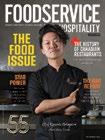
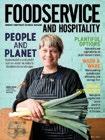
500-1255 Lebourgneuf Blvd., Quebec City, QC G2K 0M6
COO of Casual Dining: Marie-Line Beauchamp
History, Plans
- established in 2002
- first Yuzi franchise in 2007
- Yuzi Sushi Express at IGA Supermarkets created 2016
Franchise Costs
storefront
- franchise fee: $35,000
- project cost: $325,000
- royalties: 6%
- advertising fee: 3%
grocery store counter
- franchise fee: $17,000
- project cost: $50,000
- royalties: 5%
- advertising fee: 2%

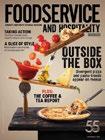
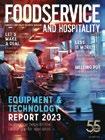


Services
- advertising/marketing
- construction and equipment
- design & drawings
- lease negotiation
- ongoing management support
- purchasing
- site location
- supplies

DON’T SEE YOUR COMPANY INCLUDED IN THIS YEAR’S FRANCHISE REPORT?
Email: abostock@kostuchmedia.com to make sure you’re included in the 2025 edition

“We were told that coming out of the pandemic everyone would be eager to come back [to restaurants],” says Shira Blustein, general manager of both The Acorn and The Arbor in Vancouver. “But what happened was rising prices from our suppliers, starting with fuel surcharges, and then all of our food costs, insurance, minimum wage — everything went
up. The guest is only willing to pay so much.”
“All the issues we’re dealing with now flow from the pandemic,” says Mark von Schellwitz, vice-president Western Canada, Restaurants Canada. Overall, input costs have increased by about 20 per cent, he says, contrasted by menu inflation of only around six per cent — “because we can’t pass all those costs onto our consumers.”
Restaurants continue to feel the effects of
the workplace shift to home-based industry and the enduring pivot from on-premise dining to takeout and delivery. Before the pandemic, about 12 per cent of the average full-service restaurant’s sales were in takeout and delivery; now it’s 38 per cent.
Then there’s the demographic labour crunch. “We lost a lot of jobs during the pandemic and we’re having difficulty attracting them back,” says von Schellwitz,

adding restaurants — the largest employer of youth of any industry — must be proactive in finding good people, working with foreign workers, and encouraging semi-retirees to stay longer or join the workforce part time.
He believes this combination explains why more than half of Restaurant Canada’s members are not making a profit (compared to just 12 per cent before the pandemic) and why restaurant bankruptcies jumped by 90 per cent last year over 2022.
“There’s more government [involvement] now in our industry overall than there was five or six years ago,” BC Restaurant and Foodservices Association CEO Ian Tostenson says, and points to his government’s threat to move to electricity — a problem given West Coast restaurants’ reliance on natural gas — and the lack of CEBA loan extensions, which saw restaurants scrambling to pay back $40,000 to qualify for the $20,000 grant. “A lot of smaller restaurants won’t survive that.”
The provincial governments, meanwhile, have piled on increases in sick days, hikes in minimum wage, and a new statutory holiday, along with new legislation on single-use items and reduction of plastic. And at the municipal level, taxes on leases have increased to the point where “a lot of small restaurants just can’t afford to renew,” says von Schellwitz. “We’ve got a perfect post-pandemic storm.
The quick-service segment has always been strong, observers agree, and the pandemic stretch augmented that. But the middle of the Western-Canadian foodservice market — family-style, upscale casual restaurants — are poised to suffer most, because, says von Schellwitz, “they have the most price-sensitive consumers. If you’re a high-end restaurant with a pretty wealthy clientele, you’re not going to be impacted because it won’t change your consumers’ behaviour if prices go up.”
People are still willing to spend for special occasions at high-end restaurants, Blustein agrees. “But with the more casual eatery, there are just fewer people coming on the regular.”
The fine-dining restaurant in Cody Allmin’s portfolio, Published On Main, in Vancouver, is doing better than the rest, Allmin confirms, because it’s a “celebratory destination. The people that only dine out once or twice a year
fill out a big chunk of our books.”
But Circana’s CREST industry tracking database shows that, for the year ending November 2023, while FSR had a much higher share of traffic in B.C. (28 per cent) than anywhere else in Canada, “it could present a challenge in the coming year if the economic headwinds impact the foodservice industry as they’re expected to,” says Vince Sgabellone, a foodservice industry analyst with Circana. “One of the ways consumers are planning to cut back on foodservice spending will be to trade down to less expensive restaurant occasions.”
Chains, meanwhile, have the advantage of economics and purchasing power, Tostenson says, and with the current economic uncertainty, people tend to go where they’re familiar. More than that, chains can be “more adventurous” in their pricing, where independents have higher cost structures and infrastructures that aren’t as deep. “You’ve got to be way more on top of your costs and operations now because of inflation,” he says. “There’s no room for error. A lot of independents are working six days a week, 12 hours a day.
“We’ve never stabilized since the pandemic,” he says. While patrons have returned, inflation has been quick to yank back progress. “We’ve been unable as an industry to increase our prices to cover inflation, so restaurants either have no margin or are losing money.”
Allmin, whose four-year-old fine-dining restaurant has a Michelin star, calls the restaurant business in Western Canada “challenging” right now. “When your operating costs are already high because it’s Vancouver and then your labour rates and cost of goods go up and you try to match your prices to be in line with inflation, but nobody has the money to spend more, you get complaints from every side.”
He calls the future for restaurants in this part of the country “fairly bleak” and explains that they’ve put a pause on growth for the next year while they “watch the economy.”
Allmin’s contemporary, Angus An, the chef-owner of a handful of restaurants in Vancouver, including Michelin Guide-
recommended Maeman, concedes “there are more challenges than ever for restaurants.” But he’s keeping his cool, he says, informed by how the 2008 recession prepared him for the COVID experience. He feels consumers are craving quality, but also value. “People need to eat and as long as you provide them with value, you have the ability to thrive.
“We’ve got to start competing with quality. We can’t pay the higher wages that some of these talented personnel deserve and by competing with price, the only thing that suffers is quality. Rather than compete on price, compete on value.”
Bruce Fox, executive vice-president, Business Development with Browns Restaurant Group, says business is “tougher than it’s ever been and I’ve been in the business 50 years.” New build costs are up 30 per cent from two years ago, he says, and “We can’t build new restaurants under those conditions. And we can’t staff them.” None of that means they’re not trying, he points out.
While almost all of the restaurants in his system are making money, it’s “not much,” he qualifies. “The scene is worse than it’s ever been.”
“We’re going to see a lot more restaurants closing,” Blustein agrees. We need that rebound where people feel freer, where they have more expendable income.”
Going forward, Tostenson agrees Western Canada is facing a culling of the industry. He believes up to 2,000 restaurants across the B.C. are at risk of closing this spring unless a “miracle” comes their way.
But from that scene will rise a re-generation. Tostenson points to a recent rush of investment and innovation. “The era of the big restaurants with hundreds of seats, thousands of square feet, and high-cost operations is over. But people are coming in with more focused concepts, more diversity and ethnicity, and smaller restaurants, lower overheads, more technology.”
Indeed, says Fox, there’s reason for hope. “We figured out how to deal with no-smoking sections. We’ll figure it out. It’s depressing, but restaurant people are smart, capable, energetic, vibrant, innovative. We love what we do and we’re in there for the next round to keep fighting.” FH


lthough challenging, the last few years have brought about some exciting and innovative new concepts to the world of dining out.
When B.C.-based Joseph Richard Group (JRG) established Meal Ticket Brands, there was a lot of learning to be done about this new world of virtual restaurant concepts and how it would all play out. With a few years under its belt, we’re diving into the key elements that have driven Meal Ticket Brands’ success in this new market and the lessons we’ve learned along the way.
Portfolio of brands/concepts: One of the key factors driving success in the virtual brand restaurant industry is the strategic development of a portfolio of brands and concepts. Aligning the right brands and concepts with restaurants can streamline the launch process. This approach offers numerous advantages, such as staff familiarity with products, minimized training requirements, and tighter control over the cost of goods (COGs).
Additionally, having multiple compatible concepts allows for easy expansion. New brands can be introduced with minimal hassle if the restaurant partner can handle
more orders. For instance, designing new brands with compatibility in mind, such as SKUs for JRG’s Mac & Cheese brands being compatible with Grilled Cheese brands, allows for a dramatically differentiated product range. This flexibility enables restaurant partners to launch with one or more brands and subsequently add compatible brands, generating incremental revenue.
Teamwork makes the dream work: Let’s face it, running your own business is tough enough, but the idea of adding additional brands can be overwhelming. However, the power of collaboration is undeniable. Success stories from Meal Ticket Brands’ stores from B.C. to Ontario and beyond demonstrate
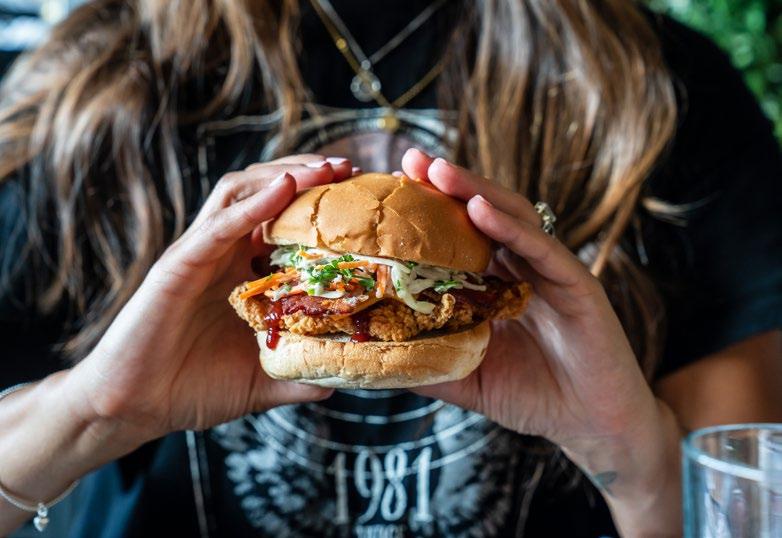
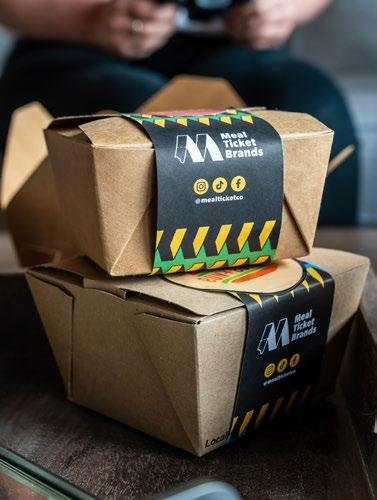
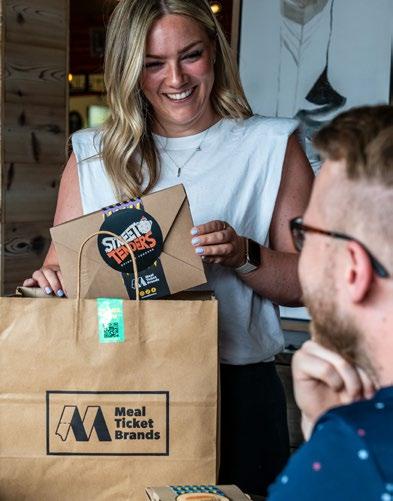
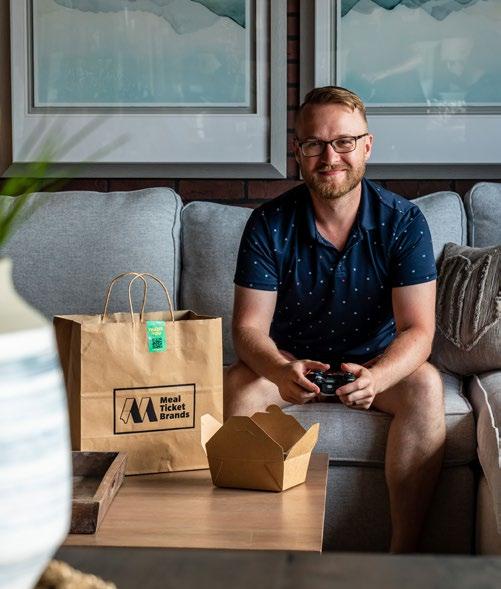
that teamwork and a proven formula can lead to success. Companies offering virtual brand solutions have developed onboarding, training, support, marketing, and account management to work closely with restaurant partners, ensuring their success.
Show me the money: The ultimate measure of success in the restaurant industry is profitability. Many restaurant partners are making money and increasing their profits by adding virtual brands or concepts. This success testifies to the positive impact of virtual brands on the industry. Companies in this space continually assess COGs, market pricing, and promotional strategies to ensure their partners remain profitable and busy.
Menu differentiation in third-party delivery: One of the lessons learned in the virtual brand restaurant industry is the importance of menu differentiation in third-party delivery
services such as SkipTheDishes, DoorDash and Uber Eats. Restaurants cannot simply copy and paste menus from their existing establishments. Each menu must be unique to provide a distinctive dining experience. This requirement underscores the importance of menu design and restaurant efficiency.
Substance over sizzle: The industry has witnessed the rise and fall of celebrity brand partnerships. Rapid and widespread growth, low barriers to entry for restaurant partners, and inadequate quality control contributed to the downfall of some celebrity brand collaborations. While celebrity branding creates initial buzz, the execution of menus must meet customer expectations. The lesson here is to focus on delivering a great product and scale based on the ability to service customers and partners consistently. Look for underserved concepts that will enable your brand/ product to stand out.
People, process and technology: Success in the virtual brand restaurant industry relies on a harmonious blend of people, processes, and technology.
• People: Restaurant ownership and teams must fully embrace the value and impact of adding virtual brands. Without buy-in, confidence, and a focus on delivering a great brand and product, success is challenging to achieve.
• Process: Developing menus that align with the existing processes and ingredients of the restaurant is essential. Detailed documentation, including order guides, build guides, videos, and printed instructions, along with packaging guidelines and troubleshooting resources, helps the team bring the menus to life.
• Technology: Employing a tech stack of tools for training is critical, as training staff is an ongoing process. A portal with video, PDFs, and other tools can differentiate a business and support long-term goals. Another critical component is order aggregation, which allows your brand to live on multiple platforms (e.g., Skip SkipTheDishes, DoorDash, and Uber Eats) without requiring a separate tablet for each, streamlining order management.
Partner with “skin in the game”: While it is possible to go it alone in the virtual brand restaurant industry, partnering with restaurants with “skin in the game” can accelerate the path to profitability with lower risk. These partnerships are often based on performance, where the restaurant only gets paid when orders come in. In such partnerships, restaurants receive full support and can focus on execution rather than dealing with the training, promotion, and management of virtual brands.
The virtual brand restaurant industry is an exciting and promising field where creativity, adaptability, and collaboration are keys to success. By leveraging the valuable insights and strategies shared in this article, restaurant owners and entrepreneurs can navigate the brand-new territory of virtual brands and establish thriving businesses. The road to success is open for those who embrace innovation and are willing to adapt, especially in challenging times. FH Jason

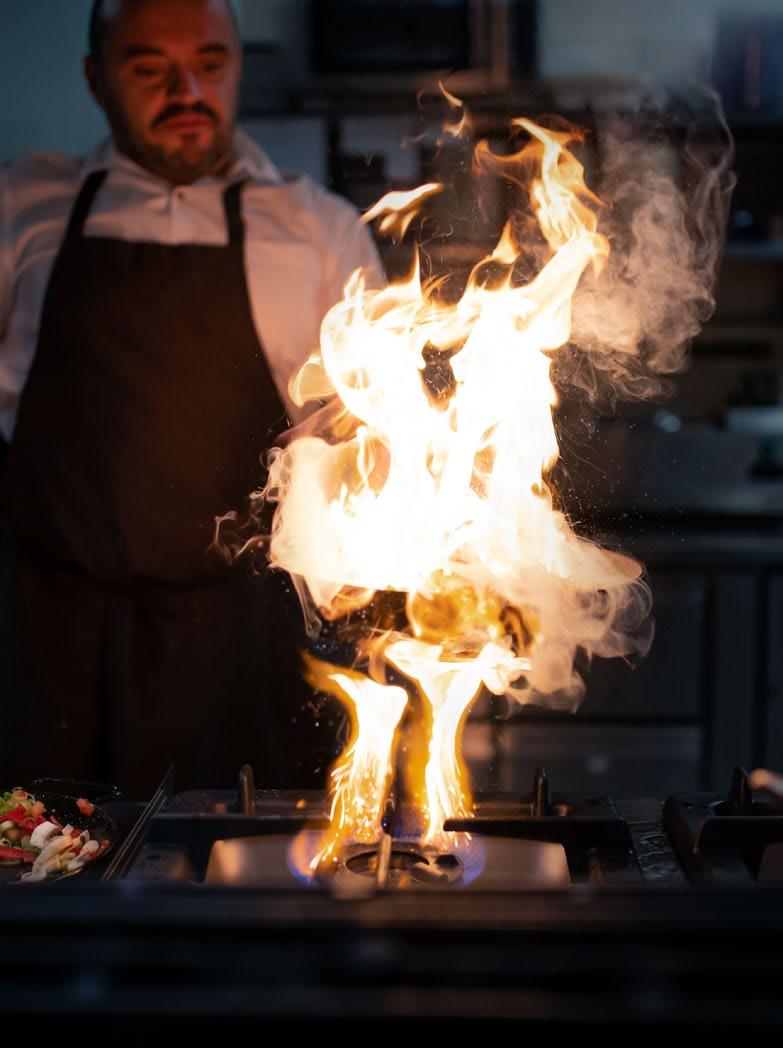 BY NICOLE DI TOMASSO
BY NICOLE DI TOMASSO
In the heart of every professional kitchen lies a culinary workhorse that has undergone a transformative evolution — the commercial oven. Once a humble appliance confined to baking and roasting, today’s commercial ovens are multi-functional marvels that cater to the diverse needs of chefs and restaurateurs.
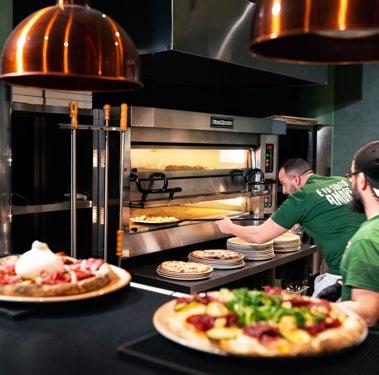
Recently, Oakville, Ont.-based GBS Foodservice Equipment Inc. entered a distribution agreement for the Canadian market with PizzaMaster, providing foodservice and retailgrocery professionals with access to the largest range of electric deck ovens in the world. With its manufacturing facility in Borås, Sweden, PizzaMaster offers 85 models with 120 configurations. The ovens are equipped with either traditional clay hearth stones or artisan stones.
and more efficiently is a unique selling feature.”
In Toronto alone, 2023 proved to be a landmark year with a number of new pizza concepts popping up across the city, including NewYork based Prince Street Pizza, which marked its first-ever location in Canada, Oswald’s Pizza, Afro’s Pizza, Diavola Pizza and more.
“Pizza is popular — it’s simply the nature of the category,” says Douglas.“Providing an appliance that lets restaurateurs create their own signature style of pizza, whether it’s Neapolitan, New York, Chicago or Roman-style, makes for more creative, nuanced offerings.”
Foodservice customers in the Greater Toronto Area (GTA) currently using PizzaMaster electric deck ovens include Maker Pizza, Pizzeria Badiali, North of Brooklyn Pizzeria, Liberty Pizzeria, FBI Pizza and more.
Additionally, RATIONAL launched a new autonomous cleaning system for its iCombi Pro tabletop models called iCareSystem AutoDose.
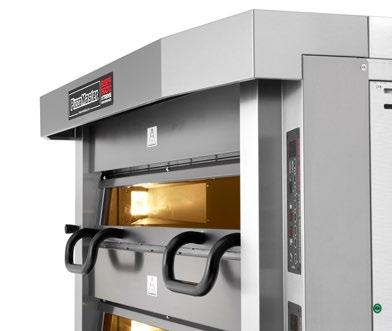
“The most popular electric deck ovens are modular — 700, 800 and 900 series. The difference between the series is the depth of the stone cooking surface (70cm, 80cm and 90cm),” says Vlad Martinov, brand manager, PizzaMaster Canada. “There are two variations, standard temperature and extreme heat,” adding that the extreme heat deck oven, which reaches 500 degrees Celsius, is ideal for Neapolitan-style pizza because its temperature is similar to a woodburning oven.
“Woodburning ovens require ventilation,” says Granett Douglas, VP, Foodservice, GBS Foodservice Equipment Inc. “And, gas ovens can be costly. There’s a big push for electrification in Canada. We’re currently seeing it with electric vehicle sales, so having an electric deck pizza oven that can perform the same as a gas-burning oven
“The self-cleaning feature is one that RATIONAL brought to market many years ago and it’s still a fan favourite,” says Danielle Forget, Marketing director, RATIONAL Canada. “AutoDose has made self-cleaning even easier. With the traditional iCombi Pro, an operator puts tabs in the units and presses a button for cleaning mode. With AutoDose, bottles containing cleaning chemicals needed for several months are inserted into the unit and an operator can program the unit to automatically clean.”
“The iCombi Pro’s care control is selfintelligent,” says Louis-Philippe Audette, president of RATIONAL Canada Inc. “Depending on what has been cooked, the unit will suggest whether it requires a light, medium or strong cleaning.”
Alto-Shaam introduced its latest innovation in the combi-oven category, Prodigi, in 2023
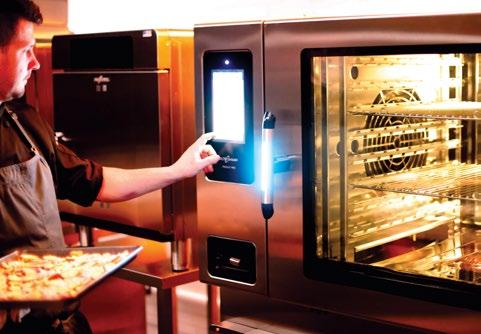
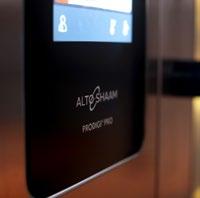
at the NAFEM Show. Joe Levesque, corporate chef at Alto-Shaam Canada says the new combis feature boilerless technology, zero-clearance design and ChefLinc remote-oven management to create, manage and distribute recipes to ovens through the cloud.
Offered in two versions, the Prodigi Pro and Prodigi Classic, Levesque says the Prodigi Classic is available at a lower price point and has replaced the company’s CTC Combi, adding that it’s more suitable for restaurants with basic menus.
In 2022, Alto-Shaam first debuted its new Converge Multi-Cook Combi Ovens at the NRA Show. With up to three combis in one, Levesque says the ovens feature boilerless technology, Structured Air Technology and ChefLinc remote-oven management, allowing operators to steam, bake, grill and air-fry food items at the exact same time, in the same oven, without flavour transfer for expanded menu potential.
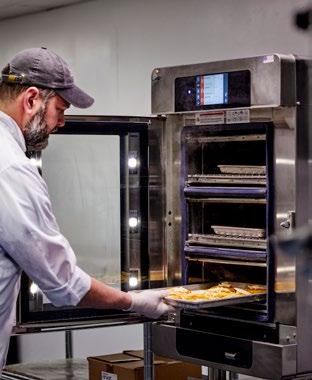
Similarly, Alto-Shaam’s Vector Multi-Cook Ovens, available in countertop or full-size models, can increase food production while minimizing operating costs. The ovens are waterless and countertop
models are ventless, allowing operators to prepare food items in any space. Levesque says the H4 Multi-Cook Vector Oven is 21 inches and ideal for tight spaces and its design eliminates the need for an exhaust hood.
A rise in the adoption of combi ovens by restaurants, hotels and catering businesses has replaced the need for a traditional convection oven. More broadly, Audette says single-purpose equipment, such as steamers and tilt skillets, aren’t worth the investment for most operators.
“RATIONAL’s iCombi Pro and the iVarioPro replace a convection oven, a steamer, a high-speed oven, boiler and more,” says Forget. “Together, these pieces of equipment can replace up to 95 per cent of kitchen equipment.”
Forget continues, “Hood space is expensive, and operators are starting to re-think investing in large pieces of equipment that only do one thing. Many have already moved beyond that realm.”
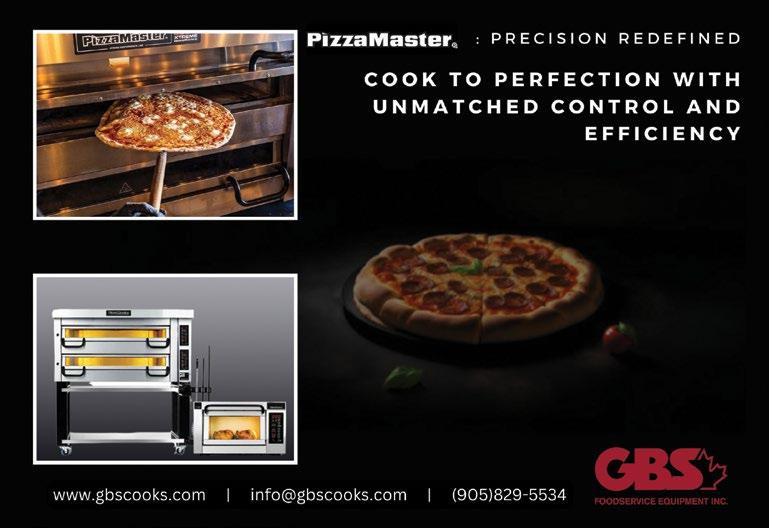
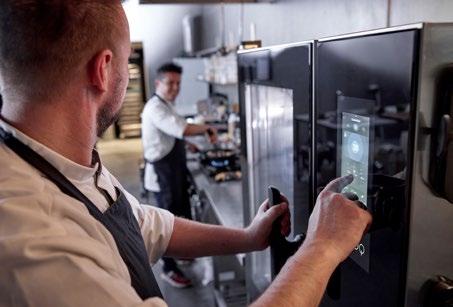
This spring, RATIONAL plans to introduce a new appliance category, which the company says will guarantee the shortest cooking times with the highest food quality due to intelligent and adaptive control of microwave technology. More details will be revealed closer to the launch.
Additionally, Dan Frenette, territory manager and corporate chef at W.D. Colledge Co. Ltd. anticipates that Blodgett’s new combi oven, Invoq, “will take the industry by storm. The easy-to-use interface, expanding capacity and significant energy savings makes this oven a true contender to be the latest and greatest in the combi world.”


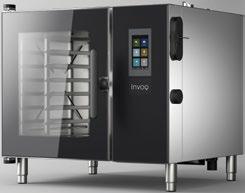
“The Invoq oven’s HybridSteam technology is a game-changer in the combi oven landscape,” says Rasmus Vingaard Larsen, president, HOUNO, a company that The Middleby Corporation acquired in 2006. “By seamlessly integrating direct steam injection and boiler-generated steam, it not only speeds up the cooking process but also ensures a consistent and precise steam environment. The lambda sensor optimization adds another layer of efficiency, reducing water and energy consumption without compromising on performance.”
Larsen continues, “The Invoq oven re-defines versatility with the ingenious MultiRack inserts, offering unparalleled flexibility in operation. By accommodating different tray sizes simultaneously, including half size, full-size sheet pans and hotel pans, it maximizes throughput in a compact footprint. The extra rack capacity boosts efficiency by up to 20 per cent, proving that Invoq is not just a cooking appliance — it’s a space-saving, energy-efficient powerhouse designed to meet the diverse needs of the culinary world.” FH

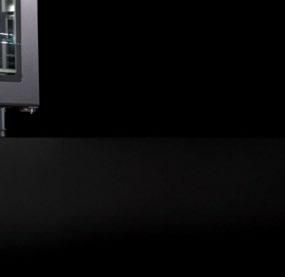

Empower your kitchen with unrivaled support and connectivity. Prodigi combis set your employees and business up for success with a customizable, Wi-Fi-enabled control that eliminates guesswork, manual cleaning and more.

Experience it at RC Show Booth #2619
April 8-10 | Toronto




ncreased consumer awareness and a desire to explore and make more informed decisions are driving today’s wine trends.
The preferences of younger consumers are shaping the industry landscape. “Younger consumers are looking for wines slightly lower in alcohol and with less sugar,” says Magdalena Kaiser, director of Public Relations – Marketing & Tourism, Wine Growers Canada, adding “Ontario’s cool climate produces wines full in flavour but lighter than those from much warmer climates, [such as] Riesling, Chardonnay, Gamay Noir, Cabernet Frant and Pinot Noir. They’re especially food-friendly.”
The spotlight is now on affordable sparkling options as consumers have started to recognize sparkling wines as a gastronomic experience while mineral-driven wines have garnered, attention due to their refreshing profile and drinkability.
“The majority of consumers drink red wine, but we’re starting to see more esoteric regions
and grape types gain popularity,” says Bernard Joseph Lemoyne, general manager and head sommelier at Atelier Restaurant in Ottawa. “Consumers are starting to explore alternate regions such as Sicily and we’re starting to see wines from Mt. Etna coming through.”
Wine trends indicate cyclical shifts between light, low-and-no alcohol and full-bodied styles. Specifically, the increasing popularity of non-alcoholic wines indicates a shift in consumer habits driven by the healthconscious consumer.
“We’re seeing regions such as Nova Scotia coming out with lower ABV wines,” says Lemoyne. “One of the non-alcoholic options I’ve seen comes from Germany. They’re doing reverse osmosis to remove alcohol and provide zero-per-cent ABV options.”
“[Currently], light and low ABV wines are more refreshing styles, but [I expect] that will fade and consumers will go back to their full-bodied reds and big oaky whites,” says Lemoyne. “However, there are always little branches off these trends where we start to see new markets emerge.”
Spring and summer bring a shift towards rosé, light reds, lighter whites and sparkling wines. “Sparkling wine is not just for celebrations and the holidays,” says Kaiser. “More people are drinking sparkling wine throughout the year, which is great to see as it’s especially food friendly.”
Approaching wine and food pairings involves a flexible mindset. Whether following the adage if it grows together, it goes together or exploring unconventional choices, the focus should remain on ensuring that the structure of the wine complements the food.
Lemoyne says one of his favourite foodand-wine pairings at Atelier is wild boar belly marinated for 48 hours with a mix of sweet spices, jalapeño and green-apple salsa and Barolo chinato, an aromatized wine infused with herbs and spices, fortified and lightly sweet.
“You want something that will complement one or the other,” says Lemoyne. “You don’t want any one factor to be taken away. You don’t want the food to be shy and you don’t want the wine to be shy. Both need to show.” FH

ATVancouver’s Boulevard Kitchen & Oyster Bar, chef Kenta Takahashi seamlessly combines his French culinary training with his Asian heritage to create a melting pot of exquisite desserts that captivate the senses.
In his role as pastry chef, the Japanese-born chef takes desserts a step further by capturing traditional French fare and adding a sophisticated Japanese twist.
When asked what inspired him on his journey as a pastry chef, Takahashi turns wistful as he reminisces about the rich vanilla pastry cream puff he tried at pastry school. “That flavour and texture contrast changed how I see all food. It was all perfect in just one bite. I saw that cultures and histories are all connected with food and are always a part of people’s lives. I simply like eating food and desserts, but my core motivation and love of food are [rooted in] the background of food cultures.”
Takahashi attended Tsuji Culinary Institute in Osaka, Japan and his career steadily progressed from pastry school and French restaurants in Tokyo to a four-
year tenure at Thierry in Vancouver and subsequently seven years at Boulevard. His flair hasn’t gone unnoticed, and he was crowned Canada’s Best Pastry Chef 2020 by Canada’s 100 Best.
His culinary style is a sweet merger based on classic-style desserts emphasizing a lighter texture, yet with an intensity of flavour. Aromas from flowers, herbs or tea create a unique essence in his desserts.
“Most of the time, the influences and inspirations are not from the outside,” he says. “I find it in basic and classic and then ask myself how I want present it, which texture, taste, flavour, colour, impression I want and then shape all those things.”
Takahashi says the dessert menu at Boulevard caters to a NorthAmerican base and reflects a blend of French classic and modern, such as the Salted Sesame Praline Bar ($17), which was born out of the collaboration with Boulevard’s executive chef Alex Chen.
What do you cook at home?
“Asian-style cuisine; I reserve dessertmaking for special requests from my kids.”
If you weren’t a chef, what would you be?
“I have no Idea but I can’t imagine working in an office everyday. But if I had to change careers, I would be a photographer.”
What is your favourite ingredient to cook with?
“Tea, especially Earl Grey and Jasmine.”
When asked about his greatest accomplishment, Takahashi nudges the conversation towards the growth of his team and says its progress is his proudest achievement. “I spend a lot of time teaching and training my staff directly, explaining why I made this dessert, how I get ideas, how to create, how to work. I let my staff create their own dessert and encourage them to create their own recipe instead of taking a recipe from someone and just using it. They learn the basics; they learn how to use it properly and then I see them create good desserts. Some of them find great opportunities to step up their own careers and become chefs, create their own desserts and grow.”
Looking to the future, Takahashi envisions more collaborations with people both in and beyond the food industry, and he aims to extend opportunities to share culinary experiences. Additionally, he has plans to open a pastry shop beside the Boulevard and highlights his initiative of the Dessert Tasting Dinner with all five courses dedicated to desserts. FH
Check out the Table Talk podcast to listen to conversations between Foodservice and Hospitality’s editor and publisher Rosanna Caira and industry leaders speaking about the issues impacting the dynamic foodservice industry.










E72. A LABOUR OF LOVE JONATHAN GUSHUE CHEF & PARTNER GUSHUE BELANGER HOSPITALITY SERVICES
JENNIFER BELANGER PARTNER
GUSHUE BELANGER HOSPITALITY SERVICES
E71. A PASSION FOR HUMANITY MEERU DHALWALA CO-OWNER AND CHEF VIJ'S RESTAURANT
E70. FROM SICILY WITH LOVE JACQUELINE NICOSIA CEO ROBERTO MAROTTA CHEF CO-FOUNDERS AND CO-OWNERS ARDO RESTAURANT | DOVA AND VIVI IMPORTS



E69. SETTING A NEW STANDARD KRIS HALL FOUNDER BURNT CHEF PROJECT
IMRUN TEXEIRA CHEF & AMBASSADOR BURNT CHEF PROJECT
TABLE TALK podcast episodes are available at https://www.foodserviceandhospitality.com/category/media/podcast/ or find them on and


